Youth Ministry Lesson Plans and Reflections
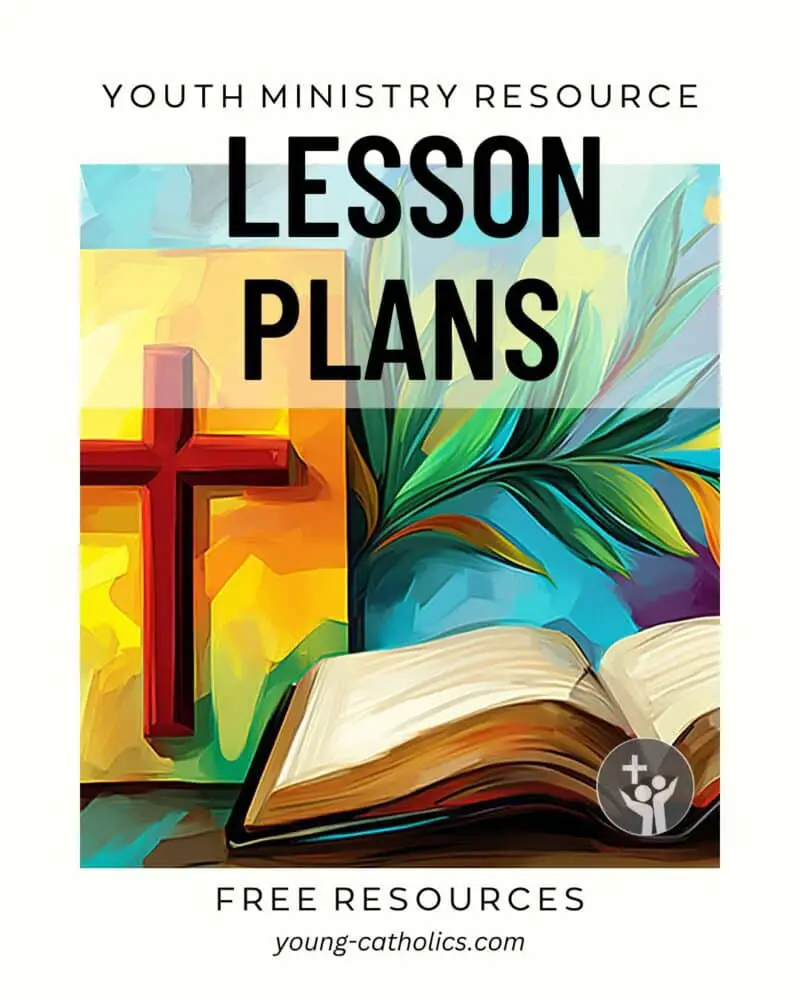
Youth ministry is about helping young people grow closer to God.
These free lesson plans are made to help leaders guide youth in faith. They are simple to use and focus on prayer, Scripture, and real-life application. Each lesson encourages youth to think about how to live their faith every day.
These resources give leaders tools for creating a welcoming and prayerful environment. They help youth learn, share, and take action in their daily lives.
Whether through prayer, service, or simple acts of kindness, these lessons help young people follow Jesus and build God’s Kingdom here and now.
These are the general categories, or just browse the full list below.
Jesus Teaches Us

Blessings and Woes (Beatitudes in Luke)
This lesson plan, based on Luke 6:17, 20–26, helps youth understand what it means to be truly blessed. It shows that blessings often come in hard times, like when we are poor, hungry, or sad. Jesus also gives warnings to those who are rich, full, or praised, reminding us not to rely too much on comfort or success. The lesson teaches that real joy comes from trusting God and caring for others, not from wealth or popularity.
Through games, discussion, and prayer, youth are invited to reflect on what really matters in life. They learn that God is close to those who struggle and that we are called to help others with kindness and humility. The lesson helps young people see how Jesus’ words guide us to live in a way that builds God’s Kingdom now. It also encourages them to share their blessings and look for ways to grow closer to God each day.
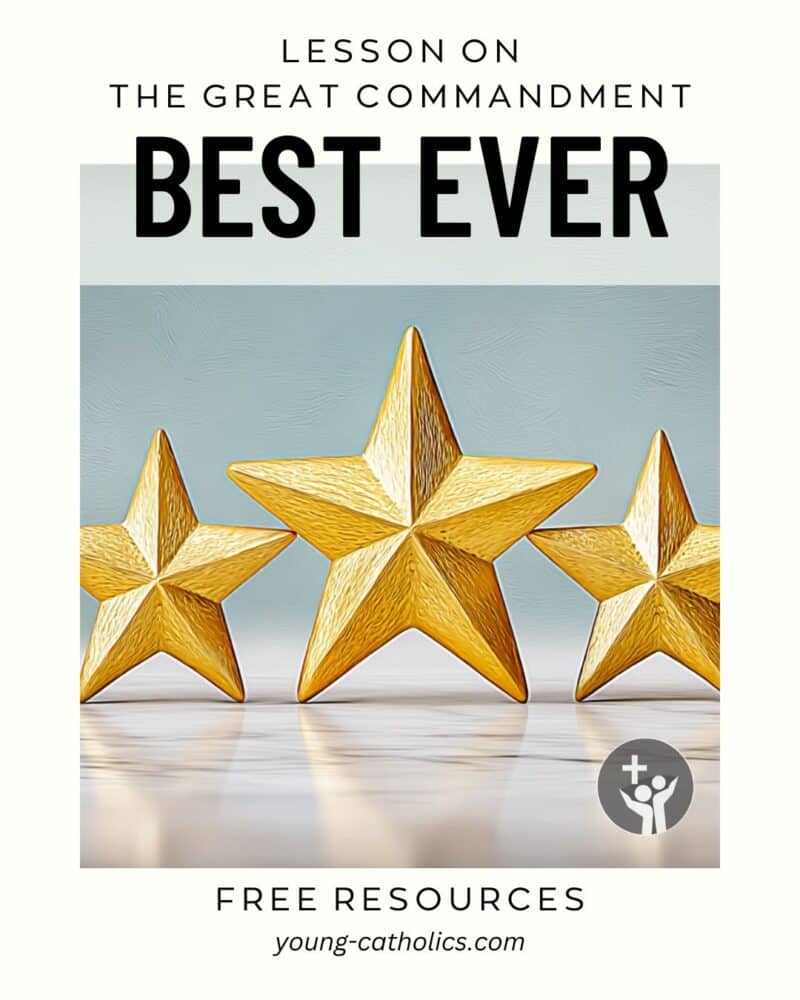
Best Ever (The Great Commandment)
This lesson, based on Mark 12:28B-34, teaches youth about the Great Commandment: to love God and love others. It helps them see that these two commandments are the heart of their faith. All other rules and actions should come from this love. The lesson uses discussion, activities, and prayer to help youth connect these ideas to their daily lives.
Youth learn that rules are not just chores or demands. Instead, they are ways to grow in love and faith. By thinking about how each rule helps them love better, youth begin to see their faith as something active and meaningful. This lesson helps them understand that living with love leads them closer to God and helps build strong, caring relationships with others.
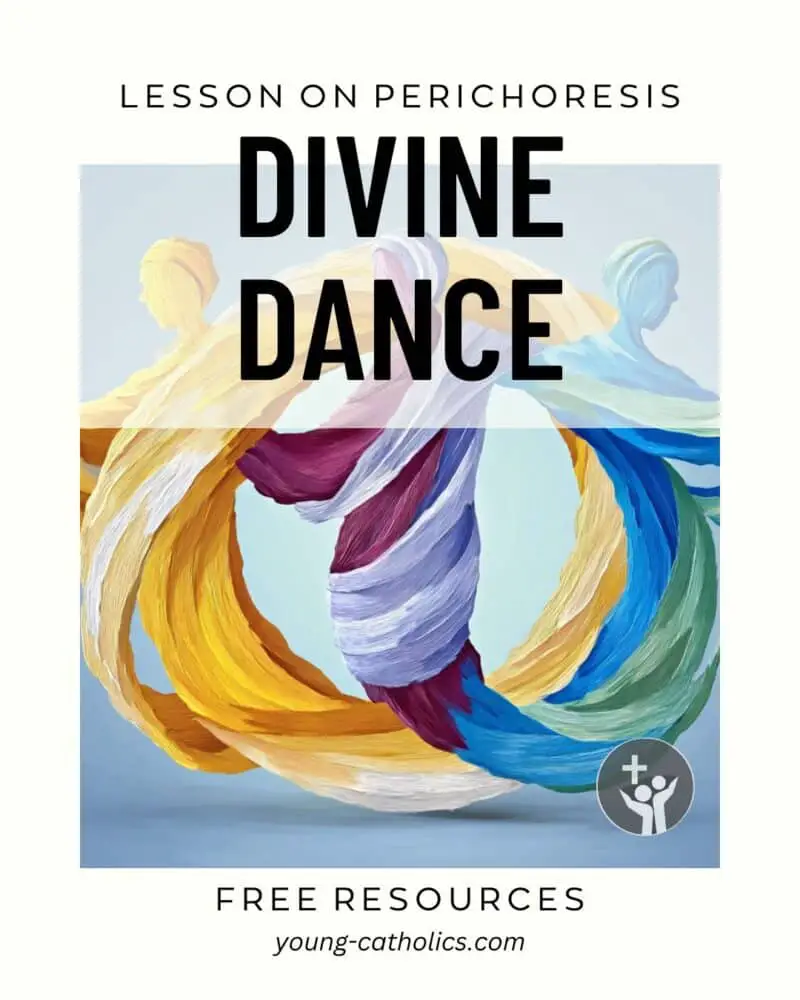
The Divine Dance of the Trinity (Perichoresis)
The divine dance lesson plan helps youth understand the Trinity as a living relationship of love between the Father, Son, and Holy Spirit. Using John 16:12-15, it shows how God invites us into this dynamic relationship. Youth will explore how to listen to the Spirit, follow Jesus, and share God’s love with others.
This lesson helps them see their faith as active and relational, not just a set of rules, and encourages them to live in harmony with God and others.
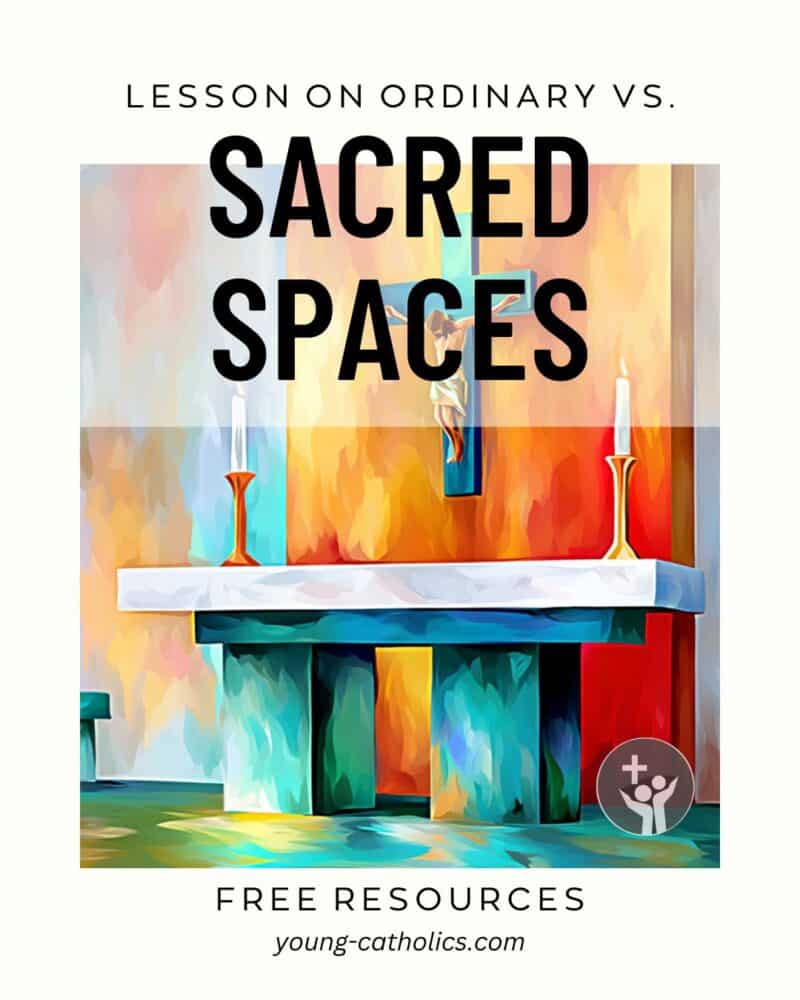
Sacred vs. Ordinary Spaces
The Sacred vs. Ordinary Spaces lesson plan helps youth understand the difference between holy places and everyday spaces. It teaches them that churches are special because God is present there, especially in the Eucharist. The lesson is based on John 2:13-22, when Jesus cleared the Temple and showed how much He cared about sacred space.
Youth will learn how our actions—like kneeling, genuflecting, and staying quiet—show respect for God’s house. They’ll also see that God can be present in ordinary places when we invite Him in. This lesson helps them live their faith both inside and outside the church.
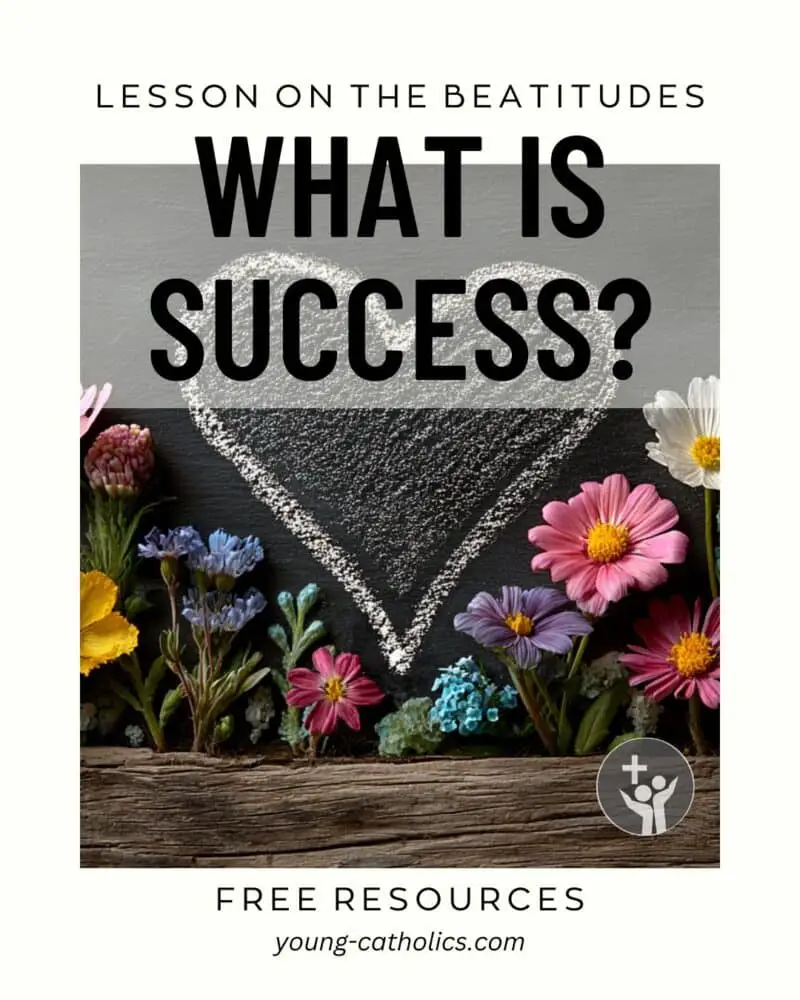
What Jesus Thinks Success Looks Like (Beatitudes in Matthew)
This lesson plan helps youth understand what real success looks like in God’s eyes. It is based on the Beatitudes from Matthew 5:1-12A. The goal is to show that success is not about fame, wealth, or popularity. It is about loving God, helping others, and living with kindness and mercy.
Youth will explore how Jesus teaches a different way to live—one that leads to lasting joy and peace. This lesson gives them a chance to reflect on their choices, grow in faith, and see how to follow Jesus each day. It encourages honest conversation and real action.
My Relationship with God
- A Welcome Sight (Seeing Jesus)
- Fishy Business (Holiness)
- Knight Me! (Christ the King)
- Be Open (Listening to God)
- I Am With You (Holy Spirit)
- Servant’s Heart (Serving God)
- Hello. This is Jesus.
- Grateful
- The Samaritan Woman at the Well
- Who Do You Belong To?
- Emmaus Walk Activity
- Walking with Jesus: The Road to Emmaus
- Where Should We Go? (Following Jesus)
- Rooted in the Vine: Finding Support in Jesus
- What Moves You?
- Slow Down! (Prayer)
- Keep Knocking (Persistence in Prayer)
- Being Known by God (Personal Relationship with Jesus)
- When God Seems Silent
- Seeing Jesus Around Us
- Jesus Is the Fulfillment of the Law and the Prophets
- I Hear My Shepherd (Listening to God)
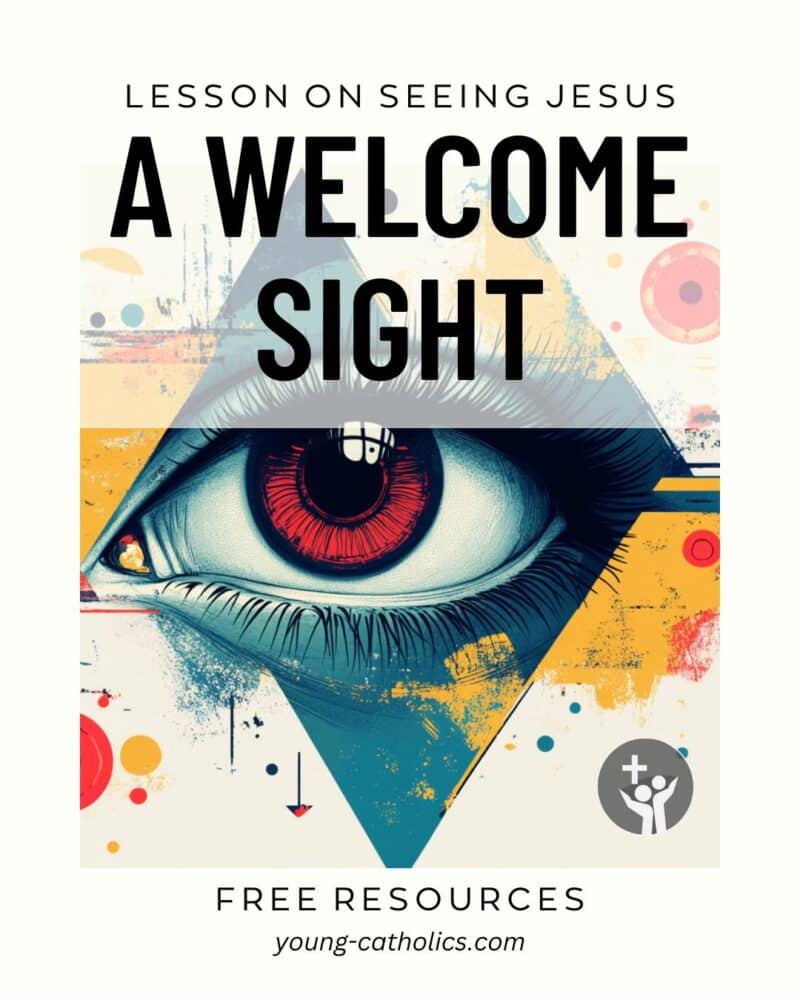
A Welcome Sight (Seeing Jesus)
This lesson, based on Mark 10:46-52, teaches youth about seeing Jesus with the eyes of faith. Using the story of Bartimaeus, a blind man healed by Jesus, the lesson helps youth reflect on their own spiritual blindness. It shows that calling out to Jesus with faith and courage can lead to healing and change.
Youth are encouraged to look at where they might be blind in their lives—whether in relationships, habits, or faith. The lesson invites them to trust Jesus and ask Him to help them see clearly. It teaches that true sight leads to discipleship, just as Bartimaeus followed Jesus after being healed.
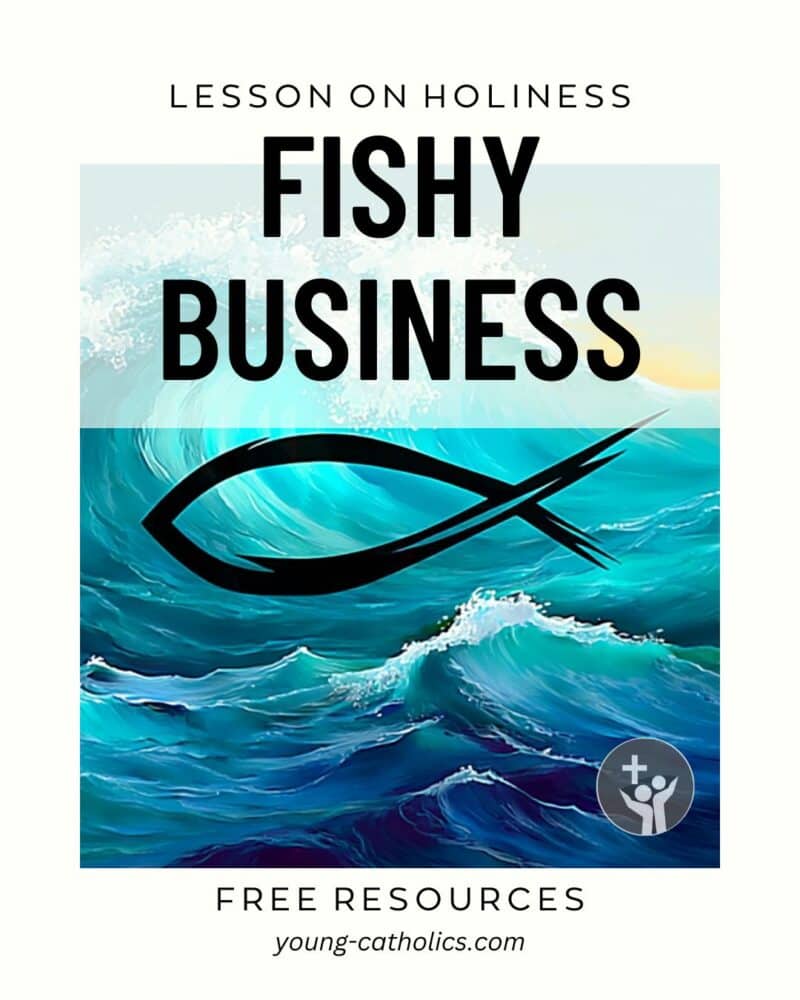
Fishy Business (Holiness)
This lesson on holiness, based on Luke 5:1-11, helps youth understand that God calls everyone to be holy, not just perfect people. Using the story of Peter, a simple fisherman, the lesson shows that holiness starts by saying “yes” to Jesus. Youth learn that being holy means building a relationship with God and trusting Him, even when it’s hard.
The lesson teaches that holiness takes effort and doesn’t happen all at once. Like Peter, we may feel unworthy or unsure, but God still invites us to follow Him. Youth are encouraged to take small steps toward God each day. The lesson reminds them that holiness is not about doing everything right but about letting God work in their lives.

Knight Me! (Christ the King)
The Knight Me lesson plan on Christ the King helps youth understand what it means to serve Jesus as their King. It teaches that Christ’s kingdom is not about power or force but about truth, love, and service. Youth will learn that, like knights in the past, they are called to pledge their loyalty to Christ and live as faithful followers.
This lesson includes scripture reflection, discussion, and activities that help young people apply their faith to daily life. It encourages them to stand for truth, serve others, and stay committed to Jesus. Through prayer and the Sacraments, they will see how Christ strengthens them to live as his knights. This lesson helps youth grow in their faith and see their role in building the Kingdom of God.
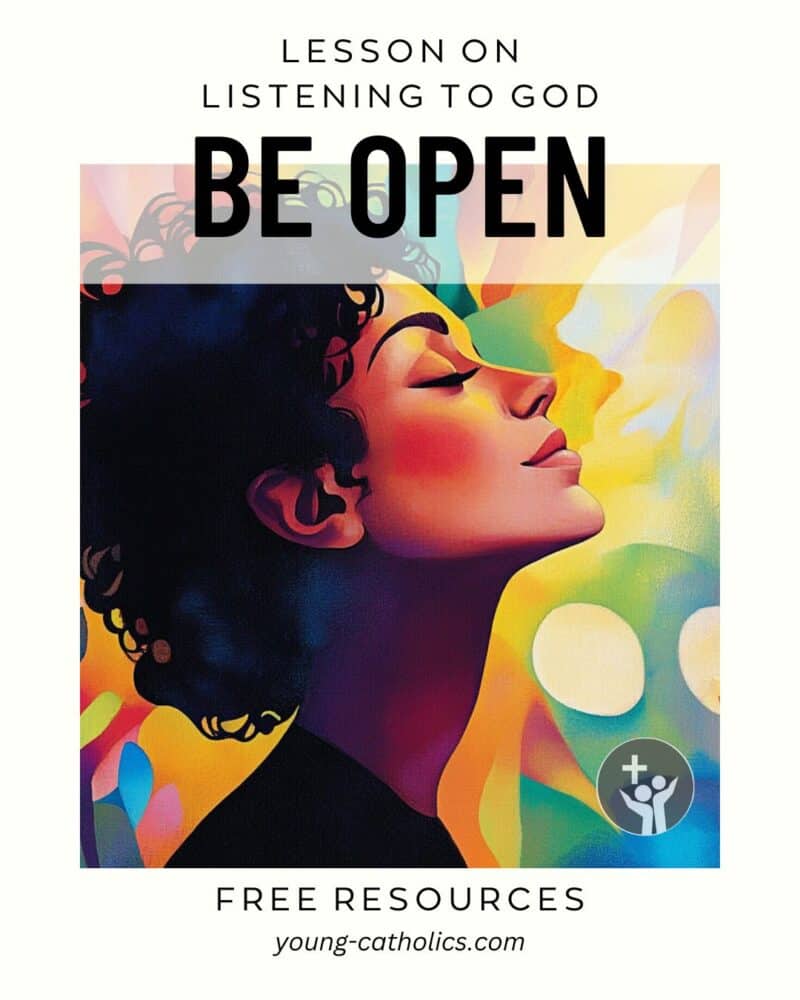
Be Open (Listening to God)
This lesson, based on Mark 7:31-37, helps youth learn how to listen to God. It uses the story of Jesus healing a deaf man to show that God wants to open our ears and hearts to His voice. The lesson teaches that being open to God starts with slowing down and making space to listen.
Youth explore the things that might block them from hearing God, like busyness, distractions, or fear. They also learn how listening to God can help them speak His Word with love and courage. The lesson encourages quiet prayer, reflection, and trust in God’s timing.
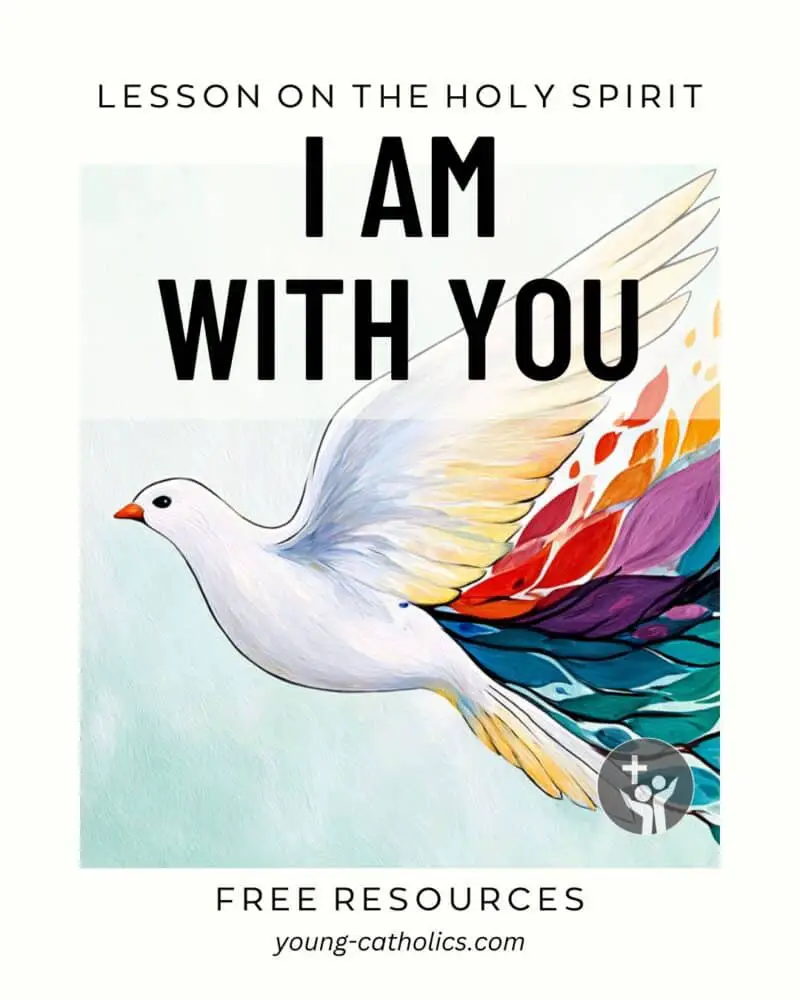
I Am With You (Holy Spirit)
This lesson, based on John 14:23-29, helps youth understand who the Holy Spirit is and how the Spirit works in their lives. Jesus calls the Holy Spirit the Advocate—someone who teaches, reminds, and comforts us. Youth learn that the Holy Spirit is always with them, especially when they feel lost, unsure, or alone.
The lesson shows that the Holy Spirit lives within us, helping us grow in faith, make good choices, and use our gifts to serve others. It encourages youth to pay attention to how the Spirit may be guiding them through quiet thoughts, feelings of peace, or nudges to do good. By staying open to the Spirit, youth can feel more connected to God and live with greater trust and confidence each day.
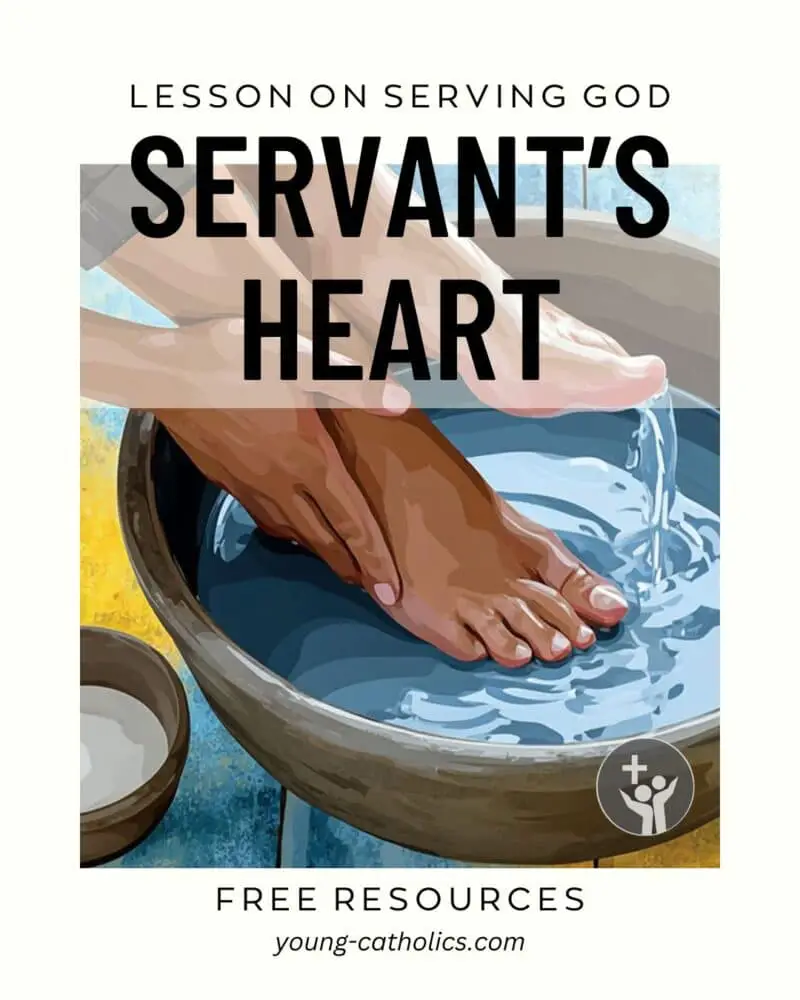
Servant’s Heart (Serving God)
This lesson plan on serving God helps youth understand that faith is about following God’s will, not just asking for things. Using Jesus’ teaching in Luke 17:5-10, this lesson challenges youth to see themselves as God’s servants, not expecting rewards but serving with love and humility.
This lesson encourages youth to reflect on their attitude toward God. Do they seek to serve Him, or do they only pray when they want something? Through scripture, discussion, and activities, they learn that serving God means trusting Him and putting Him first. It helps them grow in faith and build a stronger relationship with God.
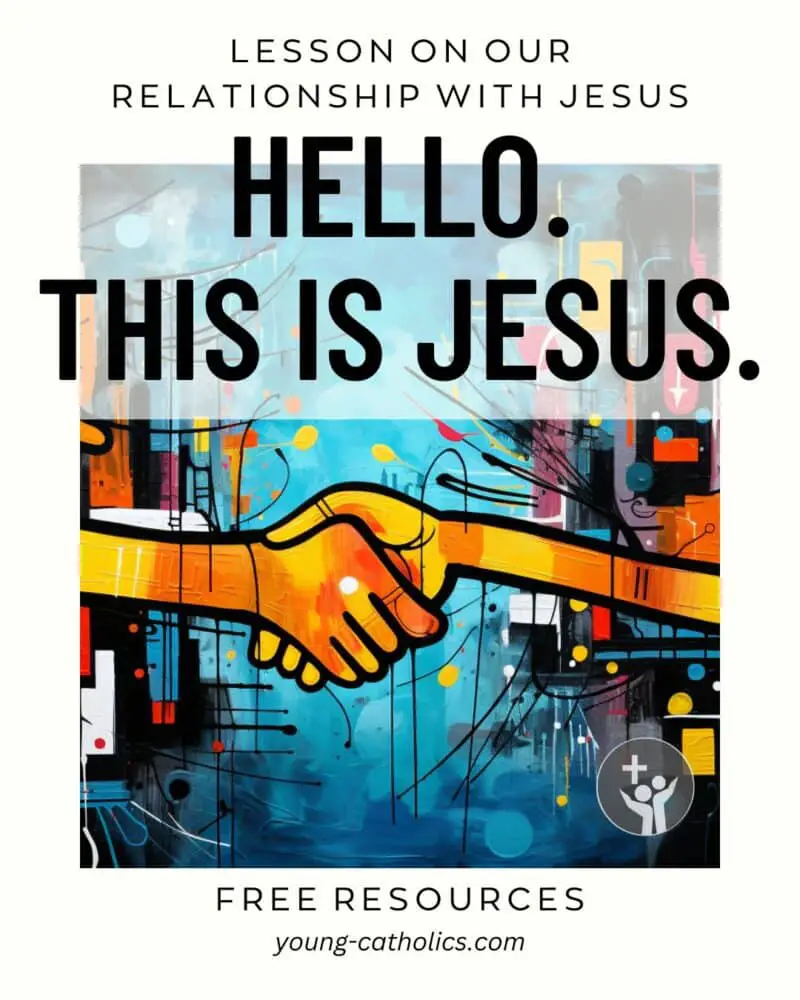
Hello. This is Jesus.
This lesson, based on Matthew 16:13-20, helps youth explore their personal relationship with Jesus. It starts with fun and reflection, asking them to think about how they would introduce Jesus to a friend. Through Peter’s words, “You are the Christ,” youth see what it means to know and follow Jesus.
The lesson teaches that building a strong relationship with Jesus takes time and effort. It invites youth to spend time with Him through prayer and action. They are also challenged to share Jesus with others, using their words and example. This helps them grow in faith and become witnesses of His love.
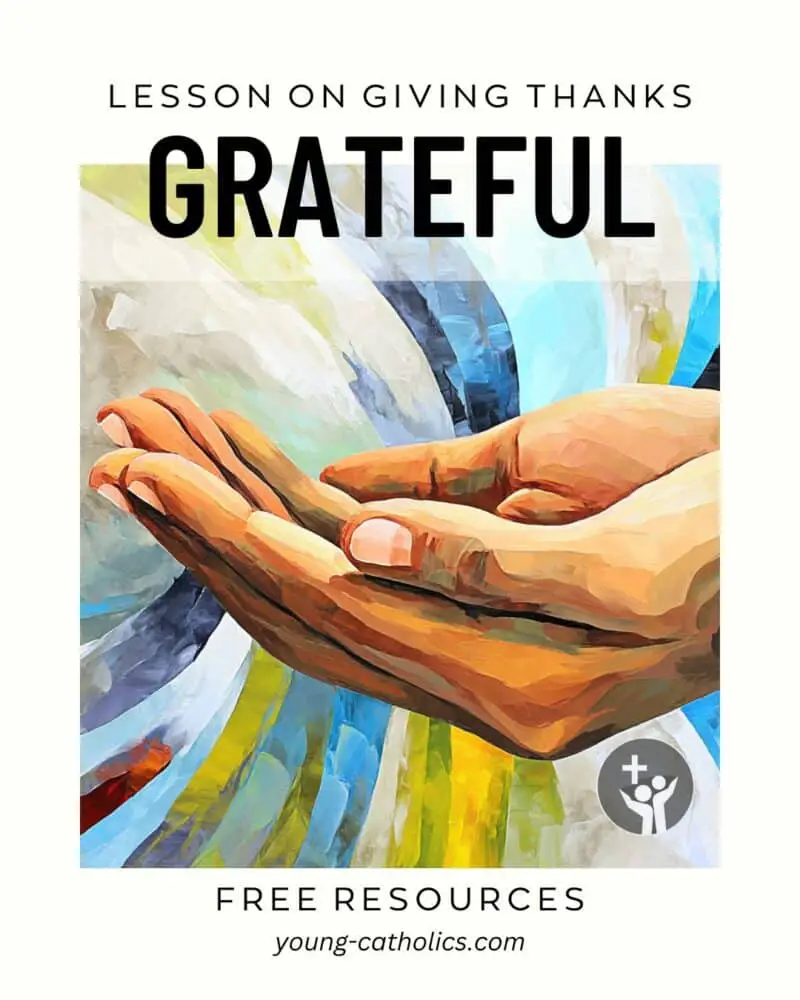
Grateful
The Grateful Lesson Plan, based on Luke 17:11-19, helps youth grow closer to God by learning to say thank you for the blessings in their lives. It uses fun activities, scripture, and prayer to help them see how much God has done for them.
This lesson on the story of the ten lepers encourages youth to notice the good things around them—both big and small. It helps them understand that gratitude is more than being polite. It is a way to live with joy, faith, and love. Youth learn to be more thoughtful, thankful, and kind.
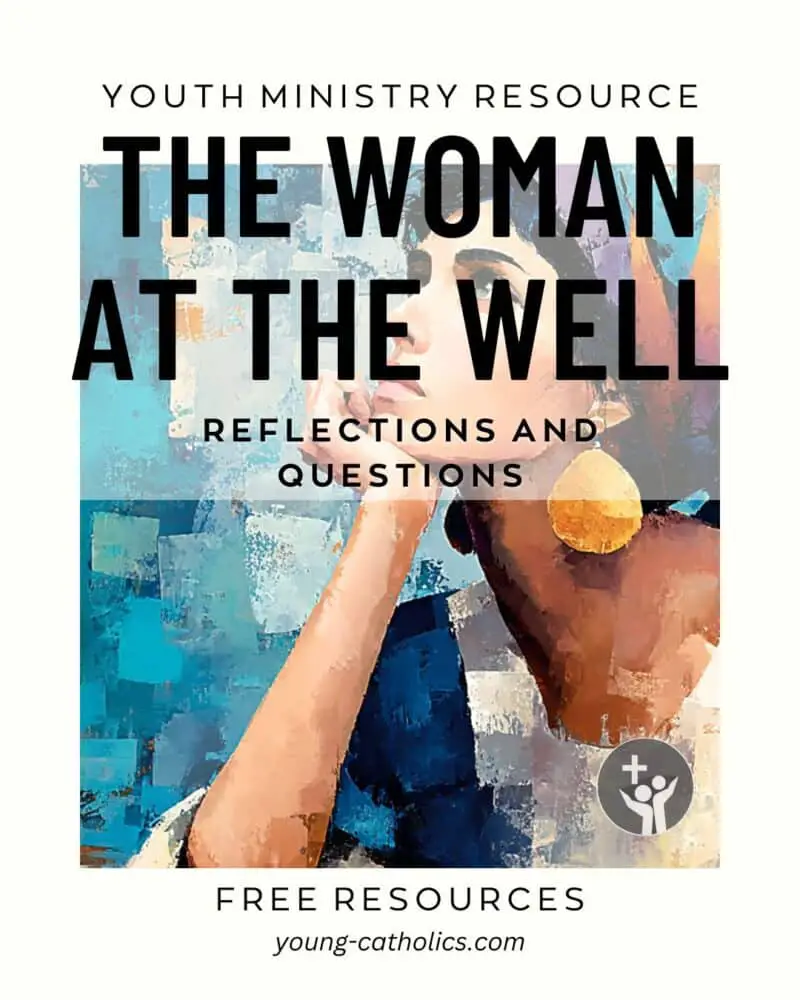
The Samaritan Woman at the Well
These reflections, based on John 4:5-42, help youth reflect on the story of the Samaritan woman at the well. They show how Jesus meets her with love and respect, even though she is seen as an outsider. Youth learn that Jesus knows each of us deeply and offers us “living water”—his love, peace, and lasting joy.
The reflections invite youth to break down social barriers, seek true satisfaction in God, and share their faith with others. Through prayer, discussion, and reflection, they are encouraged to see everyone as loved by God and to talk about Jesus with courage and kindness.
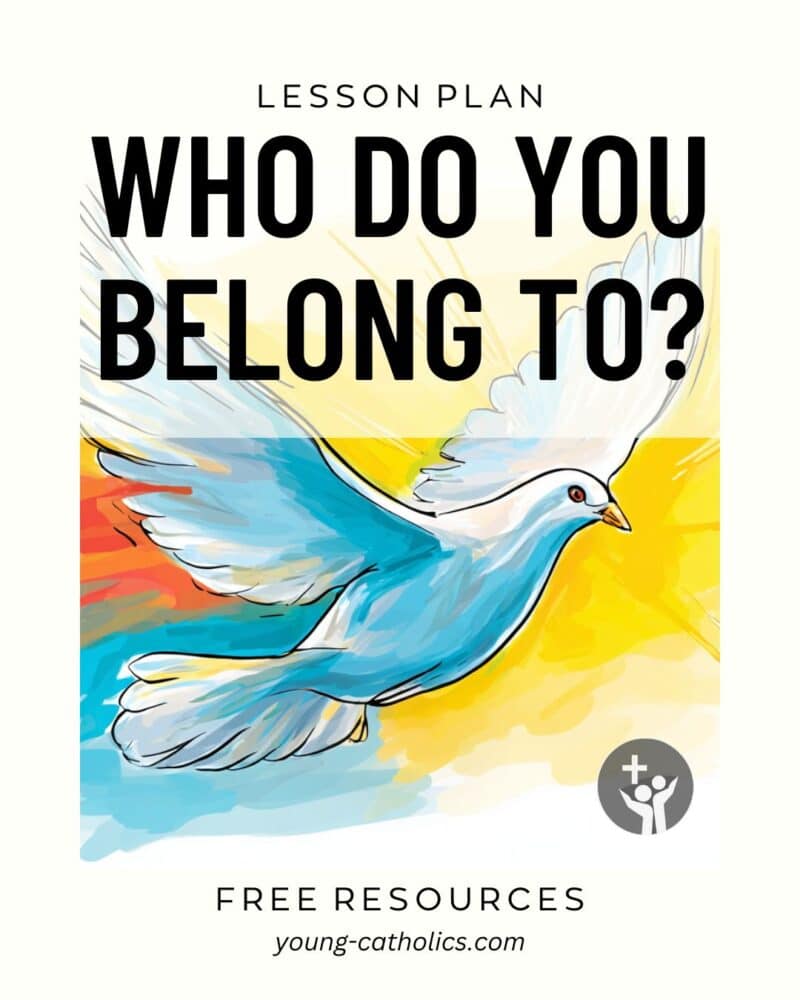
Who Do You Belong To?
This lesson, based on John 17:11B-19, helps youth understand what it means to belong to God’s family. Jesus prays for our safety and unity, showing that we are loved and cared for. The lesson teaches that being part of God’s family brings strength, peace, and a sense of belonging.
Youth also learn that while they live in the world, they are called to live differently. The lesson helps them think about their choices and how to stay close to God. It encourages prayer, reflection, and building strong faith in a community that shares God’s love.
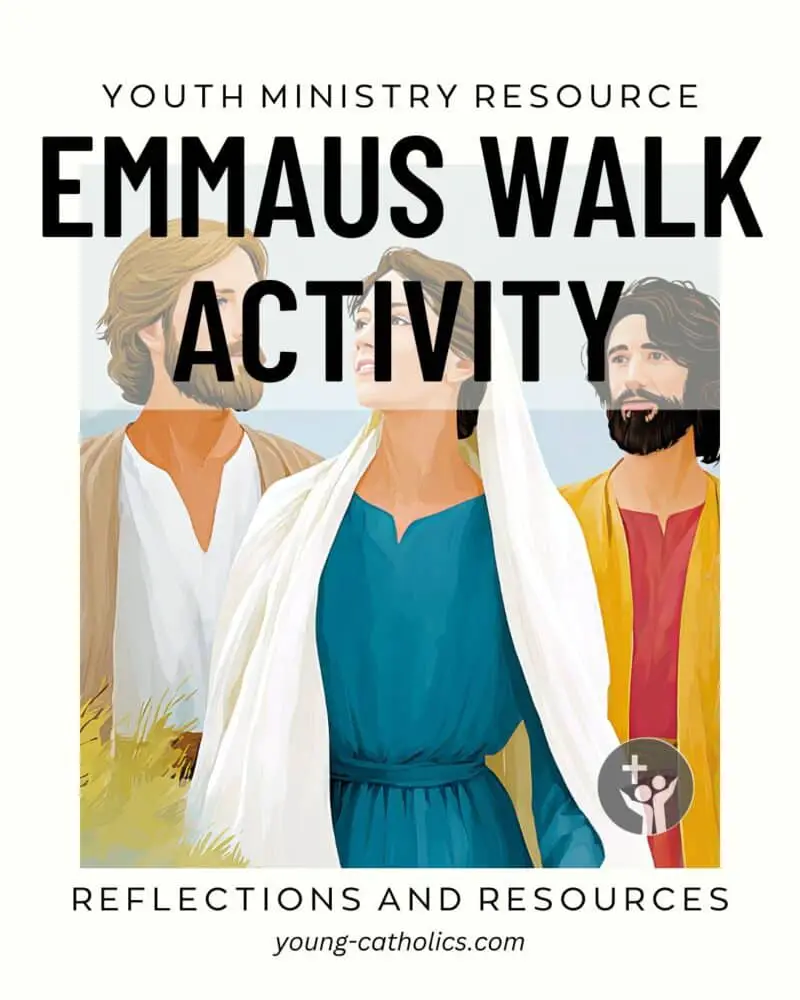
Emmaus Walk Activity for Youth Ministry
This Emmaus Walk activity is based on Luke 24:13-35, where Jesus walks with two disciples after His resurrection. The purpose of the activity is to help youth grow in faith through community, sharing, and prayer. It invites them to reflect on their spiritual journey and recognize Jesus walking with them in daily life.
Youth take part in games, small group talks, and personal testimonies. They also pray and reflect on their faith. These moments help them connect with others and deepen their relationship with God. The activity encourages youth to listen, share, and walk together as followers of Jesus.
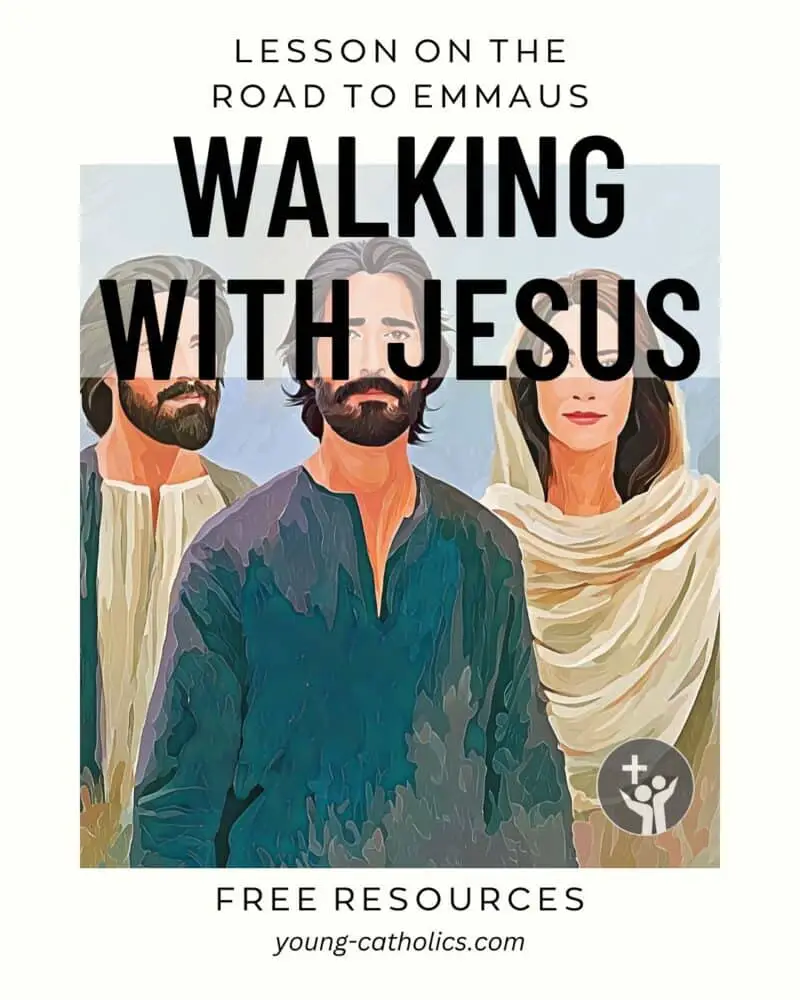
Walking with Jesus: The Road to Emmaus
This lesson, based on Luke 24:13-35, helps youth understand that Jesus is always with them, even when life feels confusing or hard. Like the disciples on the road to Emmaus, we may not always recognize Jesus right away, but He walks beside us and reveals Himself in simple ways—through Scripture, prayer, and the Eucharist.
The lesson teaches youth to be more aware of Jesus in everyday life and encourages them to listen to God’s Word. It also inspires them to share their faith with others, just like the disciples did after recognizing Jesus. Through games, discussion, and prayer, youth learn to trust that Jesus is near and to stay close to Him.
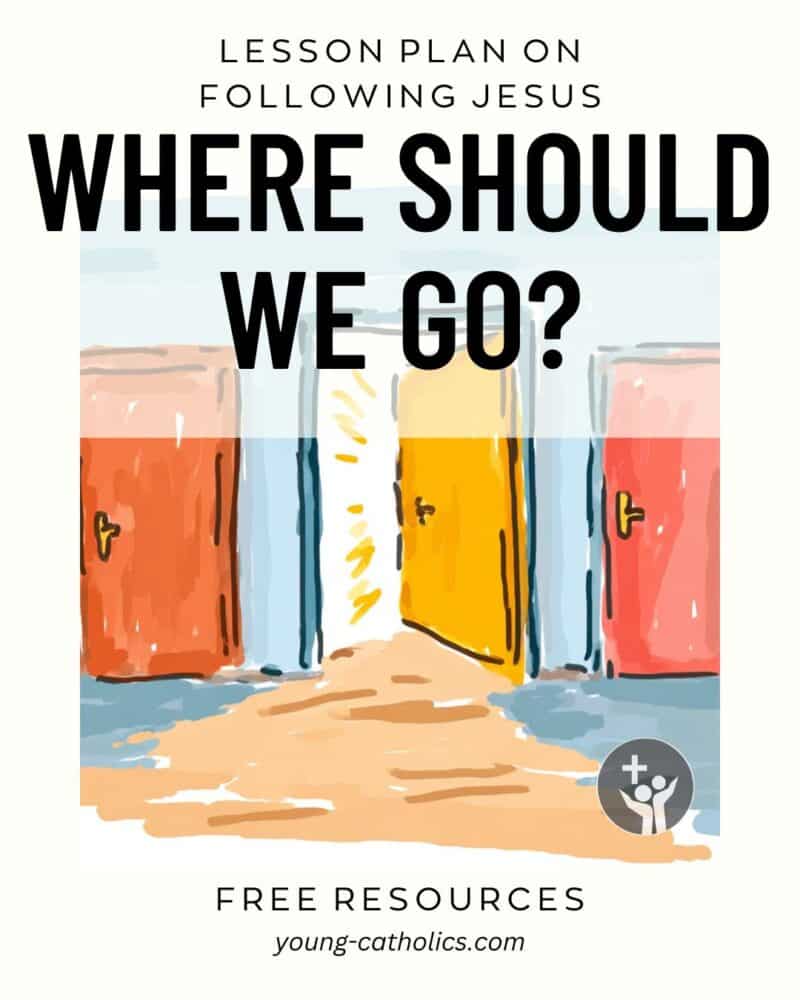
Where Should We Go? (Following Jesus)
This lesson, based on John 6:60-69, helps youth understand what it means to follow Jesus, even when it’s hard. It teaches that doubts and temptations are normal but can be faced by staying close to Jesus through prayer, Scripture, and trusted support. Like Peter, we can choose to stay with Jesus because He has the words of eternal life.
Youth also learn how to listen for Jesus’ voice and resist distractions from the world. The lesson reminds them that true joy comes from following Jesus, not from what the world offers. It encourages them to trust Jesus, seek forgiveness when needed, and stay strong in their faith journey.
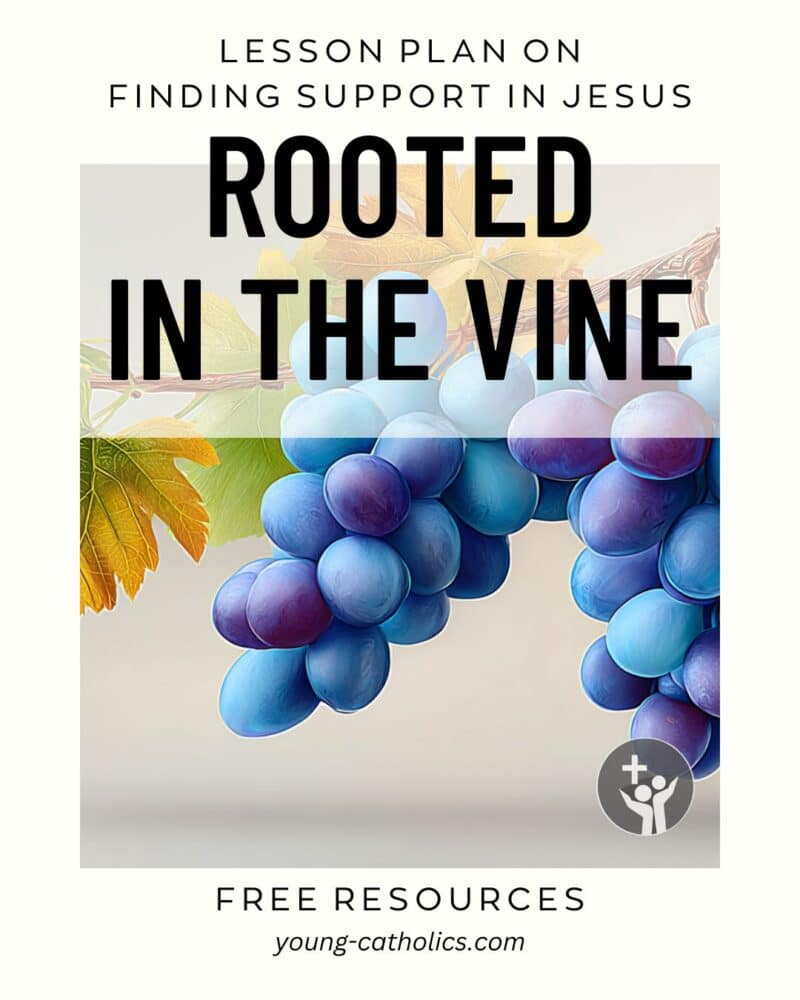
Rooted in the Vine: Finding Support in Jesus
This lesson plan, based on John 15:1-8, teaches youth how to find strength and support by staying connected to Jesus. Using the image of a vine and branches, it shows that Jesus is the source of life and that we can only grow and face challenges when we remain close to Him.
Youth will explore how prayer, Scripture, and Christian community help them stay rooted in Jesus. Through hands-on activities and small group discussion, they will reflect on how to seek Jesus’ support and how to bear fruit in their own lives.

What Moves You?
The “What Moves You? Holy Spirit Lesson Plan” helps youth understand how the Holy Spirit strengthens and guides them. Using John 20:19-23, this lesson shows that the Holy Spirit is like breath—giving life, courage, and energy to live as followers of Jesus. Youth learn that they are not alone. The Holy Spirit helps them share their faith and stay strong during hard times.
Through games, prayer, and small group discussion, youth explore how the Spirit moves them to live out their faith. They reflect on fears that hold them back and learn how the Holy Spirit gives gifts like courage and wisdom to help them move forward.
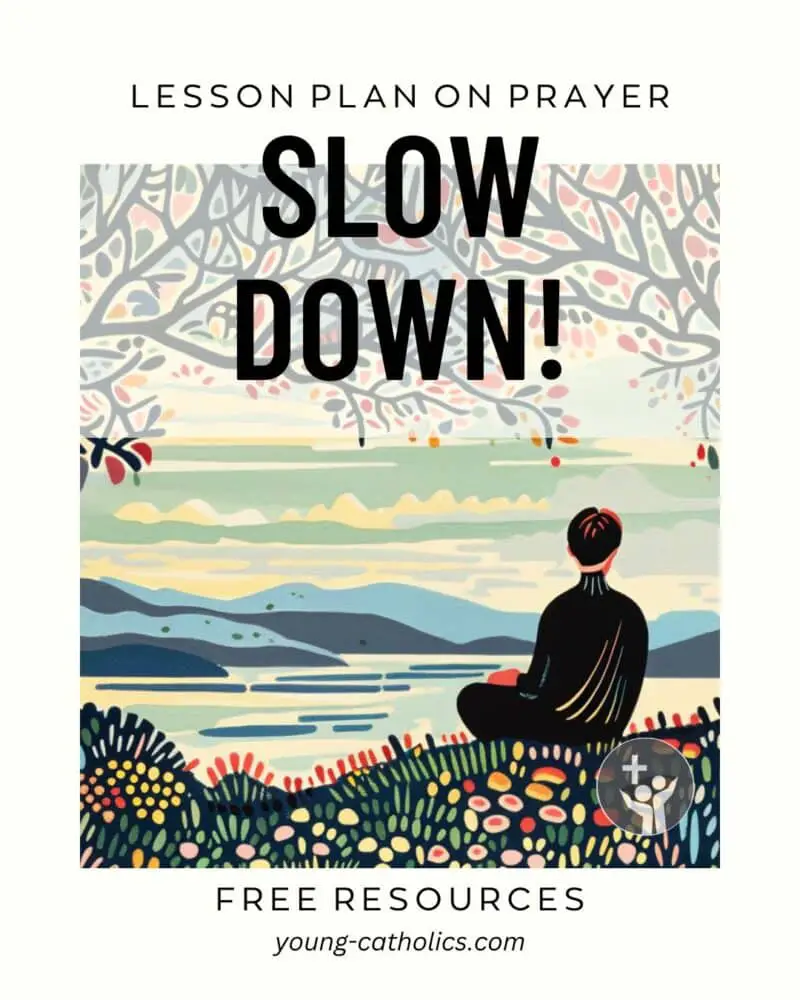
Slow Down! (Prayer)
The “Slow Down! Lesson Plan on Prayer” helps youth learn the value of rest and prayer in a busy life. Using Mark 6:30-34, it shows how Jesus invited His disciples to take time away to pray. The lesson encourages young people to follow Jesus’ example by slowing down and making space for quiet time with God.
This plan teaches that prayer is not just another task but an important part of a healthy and peaceful life. Youth explore ways to start a daily prayer habit, find a quiet place, and try different forms of prayer. The goal is to help them grow closer to God and find peace in their everyday lives.
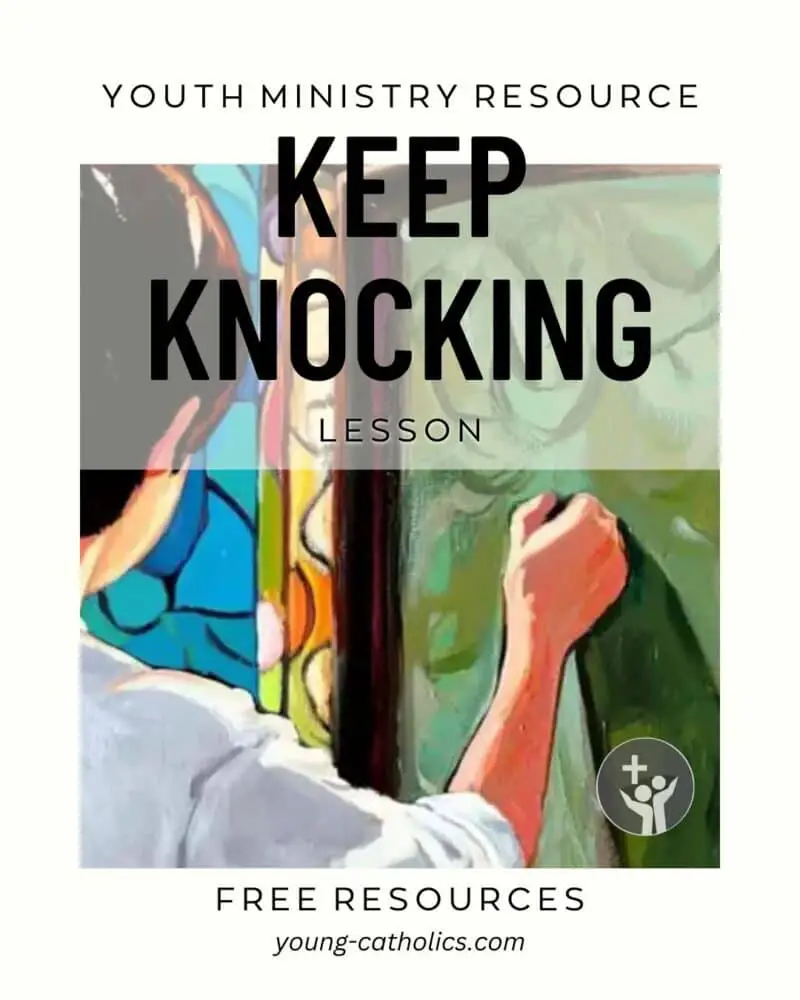
Keep Knocking (Persistence in Prayer)
This persistence in prayer lesson plan helps youth understand why it’s important to keep praying, even when they don’t see immediate answers. Through the story in Luke 11:1-13, they learn that God always hears our prayers and responds in His perfect timing. The lesson shows how persistence in prayer builds faith, trust, and a closer relationship with God.
This lesson is designed to encourage youth to make prayer a regular and meaningful part of their lives. It includes activities, discussions, and reflections to help them see that prayer is more than asking for things. It’s about trusting God, growing in patience, and learning to rely on Him in all things.
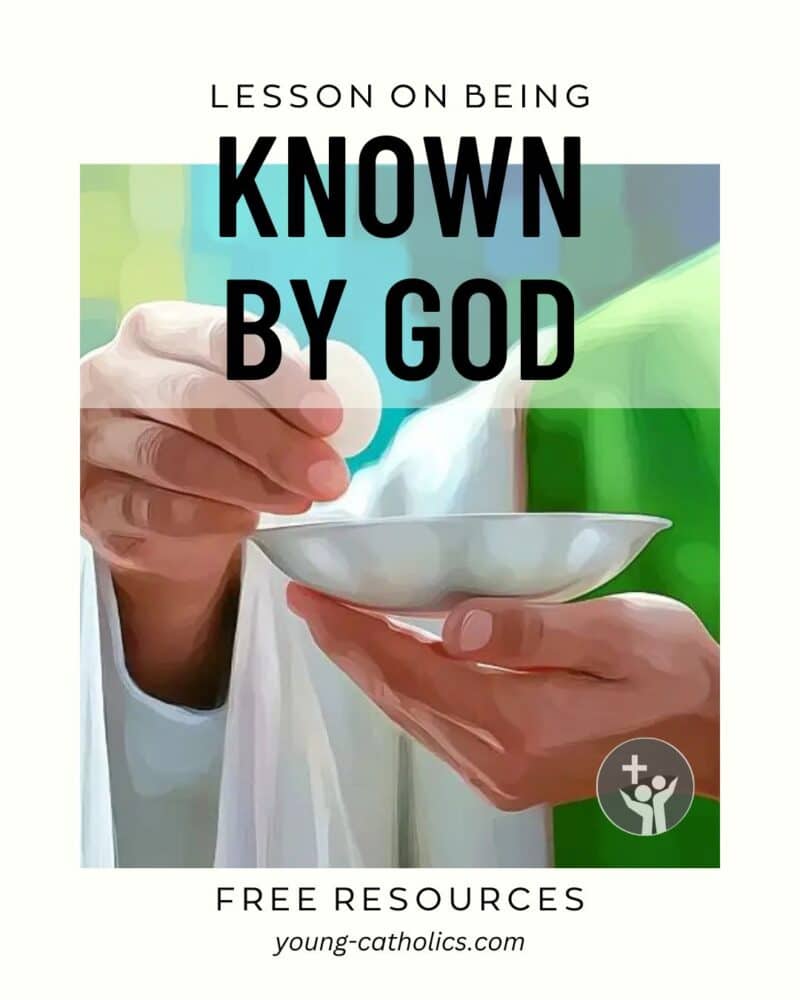
Being Known by God (Personal Relationship with Jesus)
The Being Known by God: How do we build a personal relationship with Jesus? lesson plan helps youth understand the importance of truly knowing Jesus and being known by Him. Based on Luke 13:22-30, this lesson reminds teens that faith is more than attending church or going through the motions. It’s about creating a real connection with Jesus through prayer, Scripture, the sacraments, and acts of love.
This lesson encourages youth to see Jesus as a friend who desires to walk with them in their daily lives. It provides practical steps for growing closer to Him and challenges them to make their faith personal. By the end, they’ll see how a personal relationship with Jesus gives meaning and joy to their lives.
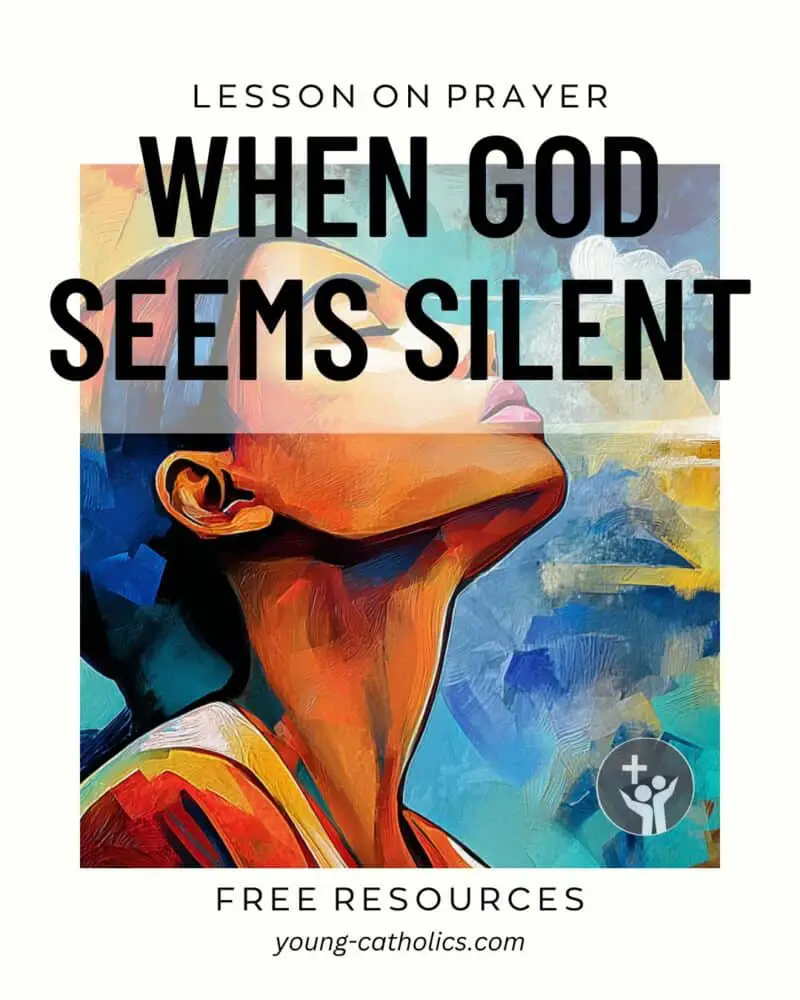
When God Seems Silent
This lesson, When God Seems Silent, helps youth explore what to do when prayer feels empty or unanswered. It’s based on Luke 18:1-8, where Jesus tells a story about a persistent widow who keeps asking for justice. Her example shows that we should keep praying, even when it feels like nothing is happening.
The purpose of the lesson is to help teens understand that silence from God doesn’t mean He isn’t listening. It teaches that God hears every prayer, even when He doesn’t respond right away. Youth will learn to trust, be honest in prayer, and stay close to God in hard times.
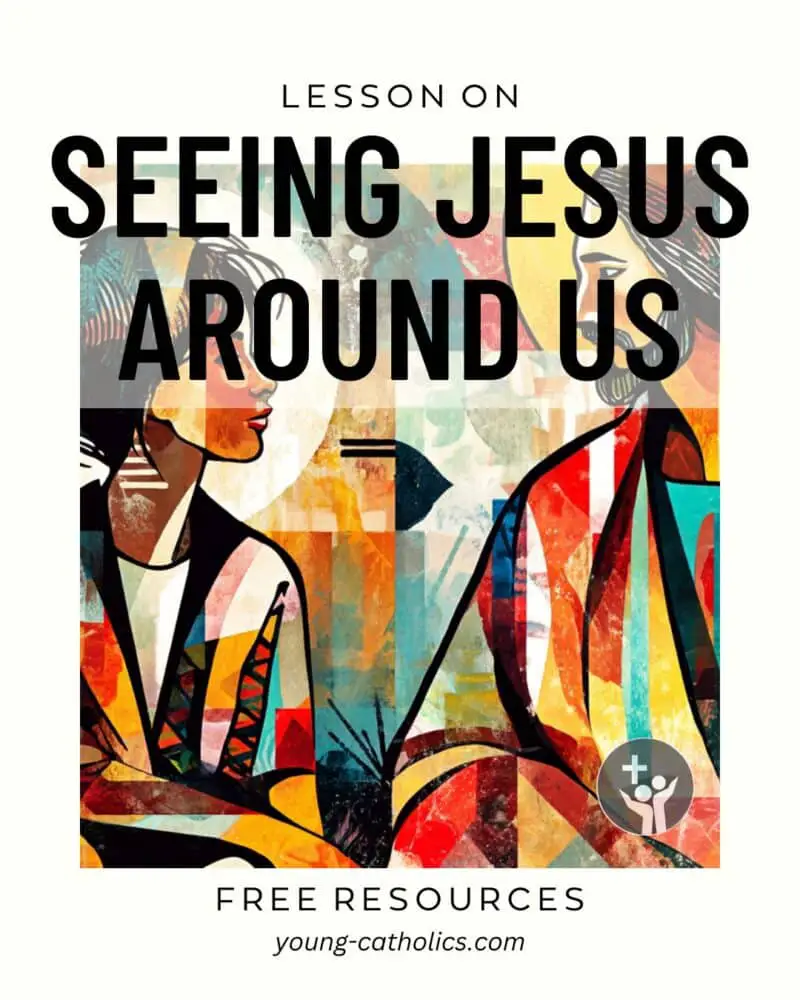
Seeing Jesus Around Us
This lesson helps youth recognize how Jesus is present in their everyday lives. Using the story of John the Baptist from Matthew 11:2-11, it shows that Jesus answers doubt not with words, but with signs of love, healing, and hope.
This lesson encourages teens to look for Jesus in quiet moments and simple acts of kindness. It helps them see that faith is not just about church, but about how we live each day. It gives space for honest questions and helps build trust in Jesus.
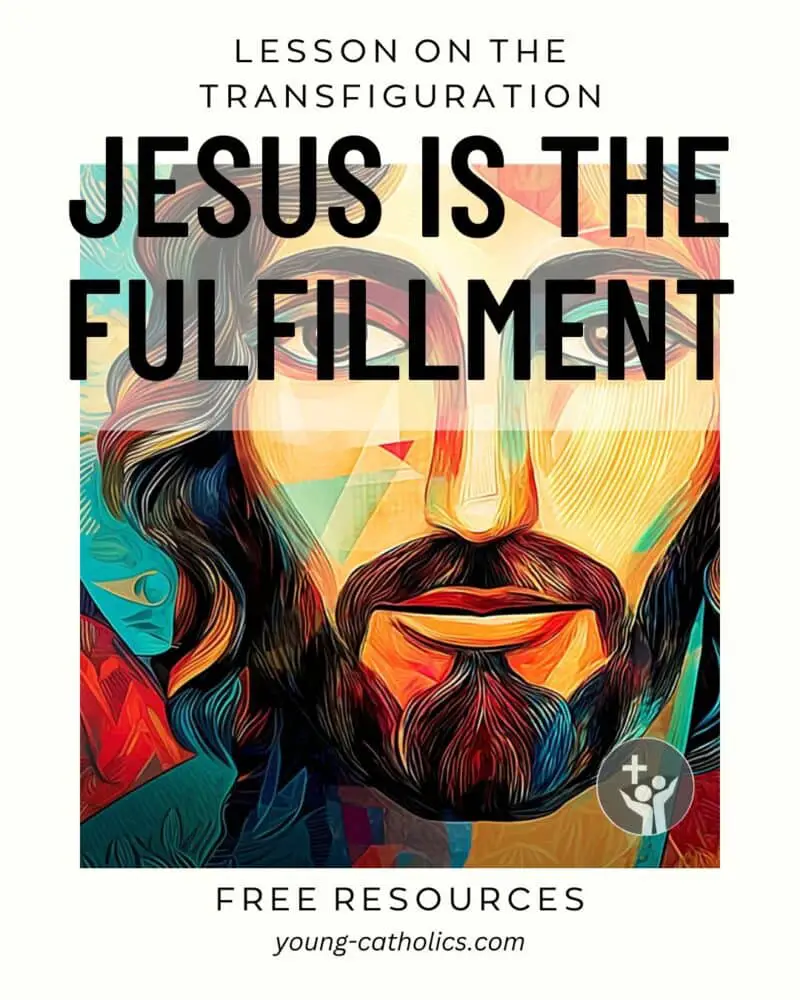
Jesus Is the Fulfillment of the Law and the Prophets
This lesson plan helps youth understand the Transfiguration of Jesus in Matthew 17:1-9. It shows how Jesus is the fulfillment of the Law and the Prophets, represented by Moses and Elijah. The lesson encourages youth to see how Jesus connects the whole Bible and why we are called to listen to him.
The plan includes Scripture reading, small group sharing, prayer, and a fun opening game. It helps youth hear God’s voice and see how the Bible matters in their lives today. It reminds them that Jesus is the Son of God and still speaks to us. The lesson is clear, simple, and focused on helping teens grow in faith.
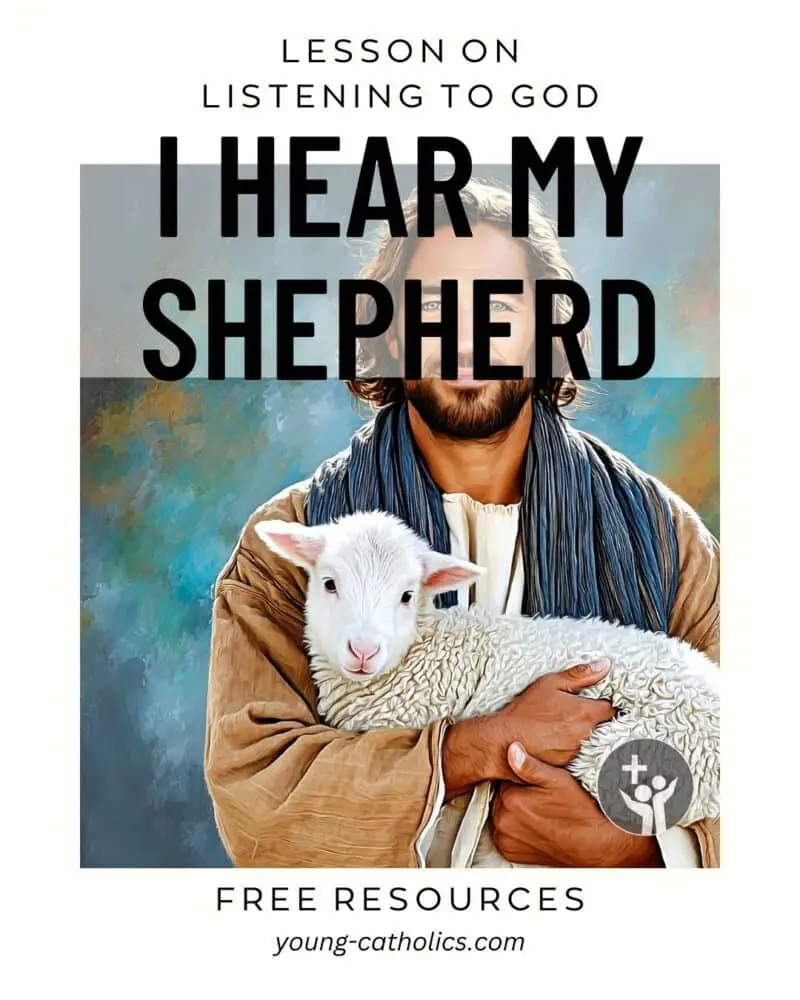
I Hear My Shepherd
The I Hear My Shepherd lesson helps youth notice how God speaks to them in daily life. It invites them to slow down, pay attention, and listen for His voice. They learn that God knows them well and wants to guide them with love and care.
This lesson also shows that listening to God leads to action. It encourages young people to follow where He leads, even in small steps. Like sheep who trust their shepherd, they can grow in faith and confidence by listening and responding to Him.
My Relationship with Others
- Give It Your All (Generosity)
- I Can’t See! (Fault Finding)
- Love Your Enemies (Conversion of Heart)
- What Should We Do? (Advice)
- King of the Hill (Servant Leadership)
- First or Last?(Humility)
- Inconsistent Imposter (Hypocrisy and the Church)
- Invisible – Seeing Others
- Love One Another (Love)
- Judgement of the Nations (Corporal Works of Mercy)
- Us vs Them
- What Is Love?
- Together We’re Better
- Fake You Out (Popularity and Authenticity)
- Who’s Your Buddy? (Friendship)
- Dignity of All People
- Why Comparing Is Dangerous
- Living God’s Love in Family
- Baptism of Jesus (Solidarity)
- Shine Online
- The Truth Matters (Honesty in Relationships)

Give It Your All (Generosity)
The “Give It Your All Lesson Plan on Generosity” teaches youth that true generosity comes from the heart and trust in God. It shows that giving is not about the amount but about the love behind the gift. The lesson uses the story of the widow’s mite from Mark 12:38-44 to highlight how small offerings, given with faith, mean a lot to God.
Youth are encouraged to give without seeking praise and to be generous in everyday life. This includes not just money but also time and kindness. The lesson helps them see that everything they have is from God and meant to be shared. It calls them to give with love, just as the widow did.
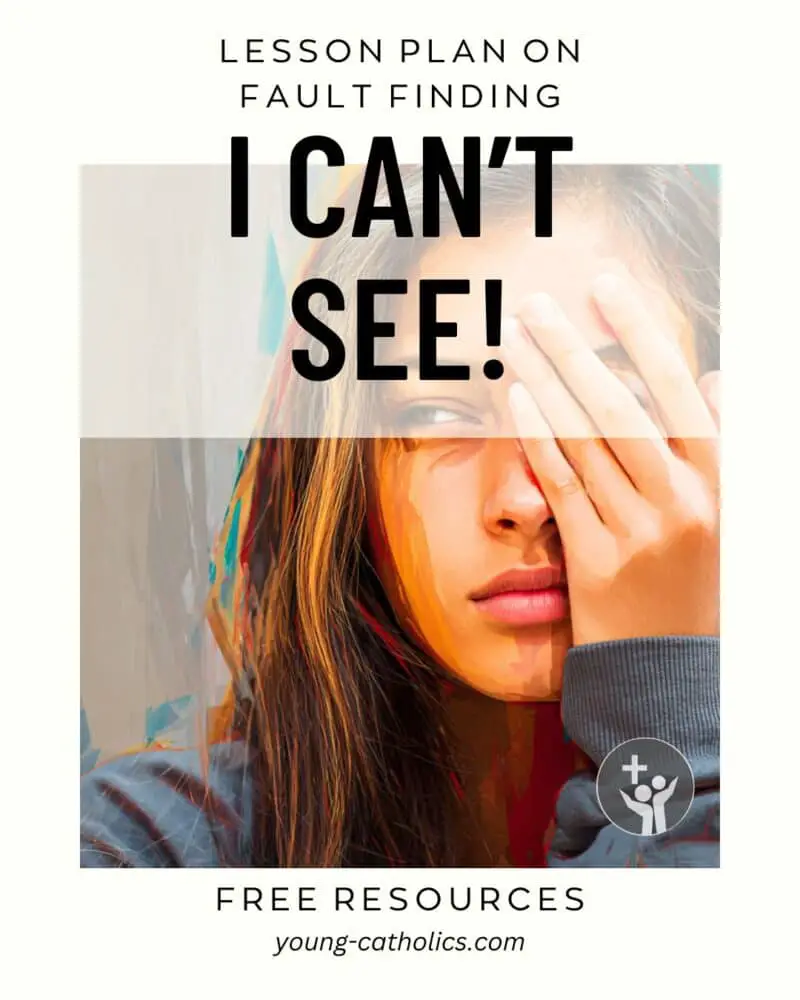
I Can’t See! (Fault Finding)
The “I Can’t See!” Lesson Plan on Fault Finding teaches youth the importance of recognizing their own faults before judging others. Based on Luke 6:39-45, it helps them understand Jesus’ teaching about removing the beam from their own eye before pointing out the splinter in someone else’s. The goal is to build humility, self-awareness, and compassion.
This lesson encourages youth to think before they speak and to give correction with love, not judgment. It also shows how confession and prayer can help them grow. By focusing on kindness and self-improvement, they learn to build stronger, more caring relationships.
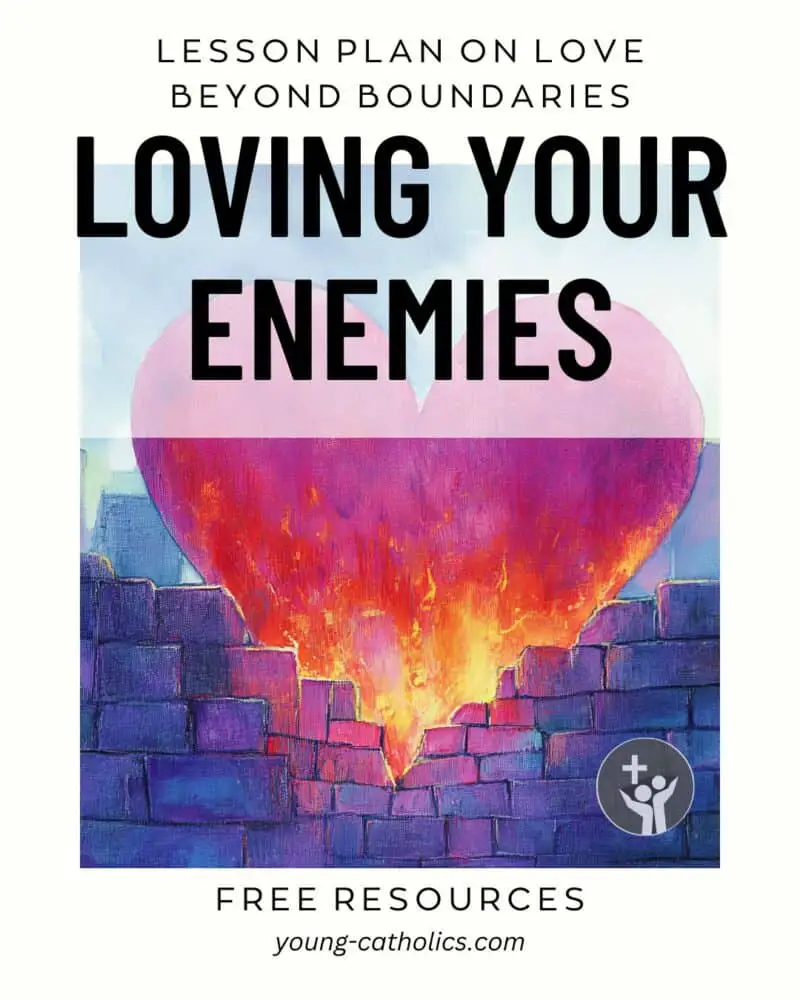
Love Your Enemies (Conversion of Heart)
The “Loving Your Enemies” lesson plan helps youth learn how to forgive and show mercy, even to those who hurt them. It is based on Luke 6:27-38, where Jesus teaches us to love our enemies, do good to those who hate us, and forgive others. This lesson shows that loving our enemies doesn’t mean pretending the hurt didn’t happen. Instead, it means letting go of hate and trusting God with our pain.
Youth are encouraged to reflect on their own struggles with forgiveness. The lesson gives steps to help them pray, heal, and grow in love. It reminds them that love is stronger than hate and that choosing forgiveness brings peace. By following Jesus’ command, they grow closer to God and become more like Him.
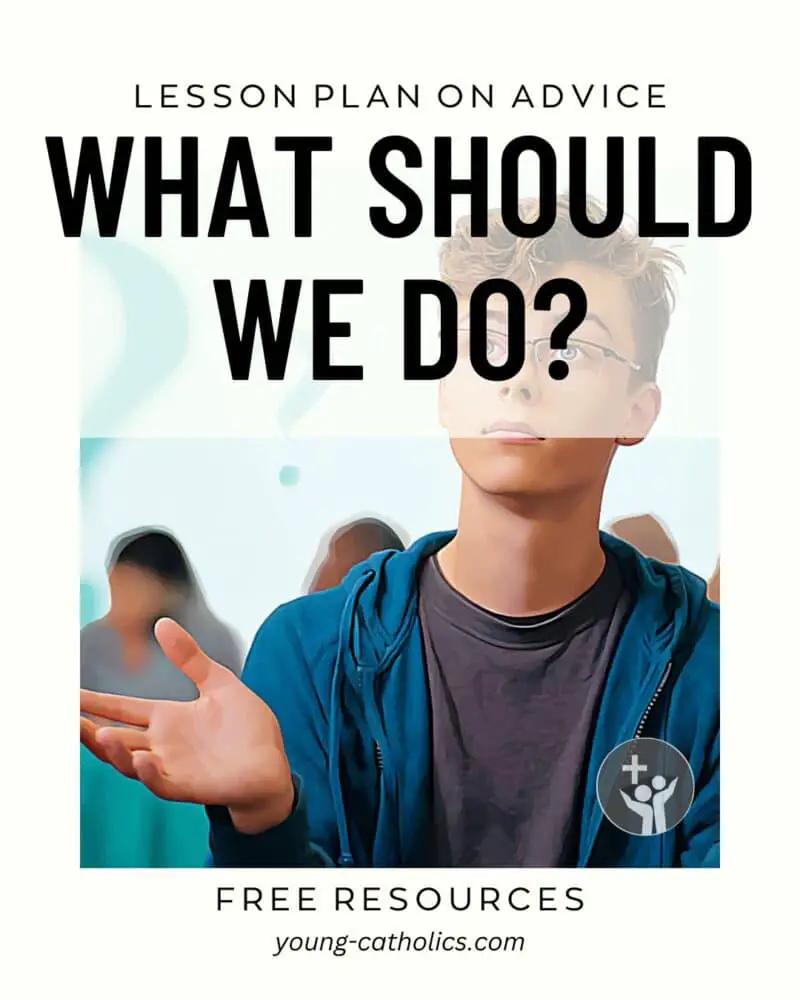
What Should We Do? (Advice)
The “What Should We Do?” lesson plan teaches youth how to seek and give advice that reflects their faith. Based on Luke 3:10-18, it looks at how John the Baptist gave honest advice that helped people grow closer to God. The lesson shows that good advice should lead us to live with kindness, honesty, and fairness.
Youth learn to think carefully about who they trust and how they influence others. The lesson encourages them to pray before giving or following advice and to look for guidance from those who live their faith. It helps them grow in wisdom and learn how to make choices that bring them closer to God.

King of the Hill (Servant Leadership)
This servant leadership lesson plan teaches youth that true leadership is about serving others, not seeking power. Using Mark 10:35-45, it shows how Jesus led with humility and love. Youth learn that being a leader means putting others first, listening, and caring for those around them.
The lesson helps young people reflect on their actions and challenges them to lead by example in their schools, homes, and communities. It encourages them to follow Jesus by leading with compassion and working for the good of others.
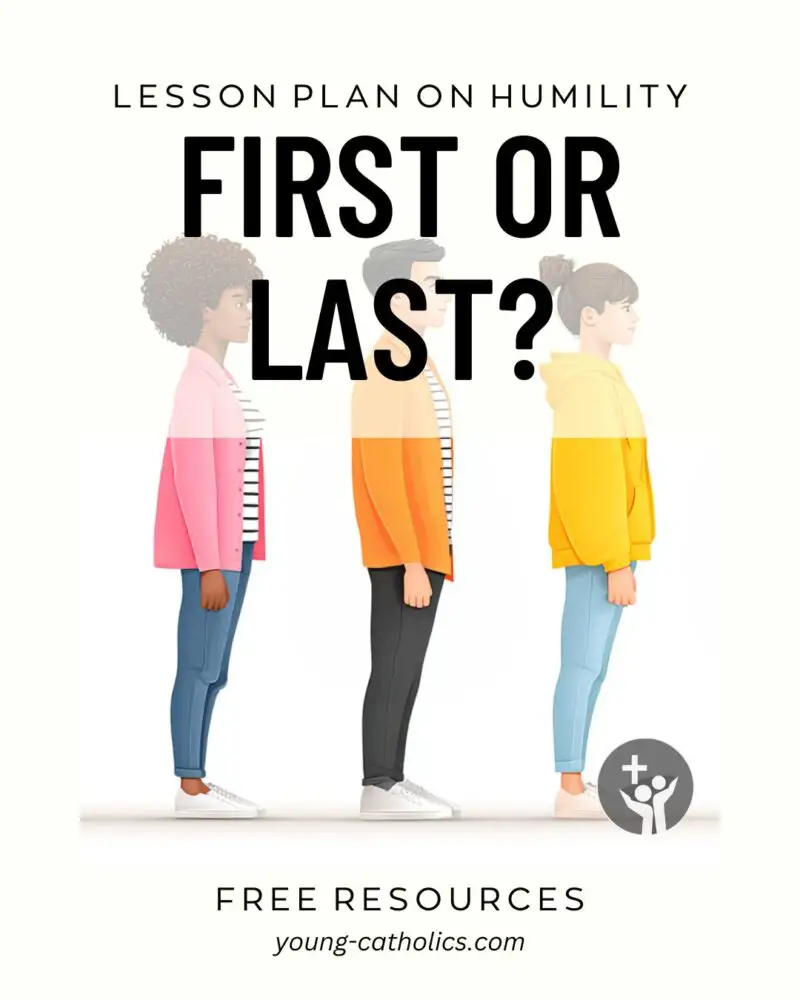
First or Last?(Humility)
The First or Last? Lesson Plan on Humility teaches youth that true greatness comes from serving others, not from being first. It helps them understand that their worth is not based on being better than others but on being loved by God. The lesson uses Mark 9:30-37, where Jesus teaches the apostles that the greatest must be the servant of all.
Youth learn that humility is not about thinking less of themselves but about recognizing their gifts and using them to build others up. The lesson encourages them to avoid comparing themselves to others and instead focus on serving with love.
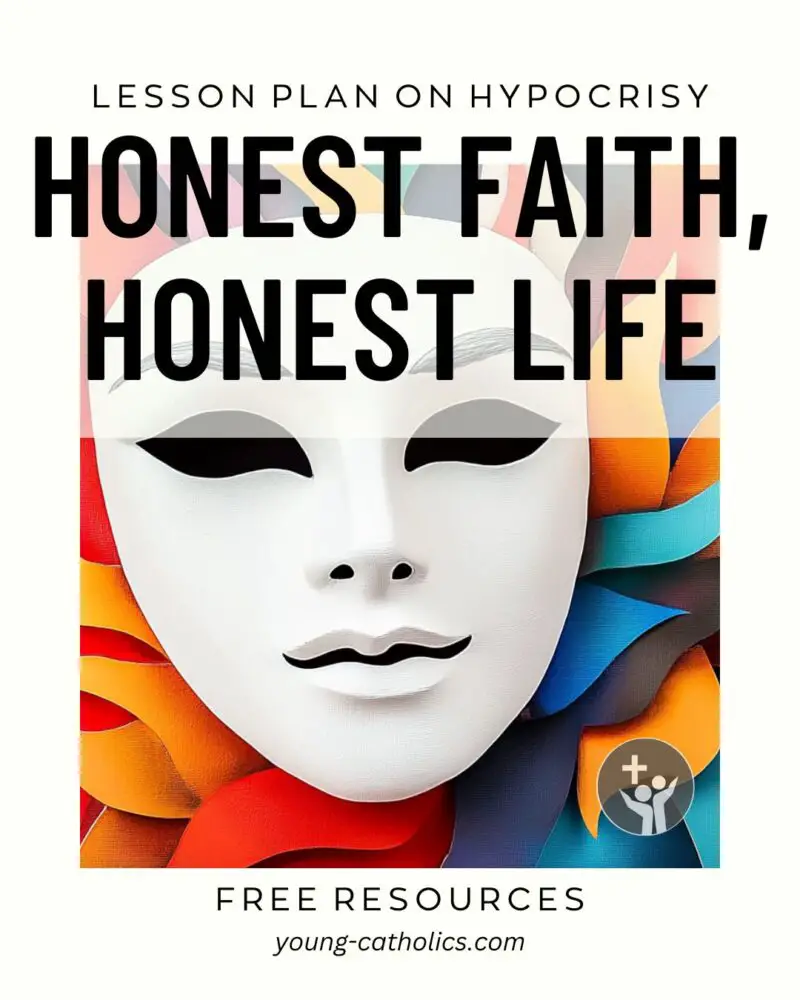
Woman Caught in Adultery (Hypocrisy and the Church)
The Lesson Plan on the Woman Caught in Adultery helps youth understand the danger of hypocrisy and the importance of living with honesty and humility. It is based on John 8:1-11, where Jesus challenges the crowd to examine their own sins before judging a woman caught in adultery. This lesson teaches that our actions should match our faith and that judging others harshly while ignoring our own faults is harmful.
Youth are encouraged to reflect on their behavior and avoid being quick to condemn others. The lesson shows how Jesus responded with mercy and truth, calling all of us to change with compassion, not shame. It reminds young people that everyone needs forgiveness and that we should support one another in living a life that reflects God’s love.
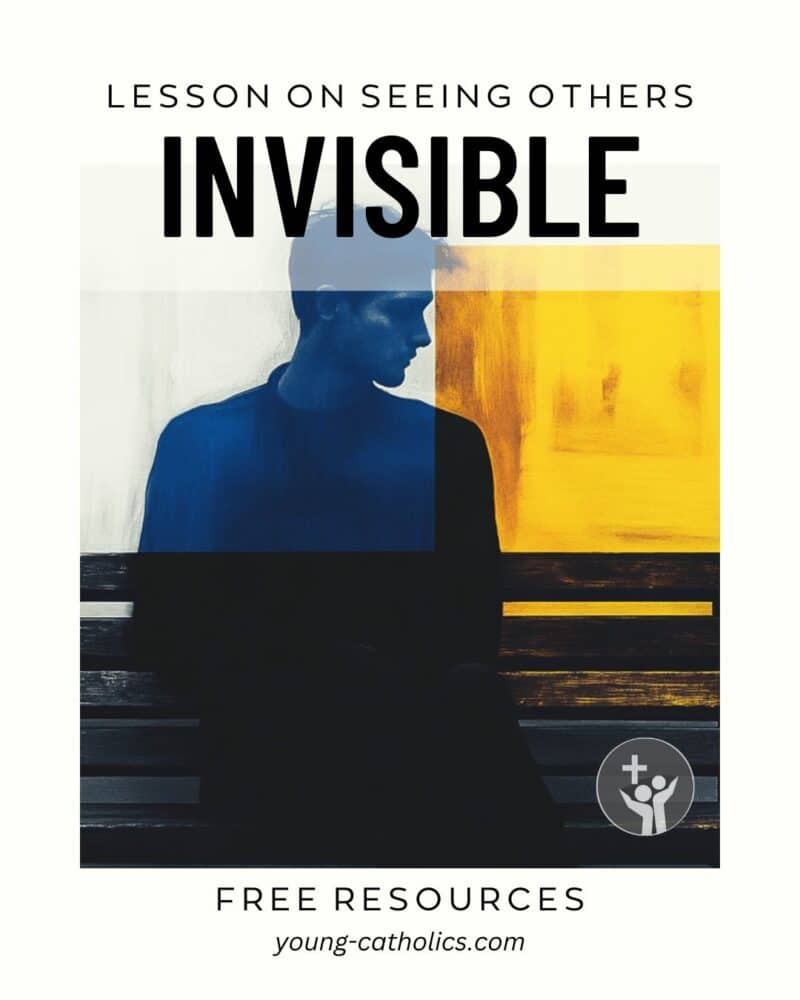
Invisible – Seeing Others
The Invisible lesson plan on seeing others helps youth recognize people who feel overlooked or left out. It encourages them to notice those around them and take small steps to show kindness. Many people feel invisible in daily life, but simple actions like a smile or greeting can make a difference.
This lesson is based on the parable of the rich man and Lazarus (Luke 16:19-31). It teaches that ignoring those in need goes against Jesus’ message of love and compassion. Youth learn to be more aware of others, step out of their comfort zones, and live their faith through acts of kindness.
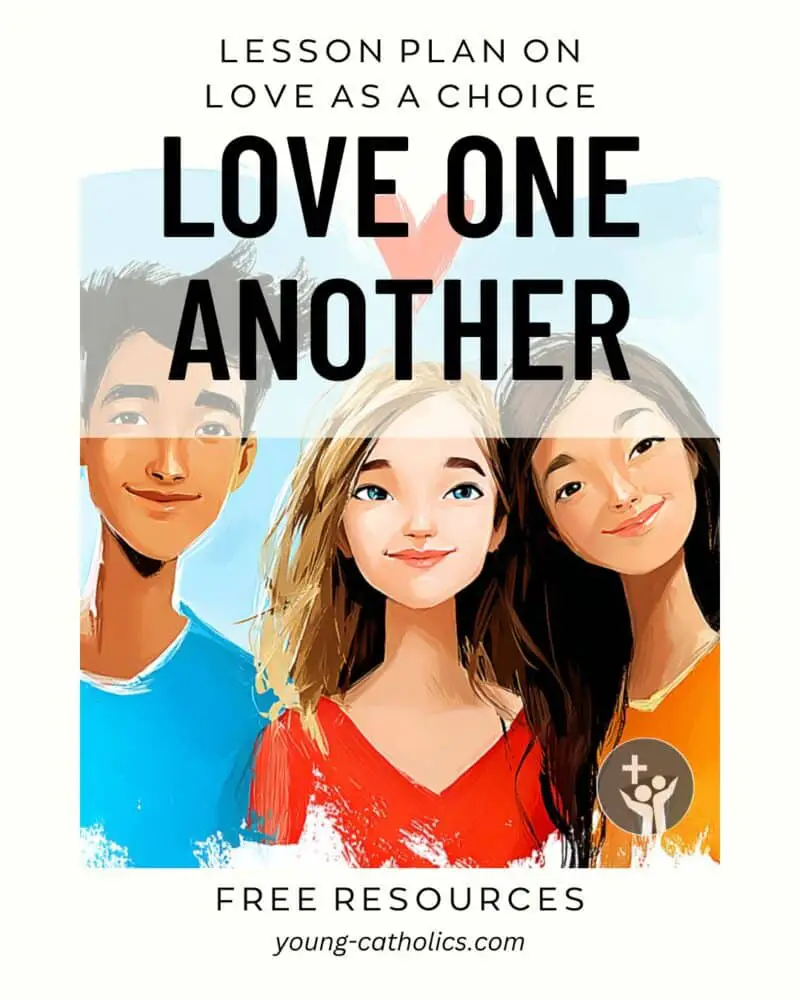
Love One Another (Love)
The Love One Another lesson plan helps youth understand that love is more than a feeling—it is a daily choice to act with kindness, patience, and forgiveness. It teaches that love shows through actions, not just emotions. The lesson uses John 13:31-33A, 34-35, where Jesus gives the command to love one another, to show that love is a sign of being his follower.
This lesson helps youth see that choosing love, even when it’s hard, brings them closer to God and others. It offers practical ways to love like Jesus, even in small moments. By learning that love means putting others first and making sacrifices, youth are encouraged to live with compassion and care in everyday life.
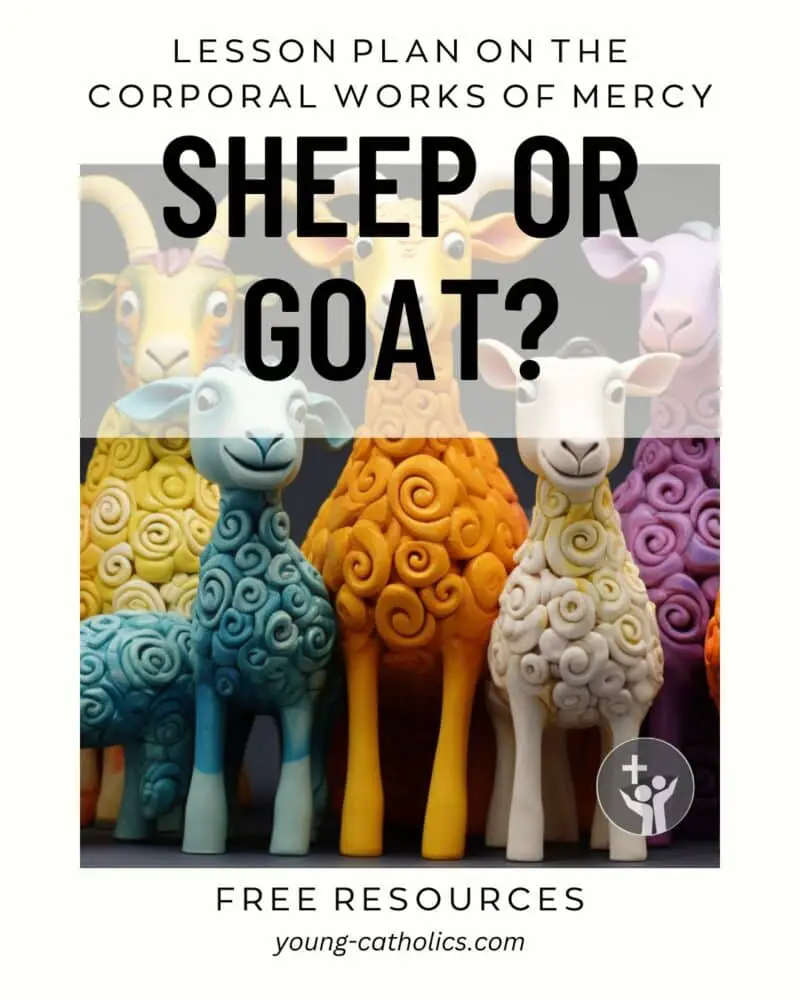
Judgement of the Nations (Corporal Works of Mercy)
This lesson plan teaches youth about the Corporal Works of Mercy, which are actions that help people with physical needs. These include feeding the hungry, giving drink to the thirsty, clothing the naked, sheltering the homeless, visiting the sick and imprisoned, and burying the dead. The lesson is based on Matthew 25:31-46, where Jesus says that when we care for others, we are caring for Him.
Through discussion and activities, students learn what each work of mercy means and how they can live it out. The goal is not just to understand but to take action. Youth are challenged to do one of the works during the week. This helps them grow in faith and compassion by serving others.
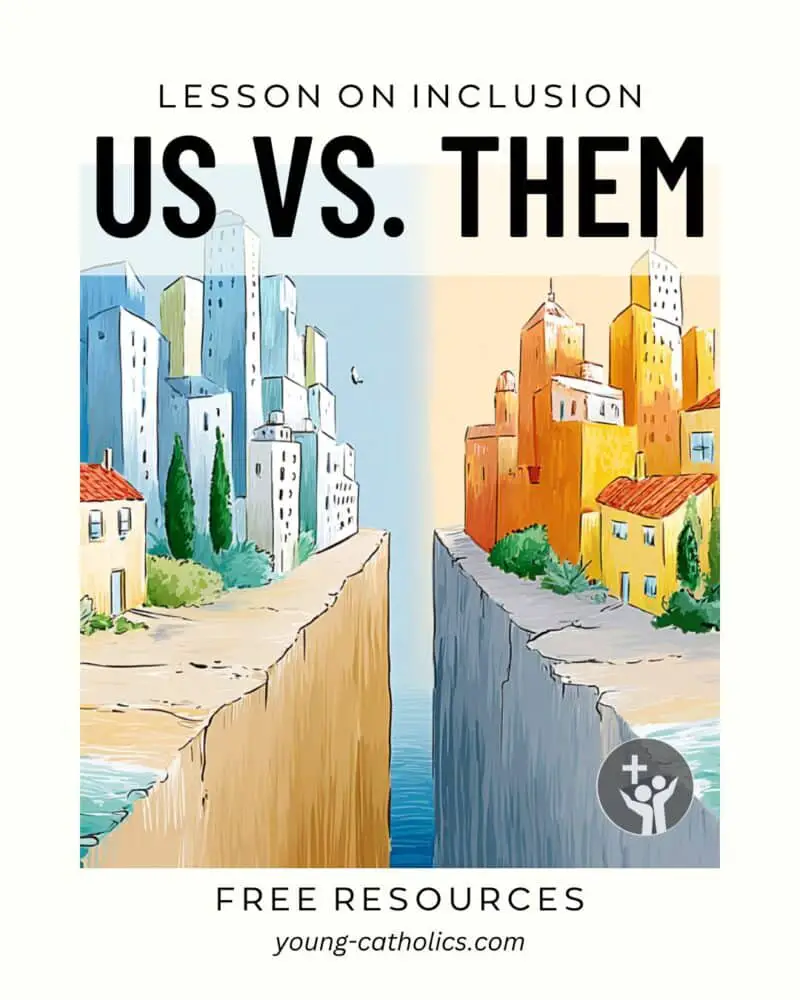
Us vs Them
This lesson plan teaches youth about the importance of inclusion and fairness. It uses Matthew 15:21-28, where Jesus speaks with a Canaanite woman, to show that God’s love is for everyone. Youth are encouraged to think about the groups they belong to and how they can welcome others who are different. The goal is to help them see all people as God’s children, deserving of love and respect.
Through discussion, small group questions, and a weekly challenge, youth learn how to put inclusion into action. They explore how to stand up for others, make new friends, and build a more loving community. This lesson reminds them that being a follower of Jesus means treating others with kindness, no matter their background.
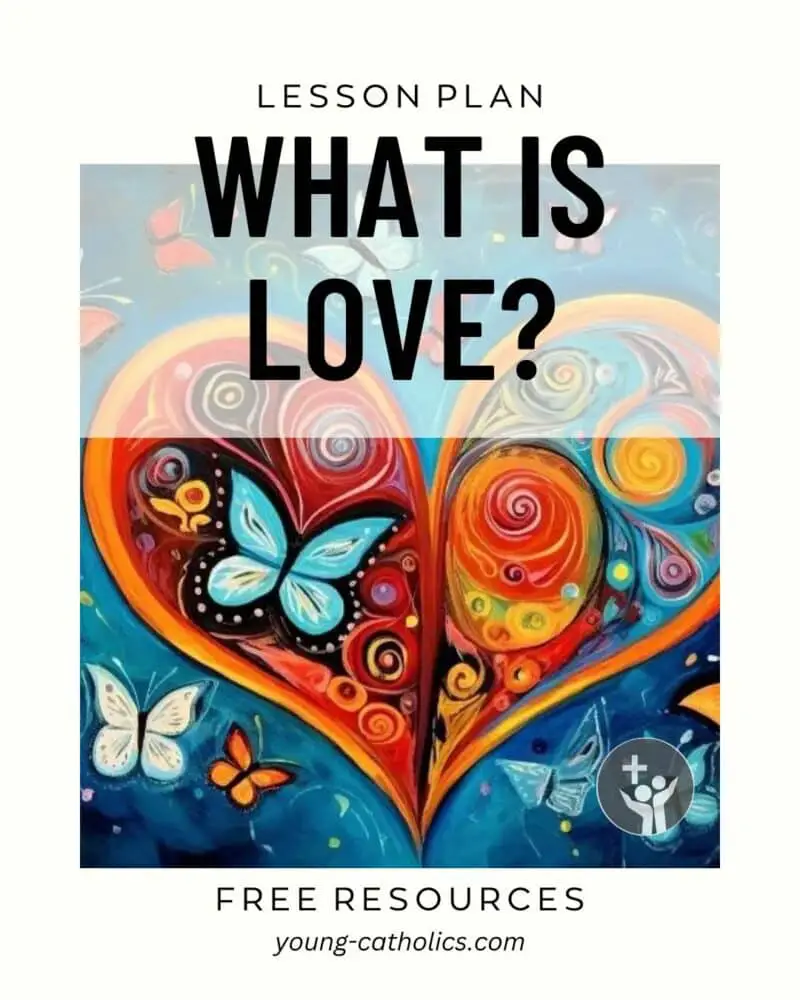
What Is Love?
This lesson plan helps teens understand what love really means. It shows that love is more than a feeling—it is a choice and an action. Youth learn the difference between liking someone and truly loving them. They also explore different kinds of love, such as love for family, friends, and others who may be hard to love.
The lesson uses Matthew 22:34-40 to teach that the greatest commandments are to love God and love others. Teens reflect on how love involves sacrifice, kindness, and wanting what is best for someone else. The goal is to help them build strong, respectful relationships by choosing to love with their whole hearts.

Together We’re Better
The “Together We’re Better” lesson plan teaches youth how to lovingly support each other in faith. It is based on Matthew 18:15-20, where Jesus talks about correcting others with care and prayer. The lesson shows that helping friends grow in faith is not about judging but about love and concern. It encourages honest conversations and reminds youth that we are stronger when we help each other.
This plan also introduces the Spiritual Works of Mercy, like comforting others, forgiving, and praying. Youth learn how these actions build a stronger and kinder faith community. The lesson includes games, discussion, and real-life examples to help teens practice these works in everyday life. It reminds them that living the faith means walking with others, especially during struggles.

Fake You Out (Popularity and Authenticity)
The “Fake You Out” lesson plan helps youth understand the dangers of hiding their true selves to gain popularity. It encourages them to embrace their unique identity, created by God, and to seek joy in being authentic. The lesson uses Romans 12:2 to remind youth that they are made for a purpose and should not conform to what the world says is popular.
Through games, discussion, and reflection, teens explore how to build real friendships based on honesty instead of social status. They learn that being true to who God made them to be is the path to real happiness and lasting relationships. The plan includes a personal challenge and prayer to help youth take this message into their daily lives.
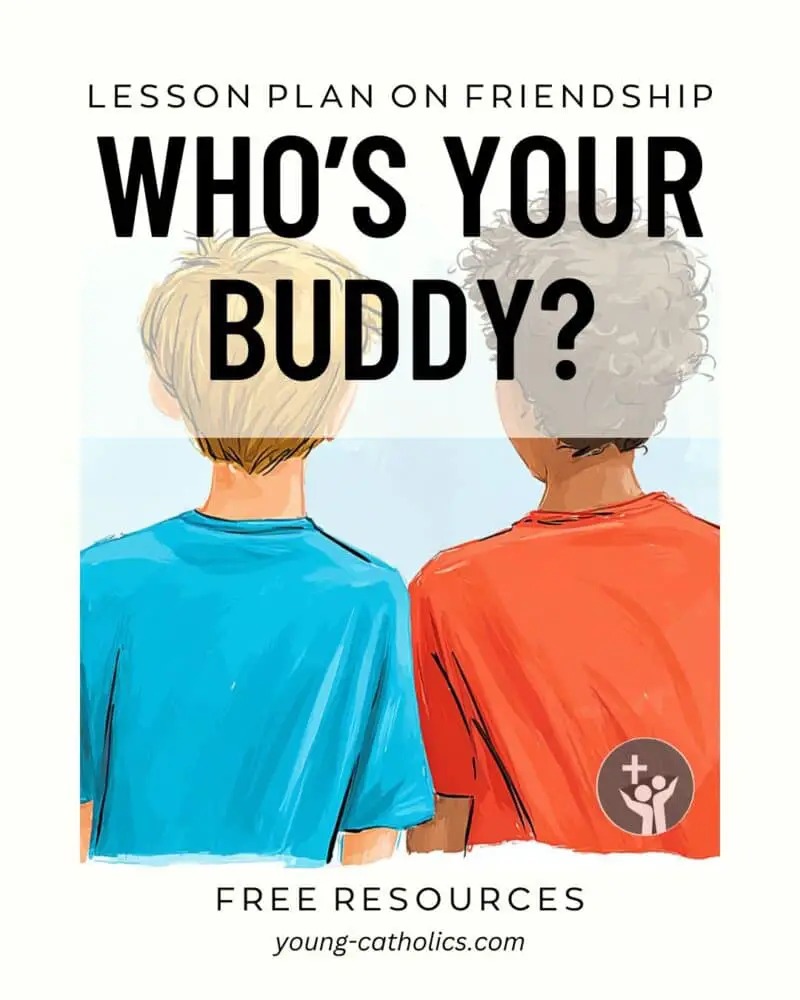
Who’s Your Buddy? (Friendship)
The “Who’s Your Buddy?” lesson plan teaches youth the value of friendship in living out their faith. It is based on Mark 6:7-13, where Jesus sends out his disciples in pairs. This shows the importance of having a friend to support and encourage us in our journey.
Youth learn that Christian friendships help us stay focused on God and face challenges with strength. Friends remind us of our purpose, lift us up when we’re struggling, and pray for us. This lesson helps youth see that we are stronger when we walk together in faith.
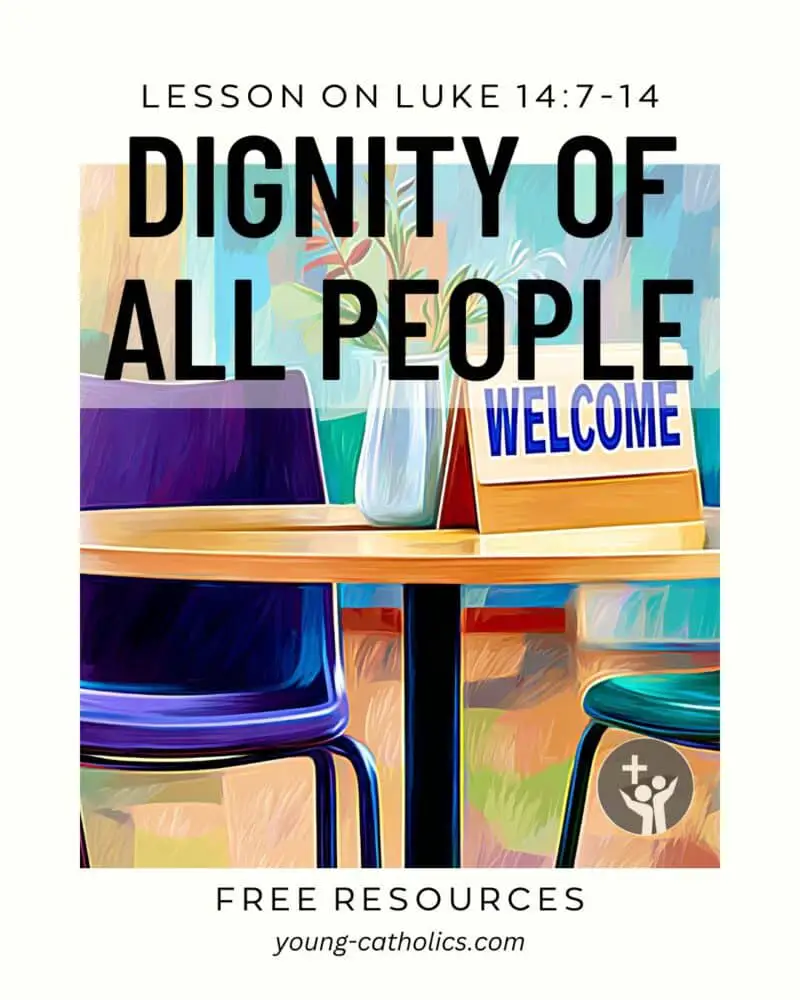
Dignity of All People
The Respecting the Dignity of All People lesson plan helps youth understand that every person has value because they are created by God. Using Luke 14:1, 7-14 as the foundation, it explores how Jesus calls us to love and include those who are often left out. The lesson encourages youth to reflect on their own actions and challenges them to treat others with kindness, respect, and fairness.
This lesson benefits youth by helping them see the world through God’s eyes. It teaches them to build stronger relationships by valuing others, no matter their differences. Through discussion, reflection, and practical ideas, youth are inspired to honor the dignity of every person they meet and make a positive impact in their daily lives.
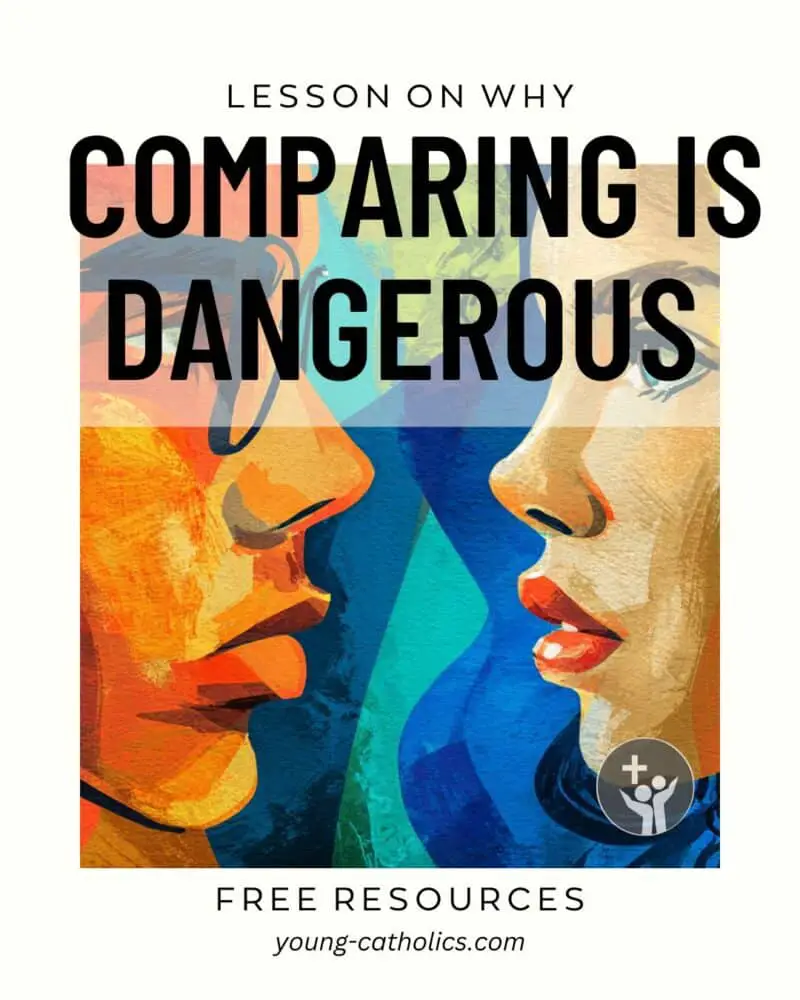
Why Comparing Is Dangerous
The “Why Comparing Is Dangerous” lesson plan helps youth understand the harm that comes from comparing themselves to others. It uses the parable of the Pharisee and the tax collector from Luke 18:9-14. In this story, Jesus shows that God cares more about honesty and humility than about pride or performance.
Youth will learn how comparison can lead to pride, jealousy, or feeling not good enough. They’ll reflect on how God sees each person with love and mercy. The lesson includes Scripture reading, group discussion, a prayer, and a simple challenge to help youth live out what they’ve learned.
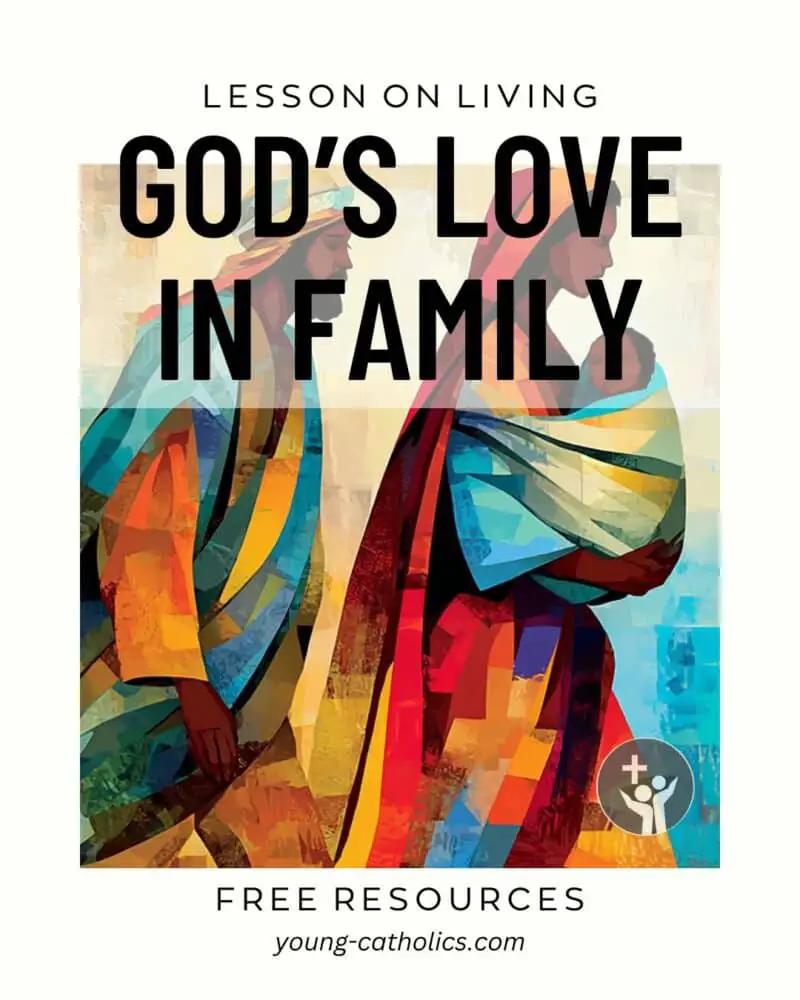
Living God’s Love in Family
This lesson plan helps youth think about how their families can reflect God’s love. It is based on the story of the Holy Family from Matthew 2:13-23. The Holy Family didn’t have a perfect life, but they trusted God and stayed together in hard times.
Youth will learn that love, patience, and faith can grow in any home. The lesson encourages them to care for others, forgive, and pray for their families. It helps them see how they can bring God’s love into everyday life, starting at home.
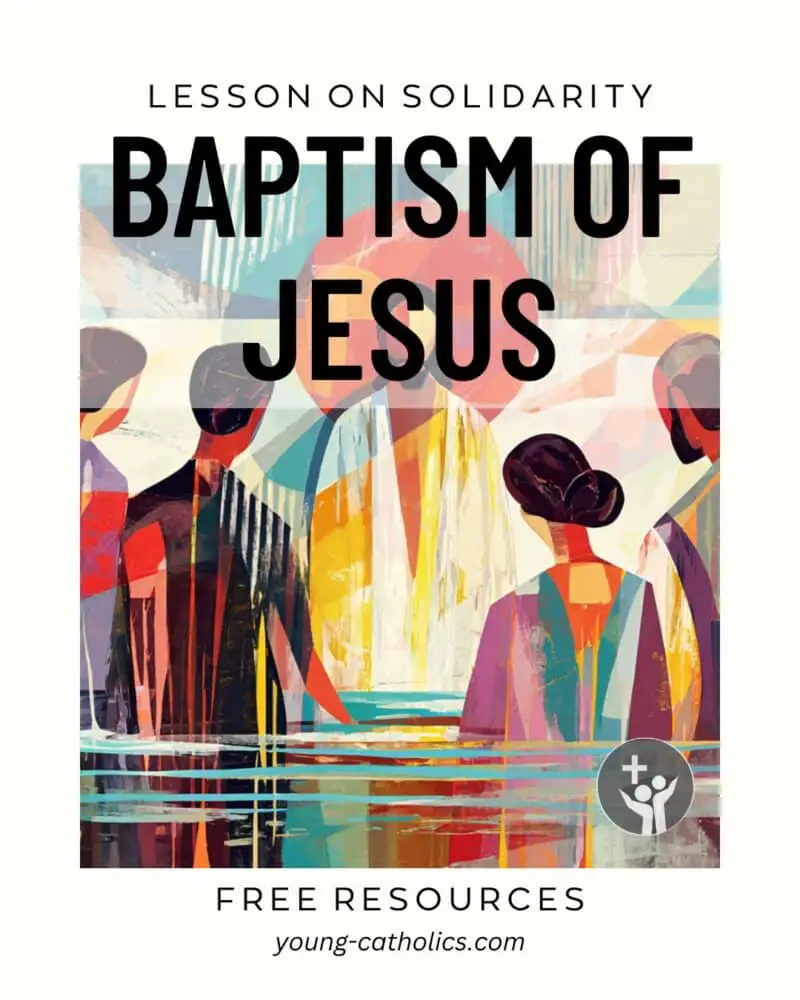
Baptism of Jesus (Solidarity)
This lesson plan helps youth understand why Jesus was baptized and what it means for their own faith. It shows how Jesus chose to stand with people by entering the water, even though he had no sin. This teaches young people about solidarity—walking with others and being there for them.
Through Scripture, games, discussion, and reflection, youth learn that they are not alone. Jesus understands them and calls them beloved. This lesson plan encourages them to live out their baptism by caring for others and following Jesus’ example.
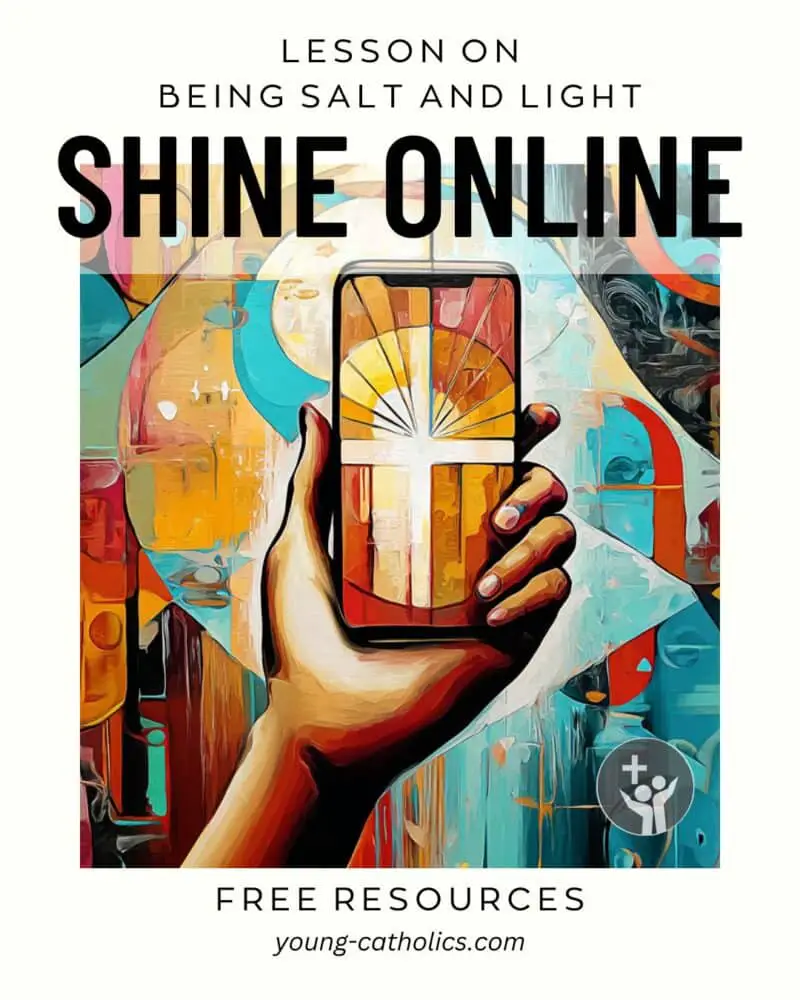
Shine Online
This lesson plan helps teens understand how to live their faith on social media. It is based on Matthew 5:13-16, where Jesus calls us the salt of the earth and the light of the world.
Youth will learn that what they say and do online matters. They will explore how to be kind, honest, and thoughtful when posting, commenting, or sharing. The lesson gives them a chance to talk about real situations they face and how their faith fits into their digital life.
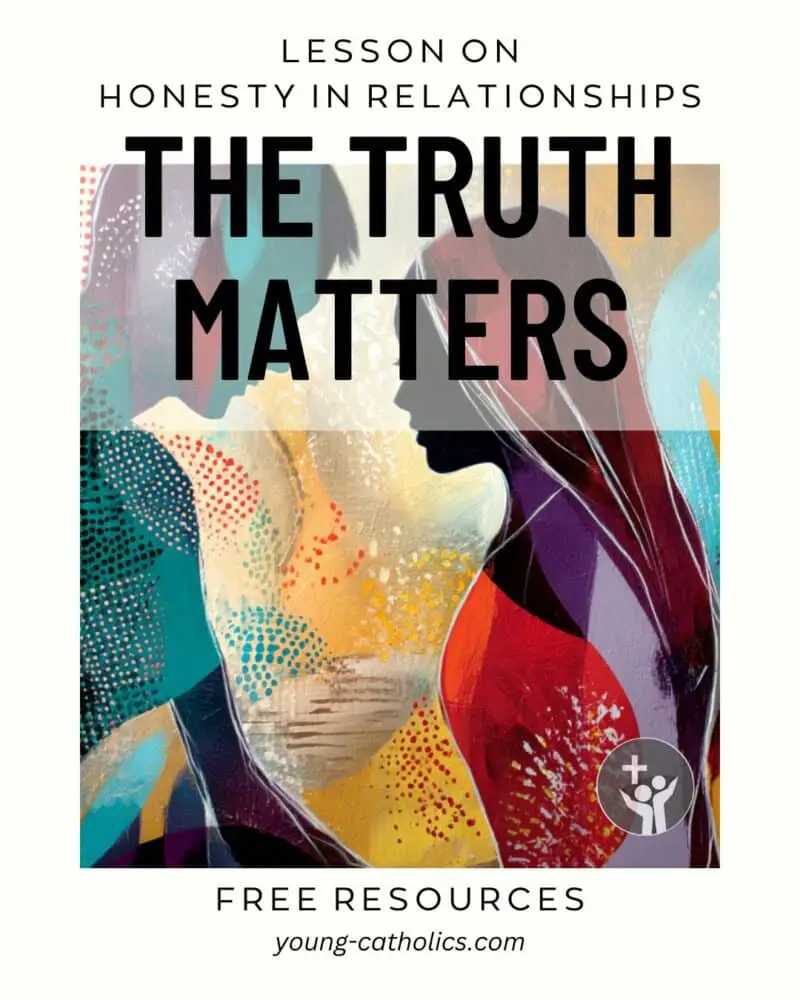
The Truth Matters (Honesty in Relationships)
This lesson plan helps youth understand the importance of honesty in friendships and dating. It is based on Matthew 5:17-37, where Jesus teaches that our words and actions should come from a heart filled with love and truth.
The goal is to show young people how honesty builds trust and respect in all relationships. Through discussion, prayer, and reflection, youth will explore how to live with integrity and treat others with care. This lesson gives them tools to grow in faith and make better choices in daily life.
Parables
- A Tale of Two Sons (The Prodigal Son)
- All In! A Lesson Plan on Risking It All
- The Savvy Steward – A Lesson Plan on Wealth
- Parable of the Talents
- Actions Speak Louder than Words
- Modern Day Version of The Parable of the Unforgiving Servant
- The Parable of the Ten Virgins
- Party Planning in Paradise
- The Good Samaritan
- Latest and Greatest (The Rich Fool)
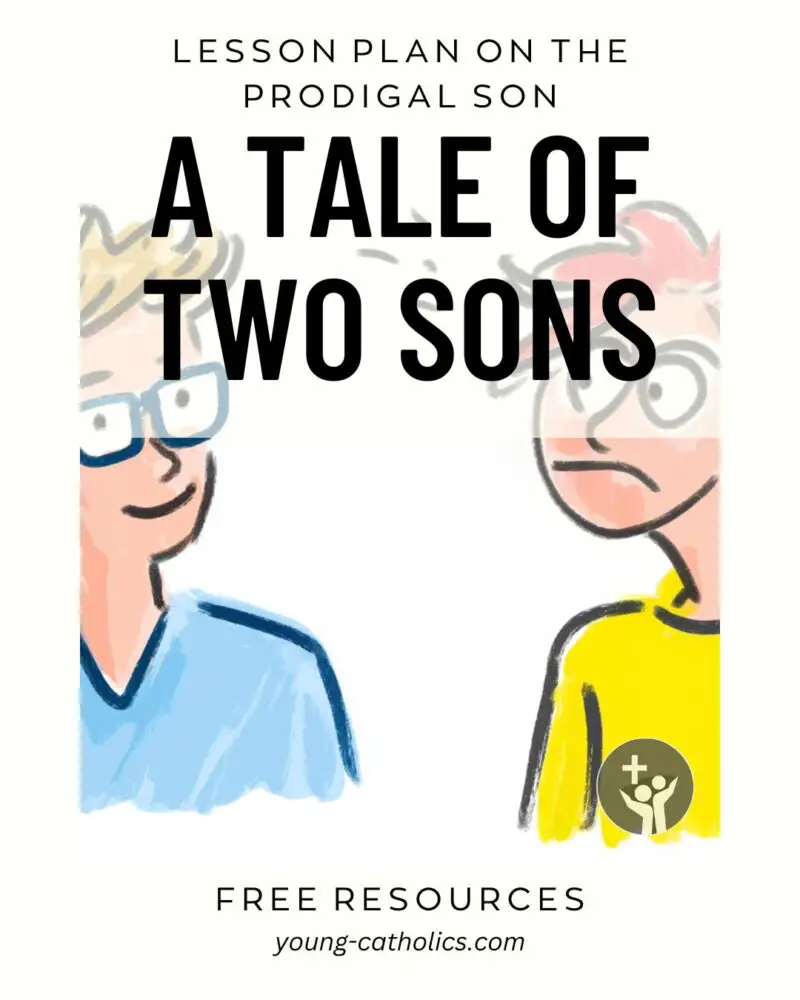
A Tale of Two Sons (The Prodigal Son)
The “Prodigal Son” lesson plan teaches youth about God’s mercy, forgiveness, and love. It is based on Luke 15:1-3, 11-32. Through this parable, young people learn how we can make mistakes and drift away from God, but He is always ready to welcome us back. The lesson helps them understand that God’s love is not something we earn but something freely given.
This plan also explores the dangers of selfishness and pride through the older brother’s actions. It reminds youth that obeying God should come from love, not from trying to earn rewards. By reflecting on both sons, youth are encouraged to seek God’s mercy and live in loving relationship with Him.

All In! A Lesson Plan on Risking It All
The “All In” lesson plan helps youth think about what they value most and what they are willing to give up to follow Jesus. It is based on Matthew 13:44-52, where Jesus tells the parables of the treasure in the field and the pearl of great price. These stories teach that the Kingdom of God is so valuable, it is worth giving up everything to gain it.
This lesson encourages youth to reflect on what might be holding them back from fully following Jesus. It invites them to imagine letting go of their personal treasures to receive something greater from God. The goal is to help them see that true joy comes from trusting God and putting Him first in their lives.

The Savvy Steward – A Lesson Plan on Wealth
This lesson plan based on the parable of the dishonest steward helps youth understand what Jesus teaches about money and success.
It challenges them to think beyond material wealth and focus on what truly matters—faith, generosity, and trust in God. Through scripture, discussion, and activities, youth will see that wealth is not just about money but about using what we have wisely.
This lesson benefits youth by encouraging them to see wealth as a tool, not a goal. It helps them recognize the dangers of greed and the importance of generosity.
They will learn that true success comes from serving God, not from chasing money and status. By reflecting on Jesus’ teachings, they will gain a healthier perspective on wealth and how to use it in a way that honors God.
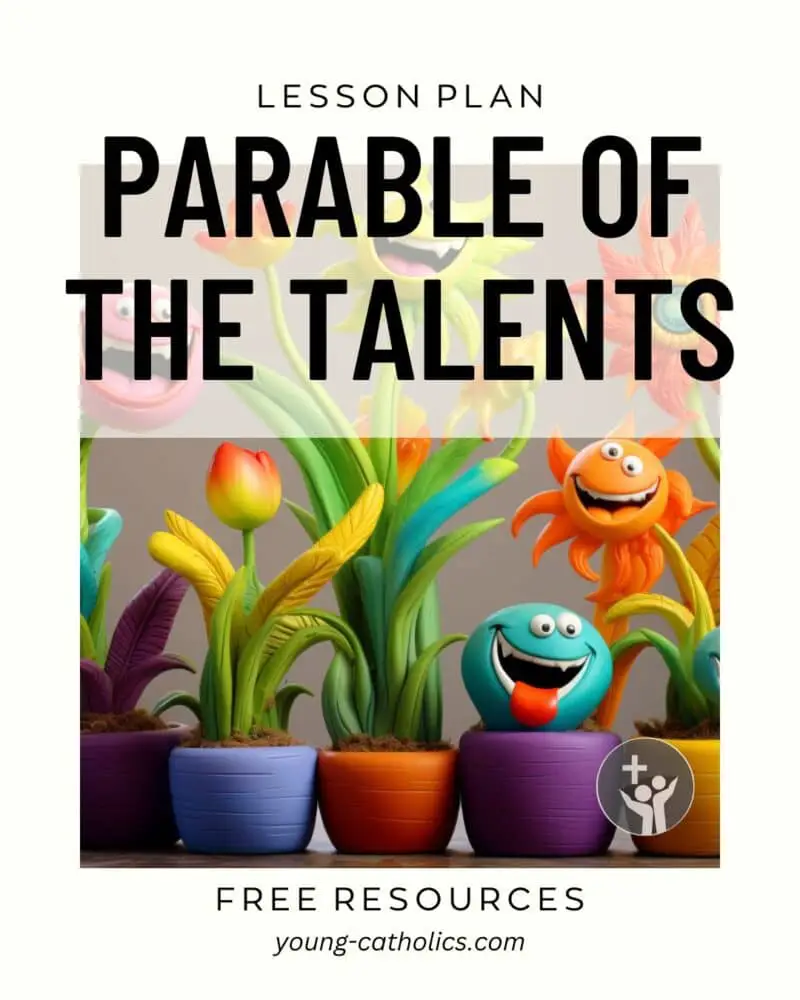
Parable of the Talents
This lesson plan is based on the Parable of the Talents from Matthew 25:14-30. It helps youth reflect on the gifts and talents God has given them. The goal is to show that these gifts are not meant to be hidden or used only for personal gain, but to serve others and build God’s Kingdom.
Through prayer, discussion, and activities, youth are encouraged to see their talents as part of God’s plan. They are challenged to pick one gift and find a way to use it for God’s glory. The lesson ends with a prayer of surrender, asking God to guide their use of these gifts.
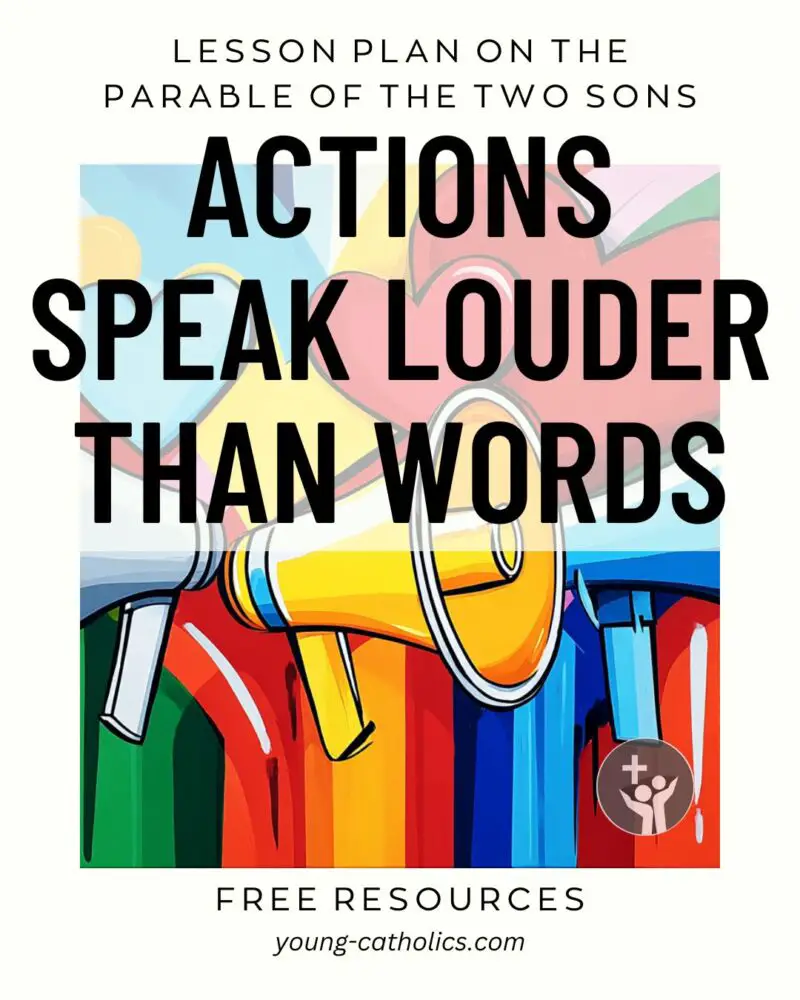
Actions Speak Louder than Words
This lesson plan, based on Matthew 21:28-32, teaches youth that actions matter more than words. Using games, role-play, and discussion, it helps them understand the importance of keeping promises and following through. The parable of the two sons shows that even if we say no at first, it’s better to change and do what is right.
Youth are encouraged to reflect on times when they or others failed to act and how that felt. They learn that real faith is shown through what we do, not just what we say. The challenge to choose one action for the week helps them apply the message. A prayer rock with one word serves as a daily reminder.
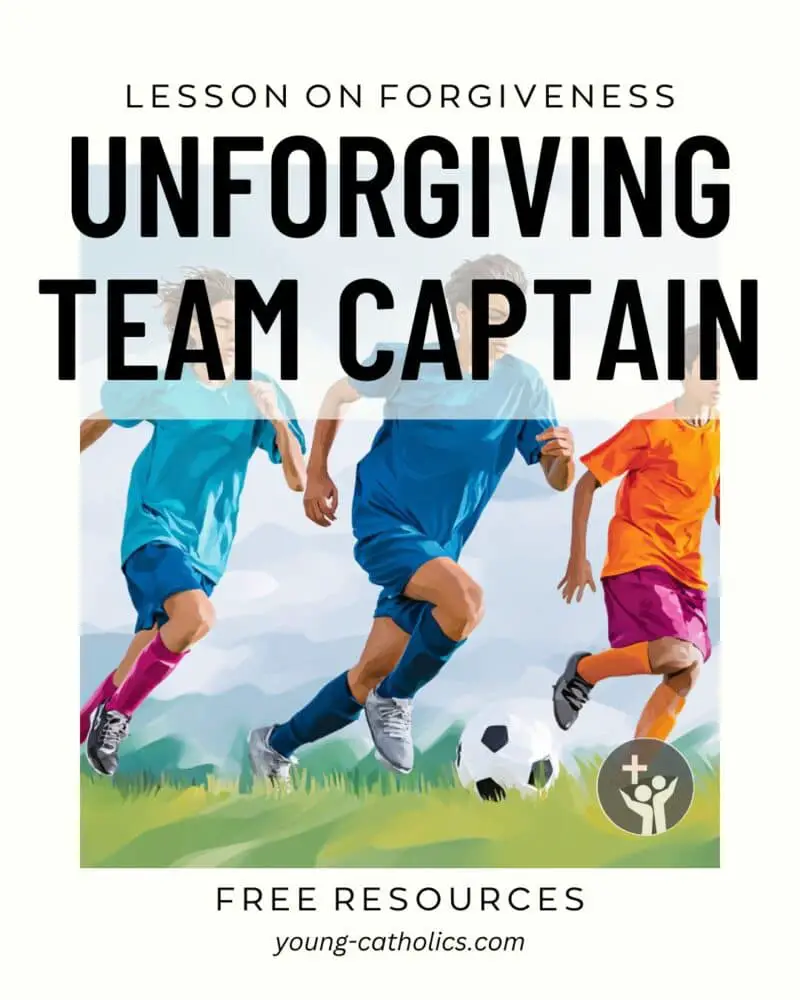
Modern Day Version of The Parable of the Unforgiving Servant
This lesson plan uses a modern story about a soccer player to help youth understand the Parable of the Unforgiving Servant (Matthew 18:21-35). It shows how important forgiveness is in our lives and how we should show others the same mercy we have received. Mike, a team captain, is forgiven by his coach but refuses to forgive a teammate, showing the same failure as the servant in the parable.
The goal is to help teens see how God forgives us and how we are called to forgive others. Through discussion and reflection, youth are invited to think about times when they’ve needed forgiveness or struggled to forgive someone else. The challenge asks them to pray about any hurt they are holding and to ask God for the grace to forgive.

The Parable of the Ten Virgins
This lesson plan on the Parable of the Ten Virgins (Matthew 25:1-13) teaches youth the importance of being prepared. Using a relatable story about being picked up late after a trip, it helps students understand how it feels to be left behind and connects that feeling to the message of the parable. The lesson emphasizes that preparation is personal—no one else can do it for you.
Youth are invited to reflect on how they can be spiritually and practically ready for Jesus and life’s unexpected events. Through discussion, they explore what it means to stay alert and take responsibility for their faith and actions. A simple weekly challenge and a closing prayer help them put the lesson into practice in everyday life.

Party Planning in Paradise
This lesson plan teaches youth about the Parable of the Wedding Feast (Matthew 22:1-14). It helps them understand how God invites us into a relationship with Him, much like a king inviting guests to a great celebration. The lesson shows that we must respond to this invitation and be prepared, not just say yes and then ignore what’s expected of us.
Through games, discussion, and reflection, students explore how daily choices affect their spiritual life. They learn that going to Mass and preparing for it are ways to accept God’s invitation. The challenge encourages them to take extra steps to celebrate the Mass more fully, turning it into a joyful event shared with others.
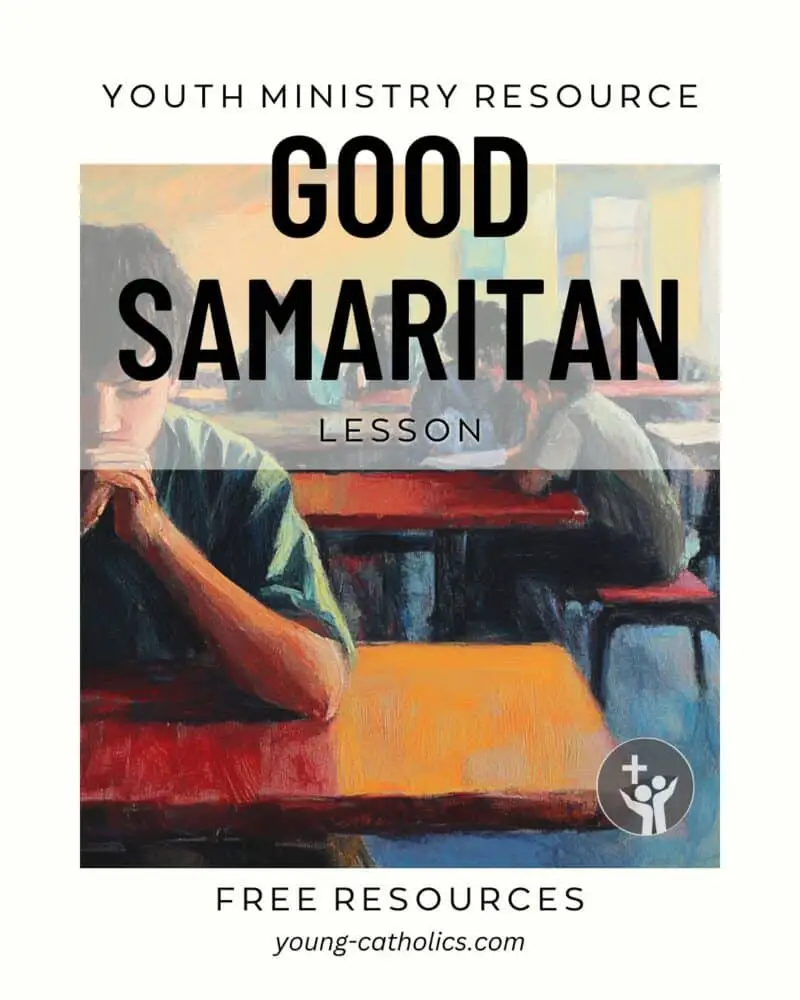
The Good Samaritan
This lesson on the Good Samaritan helps youth understand what it means to truly “love your neighbor.” Through Jesus’ parable, they explore the importance of showing mercy, kindness, and care to others, even when it feels challenging. The story teaches that everyone—no matter who they are—is our neighbor. It challenges teens to look beyond differences and see others with compassion, just as the Samaritan did.
By engaging in discussion, activities, and reflection, youth are encouraged to notice those around them who may feel ignored or left out. They’ll discover that being a Good Samaritan doesn’t require big, dramatic actions. Small, simple acts of kindness can have a huge impact. Jesus’ call to “Go and do likewise” reminds them that loving their neighbor is a daily choice and a real way to live out their faith.
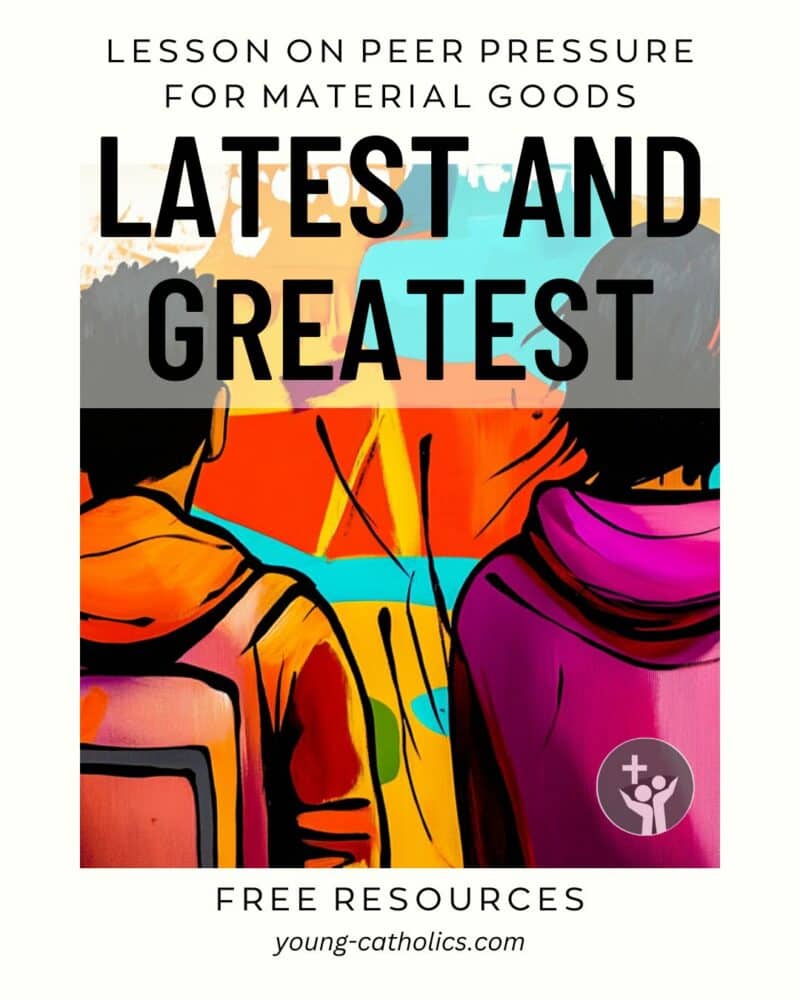
Latest and Greatest (The Rich Fool)
This lesson plan on peer pressure for the latest material goods helps youth understand the pressures they face to keep up with trends and possessions. Using Luke 12:13-21, the lesson explores Jesus’ teaching that life is not about what we own but about our relationship with God and others.
Youth will reflect on the pressure to have the latest things and how it affects their identity and faith. They will learn practical ways to handle these pressures, embrace gratitude, and focus on what truly matters. This lesson helps young people grow in confidence, strengthen their faith, and find joy beyond material possessions.
Trials and Tribulations
- Scary Stuff (The Second Coming)
- Unwelcome (Rejection)
- Superpowers (Courage)
- Have No Anxiety (Trusting God)
- Trust in Jesus: The Way, The Truth, The Life
- What Are You Afraid Of?
- Overcoming Fears: Finding Strength in Jesus’ Resurrection
- Living Love (Joy vs Happiness)
- Do Not Be Afraid
- Rescue Me! (Hardship)
- Peer Pressure and Faith
- Finding Peace in Chaos
- Turning Points and New Beginnings
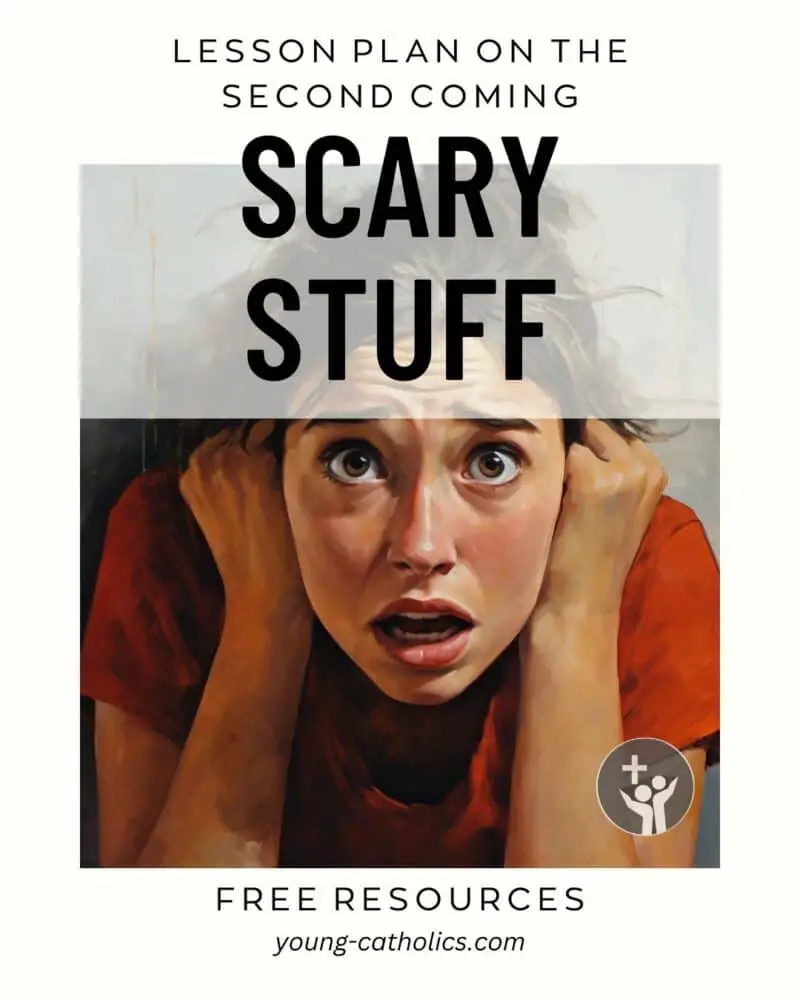
Scary Stuff (The Second Coming)
This lesson plan helps youth understand the Second Coming of Jesus through the Gospel of Luke 21:25-28, 34-36. It teaches that Jesus will return in glory, not to bring fear, but to offer hope and redemption. Youth are reminded to stay alert and live each day with faith, love, and purpose.
The lesson shows that being ready for Jesus means staying close to Him now through prayer, good choices, and the sacraments. It also helps youth see that the Second Coming is part of God’s plan to bring peace and justice to the world. The goal is to live faithfully today while waiting with hope for His return.
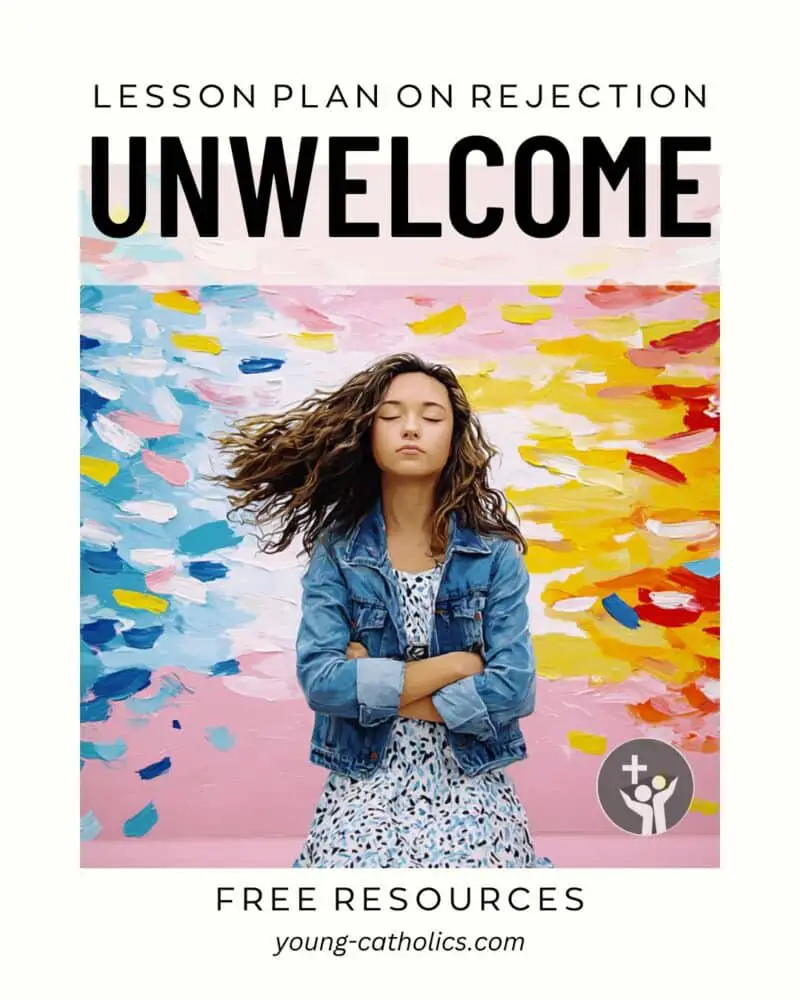
Unwelcome (Rejection)
This lesson plan on rejection helps teens understand that even Jesus faced rejection, as shown in Mark 6:1-6. He was rejected in his hometown by people who knew him. This shows that rejection does not mean failure. It teaches teens that their worth does not depend on others’ opinions.
The lesson encourages youth to keep moving forward like Jesus did. He did not let rejection stop His mission. Teens learn to focus on their own path and not dwell on those who reject them. It reminds them that they are not alone and that God understands their pain.
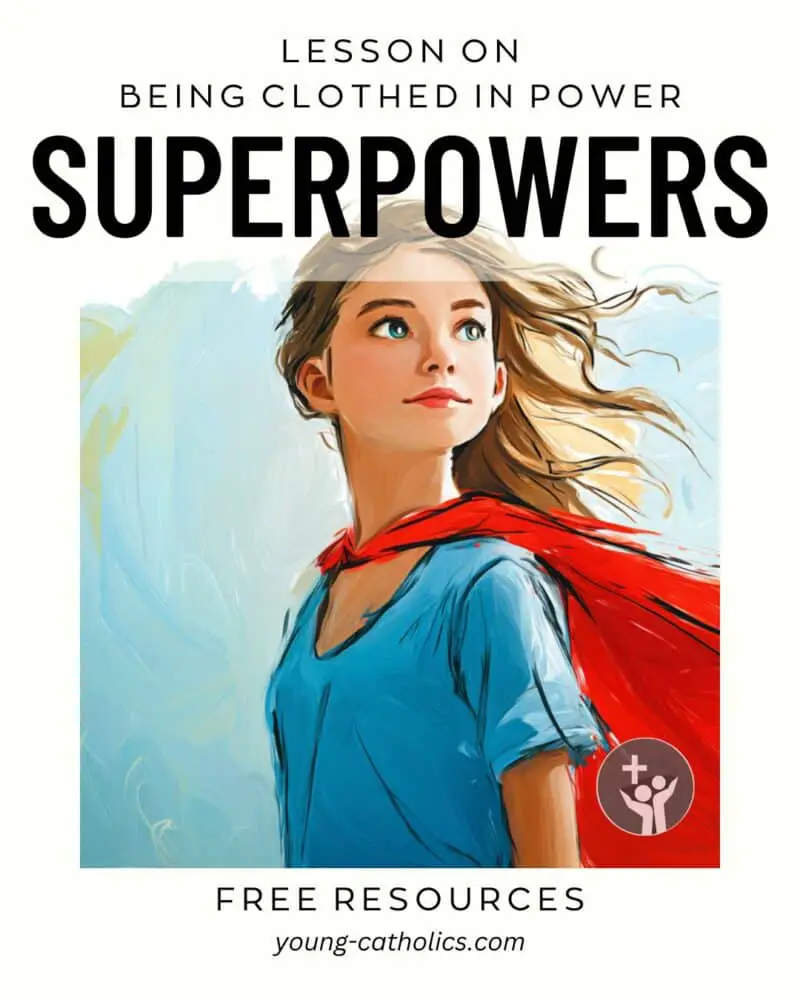
Superpowers (Courage)
This lesson plan helps youth see the Holy Spirit as their source of strength and courage. It shows that true power comes from God, not from themselves. Based on Luke 24:46-53, it teaches that Jesus promised His followers they would be “clothed with power from on high.” This promise was fulfilled at Pentecost, when the Holy Spirit gave the disciples boldness to share the Gospel.
The lesson encourages teens to rely on the Holy Spirit in their daily lives. It helps them understand that they can ask for courage when they are afraid or unsure. Through prayer and trust in God, they can face hard situations with confidence. This lesson reminds them that the Holy Spirit is always with them, giving them the power to live their faith.
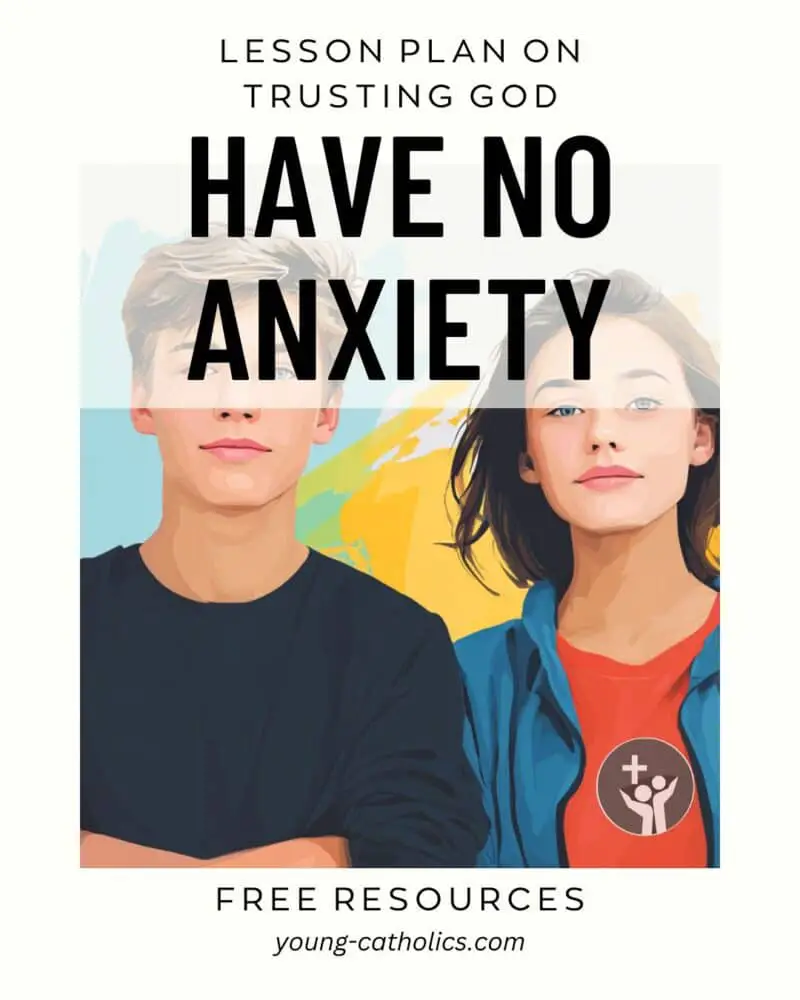
Have No Anxiety (Trusting God)
This lesson plan helps youth understand how to deal with anxiety by trusting in God. It uses Philippians 4:6-9 to show how prayer, gratitude, and faith can bring peace. The scripture reminds us to turn to God with our fears and be thankful for the good in our lives. This helps us feel calm and supported, even when life is hard.
Youth reflect on their fears and learn how thanking God can shift their focus. The lesson encourages daily habits of gratitude and prayer as ways to grow closer to God. It teaches that we don’t need to be afraid because God is always with us. When we trust in Him, we can find peace, no matter what we are facing.
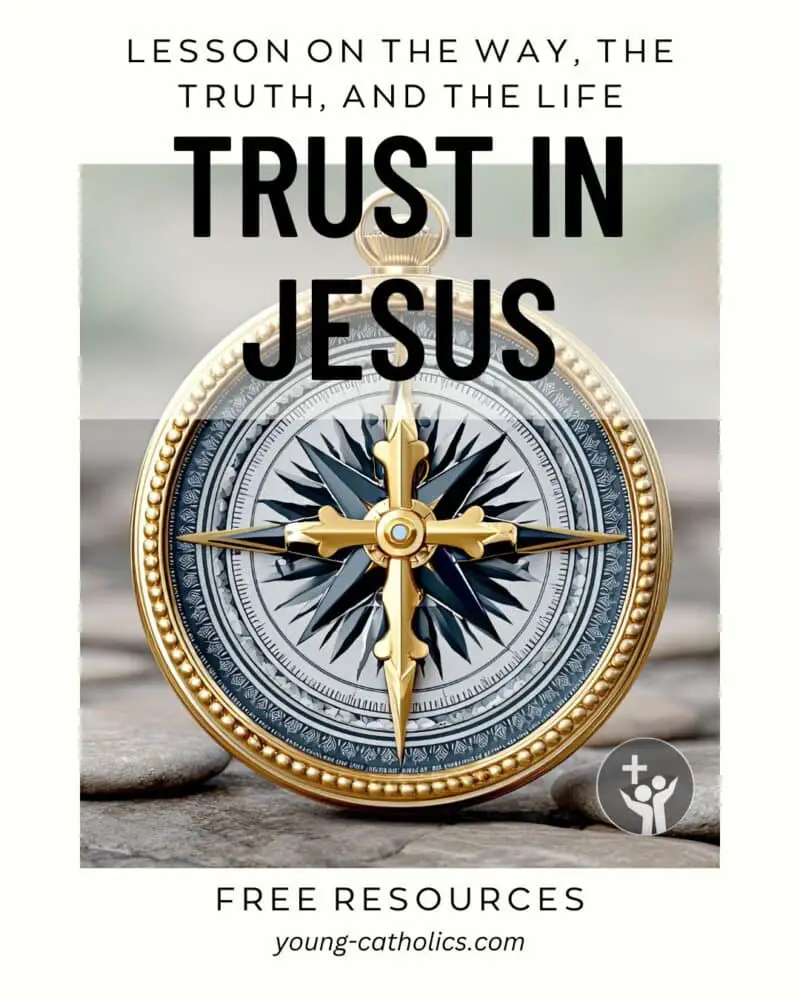
Trust in Jesus: The Way, The Truth, The Life Lesson Plan
The Trust in Jesus: the Way, the Truth, and the Life Lesson Plan helps youth understand what Jesus meant when he said, “I am the way, the truth, and the life” (John 14:6). It encourages them to trust in Jesus and follow him in their daily lives. Through discussion, reflection, and prayer, youth will see how Jesus leads them, teaches them truth, and gives them life.
This lesson is designed to strengthen faith and provide guidance for real-life struggles. It helps youth recognize that Jesus is always with them, even in times of doubt or uncertainty. By applying his teachings, they can make better choices and grow in their relationship with him.
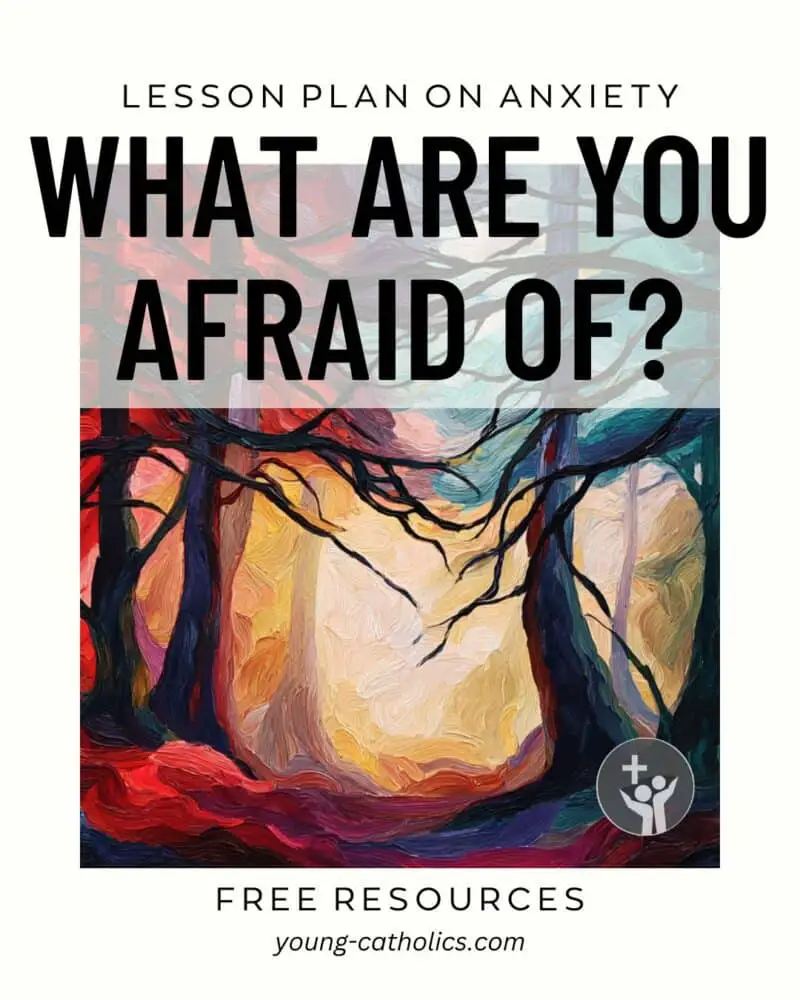
What Are You Afraid Of?
This lesson plan helps youth see how faith in Jesus can bring peace during times of fear. It begins with a fun game that involves facing small fears, leading to a deeper discussion about real fears in life. Youth learn they are not alone in their worries and that it’s okay to share their fears.
The key scripture is Mark 4:35-41, where Jesus calms a storm and brings peace to His frightened disciples. This story shows that Jesus is with us even in life’s storms. Youth are encouraged to trust Him, pray when afraid, and support each other. The lesson helps them grow in faith and find comfort in Jesus.
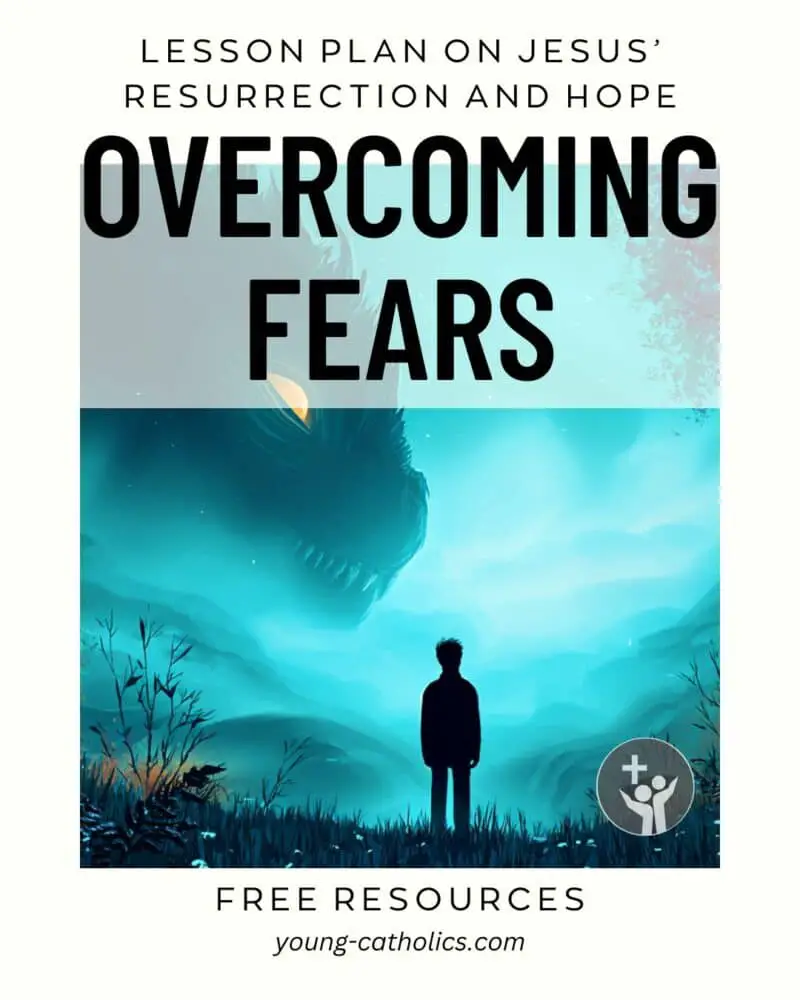
Overcoming Fears: Finding Strength in Jesus’ Resurrection
This lesson plan helps youth understand how Jesus’ death and resurrection give us strength to overcome fear. It starts with a ghost story to show how fear feels, then shifts to the hope found in the Gospel. The scripture passage is Luke 24:35-48, where Jesus appears to His disciples and brings peace.
The lesson teaches that Jesus is not a ghost but truly alive. He brings comfort and stays with us, especially in the Eucharist. Youth reflect on how the Resurrection changes fear into courage. They are invited to pray daily and trust Jesus in their struggles.
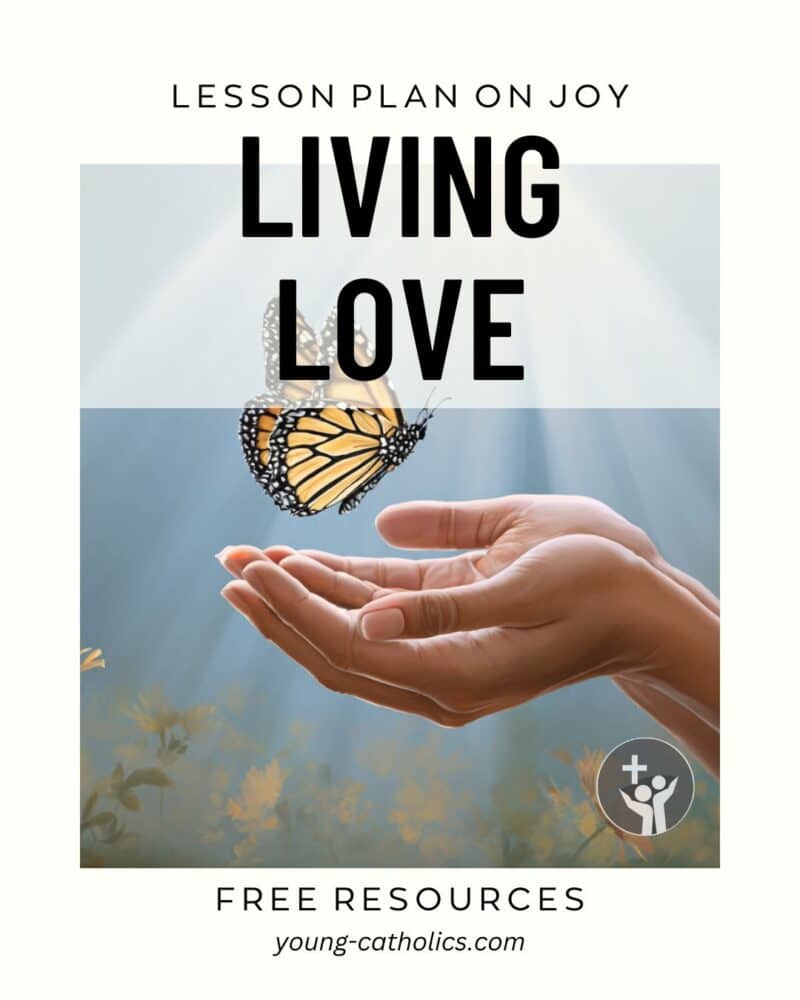
Living Love (Joy vs Happiness)
This lesson plan on joy helps youth understand the deep peace that comes from trusting in God, even during hard times. Based on John 15:9-17, it explores Jesus’ command to love one another and His promise that true joy comes from living in that love. Jesus speaks these words during the Last Supper, knowing He is about to suffer.
The lesson helps youth see the difference between joy and happiness. Joy is lasting and comes from faith, while happiness is a short feeling that changes with our situation. Through discussion, gratitude activities, and prayer, students are invited to grow in joy by trusting Jesus, loving others, and asking the Holy Spirit for help.
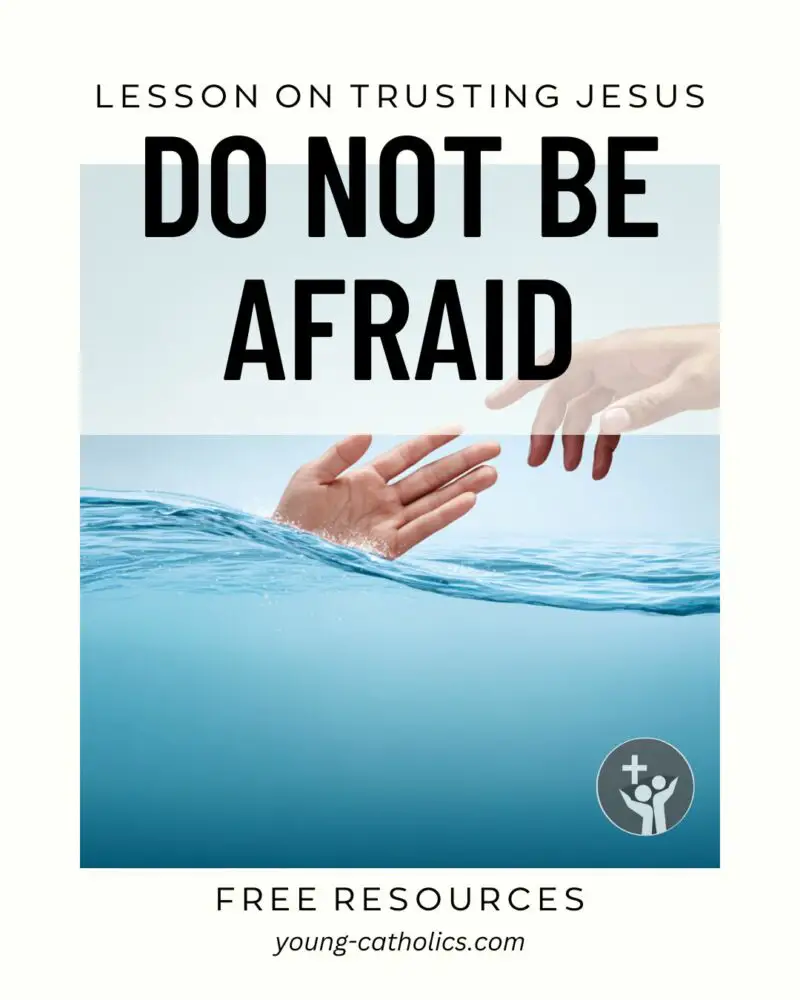
Do Not Be Afraid
This lesson plan helps youth reflect on fear and how trusting Jesus can give them peace. Using Matthew 14:22-33, where Jesus walks on water, it shows how faith can calm the storms in our lives. Youth think about their own fears and learn that Jesus is with them in difficult moments.
Through games, scripture, and guided meditation, students see that fear is normal, but we don’t have to face it alone. The lesson reminds them to pray, take small steps of faith, and picture Jesus saying, “Do not be afraid.” It helps them grow in courage and trust in God.
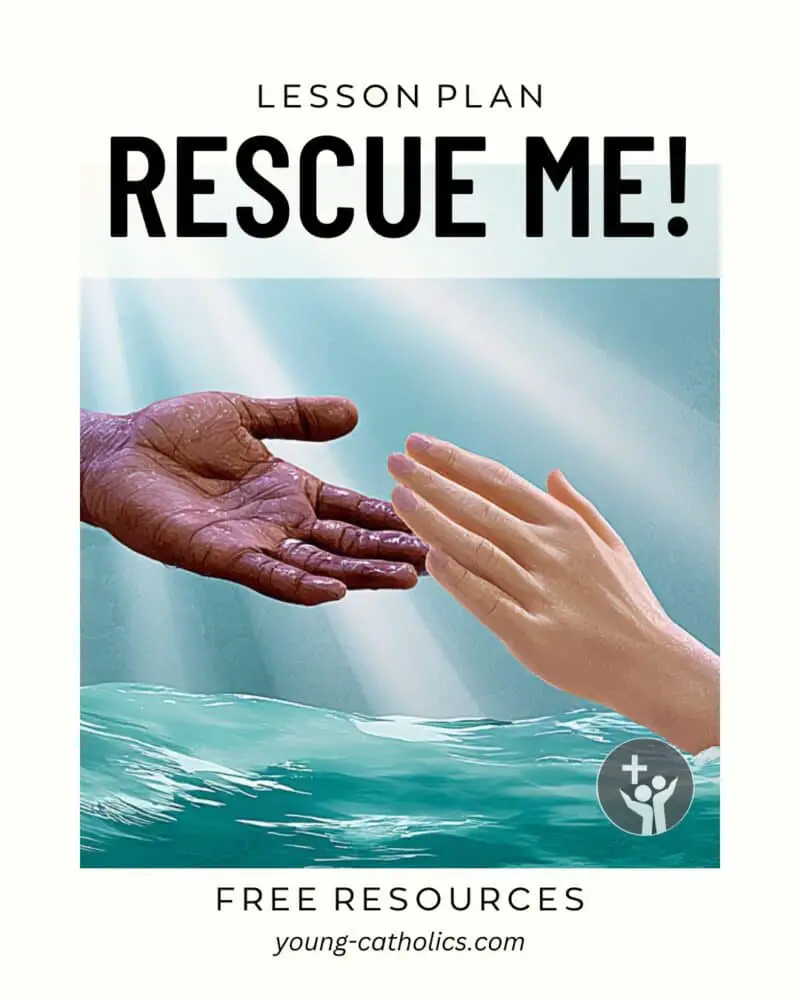
Rescue Me! (Hardship)
This lesson plan, based on Mark 5:21-43, helps youth see that Jesus is always ready to help them in hard times. It tells the story of a woman who was sick for many years and a father whose daughter was dying. Both trusted Jesus, and He rescued them. The lesson shows that we don’t have to face our problems alone.
Through games, discussion, and prayer, youth learn that faith in Jesus brings comfort and hope. They are encouraged to ask for help, support one another, and trust that Jesus is close in every struggle. This helps build their faith and reminds them that God is always with them.
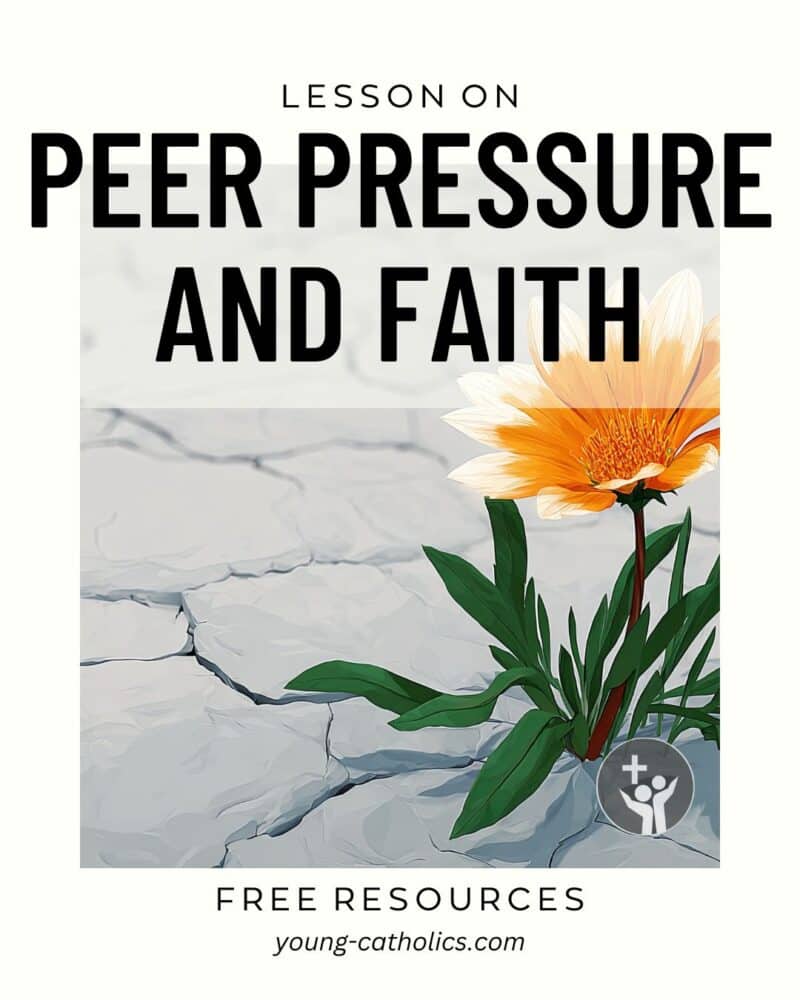
Peer Pressure and Faith
This lesson plan on peer pressure helps youth understand how following Jesus is not always easy. It explores Luke 12:49-53, where Jesus talks about how His message will cause division. Youth will see that peer pressure can make it hard to live their faith, but God gives them strength. Through discussion, activities, and prayer, they will learn how to stand firm in their beliefs.
This lesson encourages young people to make good choices, even when others pressure them to do wrong. It helps them see that they are not alone in their struggles. They will learn how the Holy Spirit gives courage and how other believers can support them. With God’s help, they can stay strong in their faith.
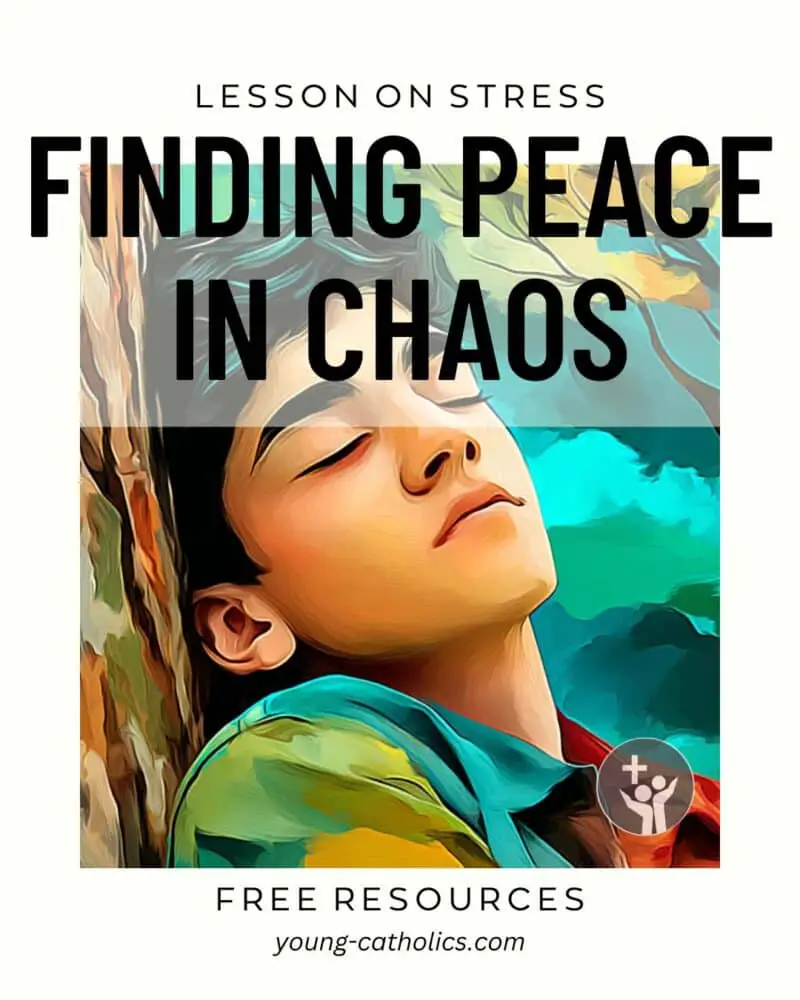
Finding Peace in Chaos
This lesson plan helps teens face fear, stress, and confusion with faith. It is based on Luke 21:5-19, where Jesus tells His followers not to be afraid, even when everything feels like it’s falling apart.
The goal is to show youth that peace is possible when they trust in Jesus. The lesson includes prayer, discussion, and activities that help young people feel seen and supported. It gives them tools to handle hard times and reminds them that they are never alone.
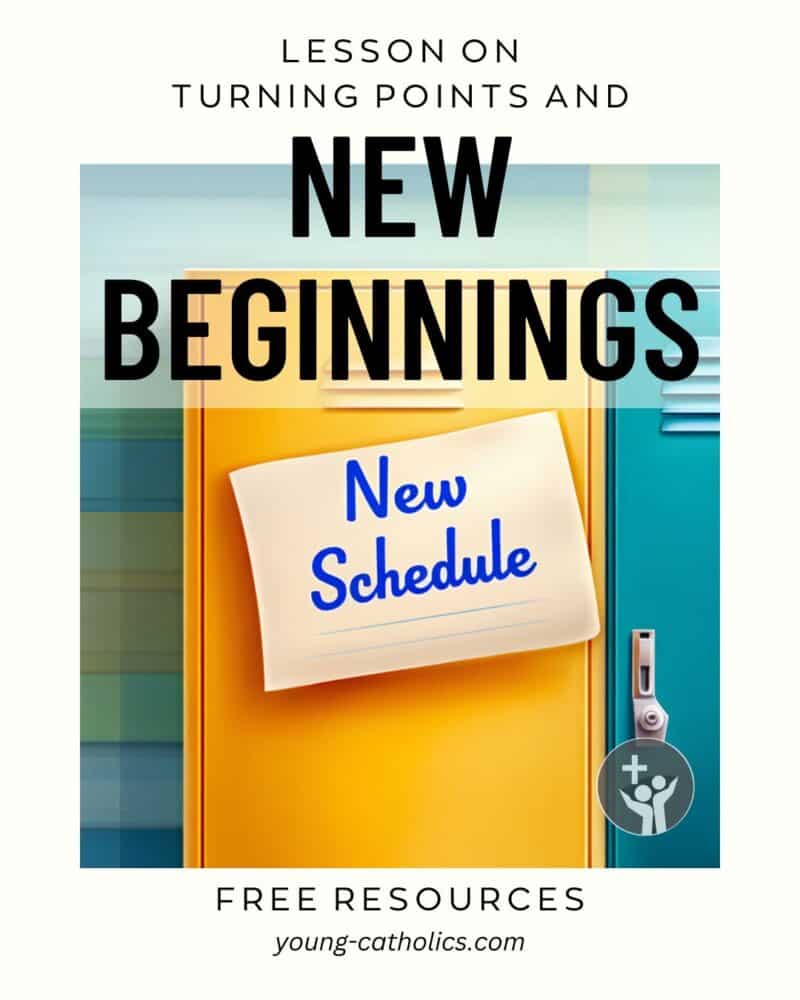
Turning Points and New Beginnings
This lesson helps youth understand how God can work through difficult times. It focuses on how Jesus began his ministry after John the Baptist was arrested. This shows that even in hard moments, God calls us to something new.
This lesson plan helps middle and high school youth see their struggles in a new way. It reminds them that life’s changes can be turning points, not dead ends. It encourages trust in God and offers hope, even when things feel uncertain.
Faith
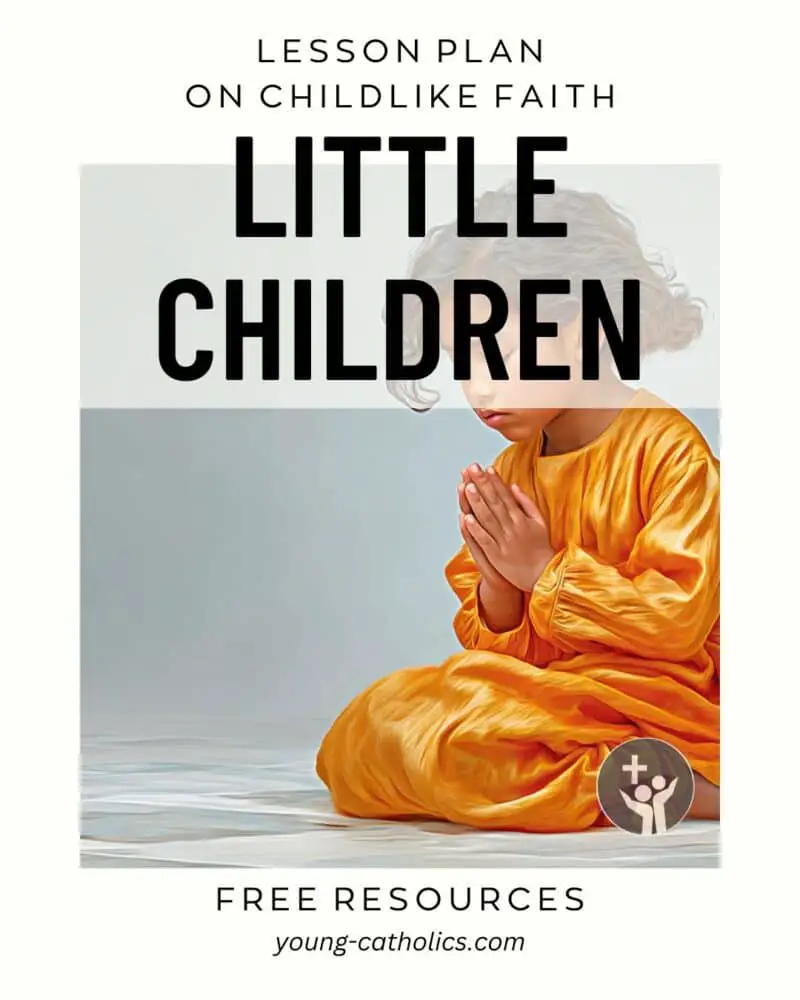
Little Children (Childlike Faith)
This lesson plan, based on Mark 10:2-16, teaches youth the value of having childlike faith. Just as children trust their parents, we are called to trust God with the same love and dependence. Through games, scripture, and reflection, youth learn that trusting God brings peace, even when life is hard or confusing.
The lesson helps youth understand that faith does not mean having all the answers. It means believing God is with them and wants what is best. It encourages prayer, honesty, and daily trust in God’s care. Youth are reminded that faith, like a child’s trust, is simple but strong.
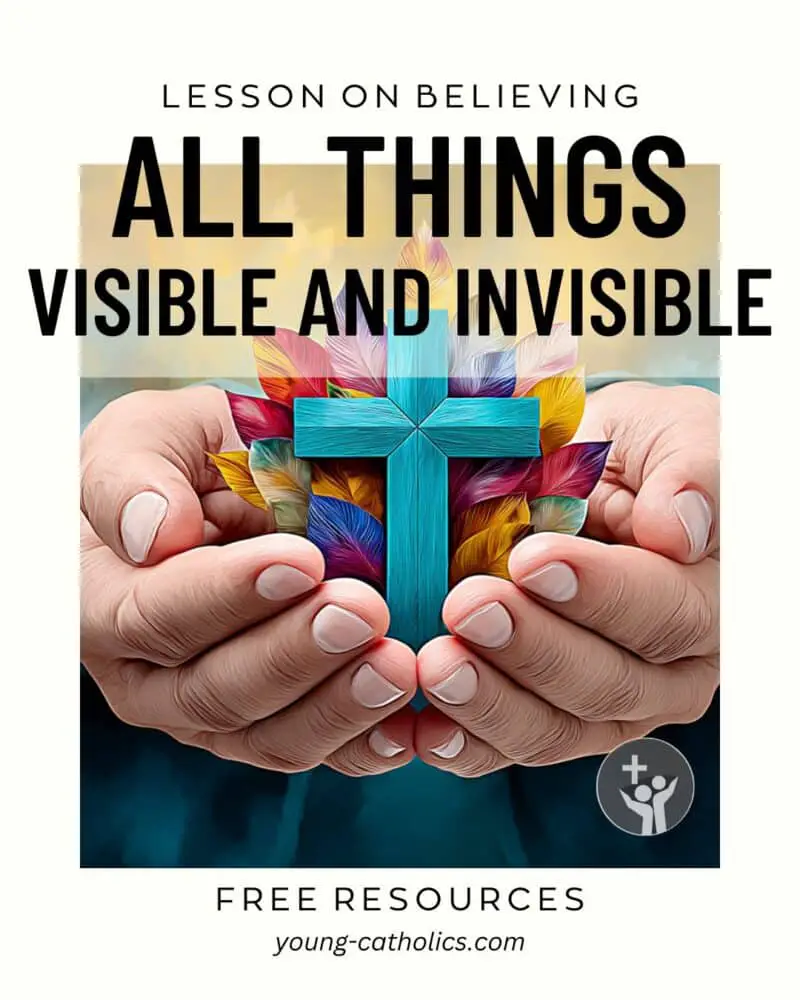
All Things Visible and Invisible
This lesson plan on believing helps youth understand that faith can include doubts and questions. It uses John 20:19-31, where Jesus appears to Thomas, to show that even close followers of Jesus sometimes struggle to believe. Jesus doesn’t judge Thomas for doubting. Instead, He lovingly gives him what he needs to believe.
Youth are encouraged to be honest with God about their doubts and to trust that He will meet them where they are. The lesson reminds them that faith grows over time and that Jesus wants to help us believe. It also teaches that our struggles can lead to stronger faith.
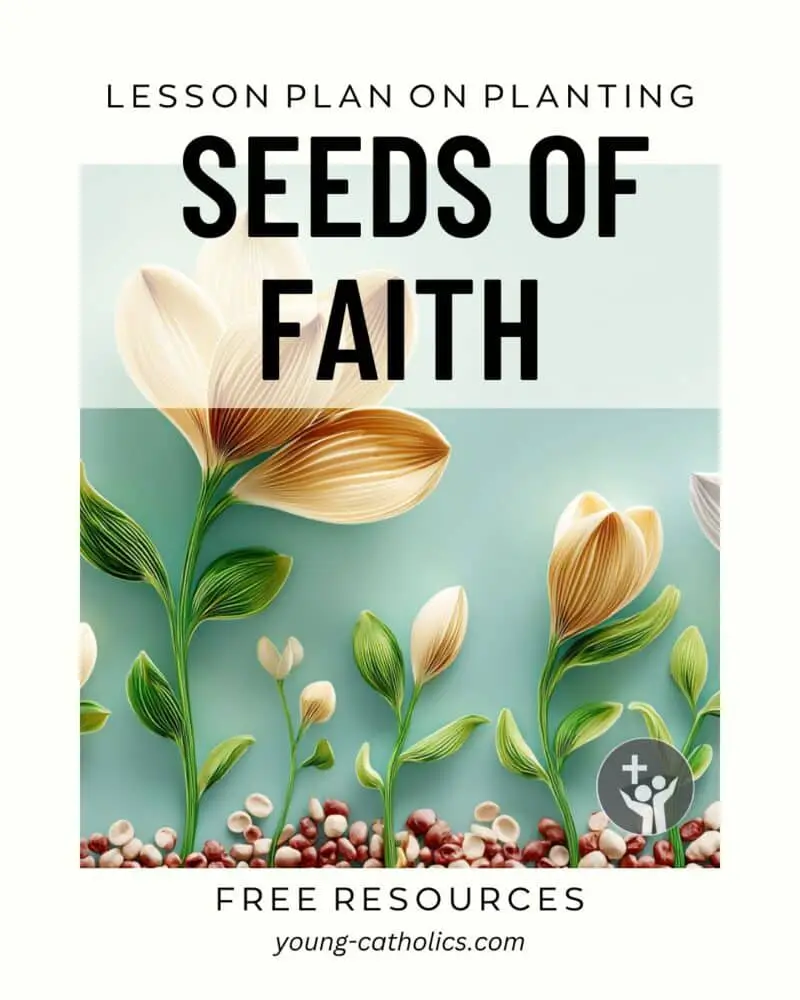
Planting Seeds of Faith
This lesson plan, based on Mark 4:26-34, helps youth learn how faith grows like a seed. Through planting seeds and guided reflection, students see how small beginnings can lead to strong and lasting faith. Just like plants need water and sunlight, faith needs prayer, Scripture, and trust in God to grow.
The lesson shows that faith takes time and care. It teaches that even when we don’t fully understand how God works, we can still trust Him. Youth are encouraged to step out of their comfort zones and take small daily steps to grow closer to God.

Are There Pets In Heaven?
The Are There Pets In Heaven? Lesson Plan on Resurrection helps youth explore what Jesus teaches about eternal life. Many people wonder if they will see their pets in heaven. This lesson uses Luke 20:27-38, where Jesus explains that heaven is different from life on earth. It encourages youth to focus on the joy of being with God rather than their personal expectations.
This lesson helps young people grow in faith by thinking deeply about the resurrection. It challenges them to trust in God’s plan, even when they don’t have all the answers. Through discussion and prayer, they learn that heaven will bring complete happiness because God will be their everything.

Seeing Salvation
This lesson plan, based on Luke 2:22-40, helps youth learn how to recognize God in everyday life. It uses the story of Simeon and Anna, who saw Jesus as a baby and knew He was the Savior. Their faith and patience remind us that God often shows up in small, quiet moments.
Through games, scripture, and reflection, youth are encouraged to notice where God might be at work in their own lives. The lesson teaches that recognizing God takes patience, prayer, and an open heart. It helps young people grow in faith by becoming more aware of God’s presence around them.

Where Is God?
The “Where Is God?” lesson plan helps youth understand how Jesus is always with us, even when we cannot see Him. Based on Matthew 28:16-20, it shows that God’s presence can be felt in prayer, the Eucharist, Scripture, and everyday life. The lesson uses a fun air experiment to help youth think about unseen things that are still real.
Youth are encouraged to notice God in small daily moments and practice gratitude as a way to grow closer to Him. Through prayer, journaling, and reflection, they learn how to build a stronger relationship with Jesus. This lesson reminds them that they are never alone—God is with them always.
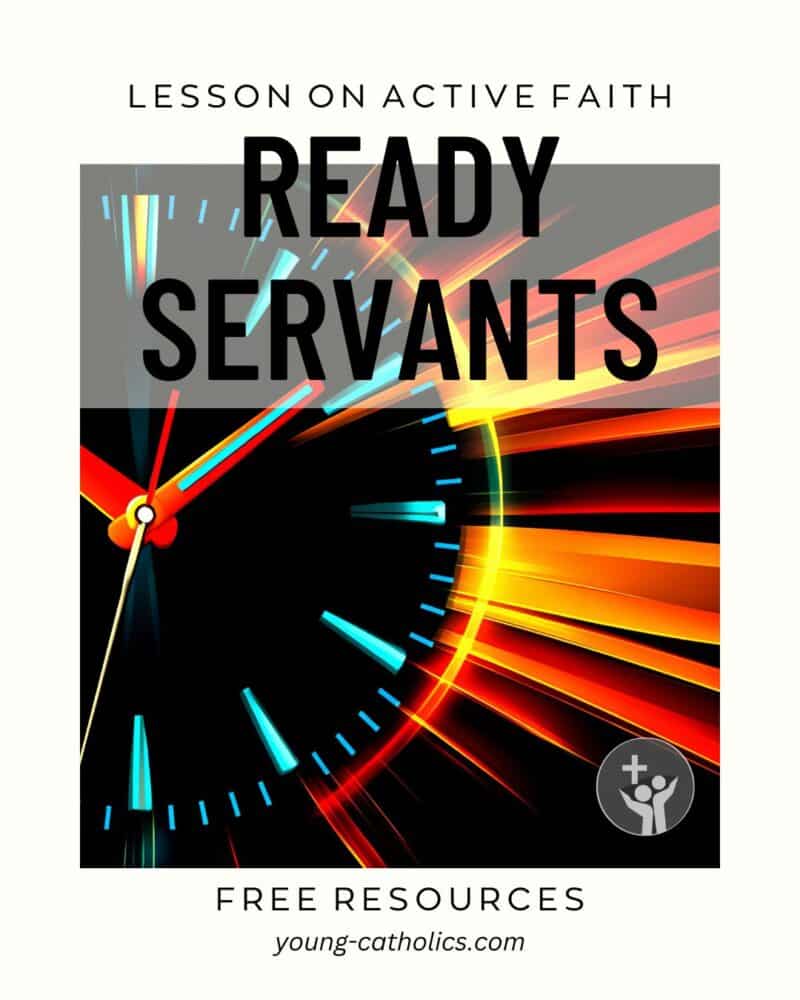
Ready Servants: Lesson Plan on Active Faith
This lesson plan helps youth understand why staying active in their faith is important. Based on Luke 12:32-48, it teaches that Jesus calls us to be ready and not become lazy in our spiritual lives. Faith is not just about believing—it is about making daily choices that bring us closer to God. The lesson encourages youth to recognize distractions, take small steps to grow in faith, and stay connected to Jesus.
Through fun activities, discussion, and reflection, youth will see how faith is something to live out every day. This lesson helps them build good habits like prayer, kindness, and service. It challenges them to be faithful, not just when it’s easy, but all the time. When young people develop an active faith, they grow stronger in their relationship with God and are better prepared for life’s challenges. This lesson gives them real ways to stay engaged and committed in their faith journey.
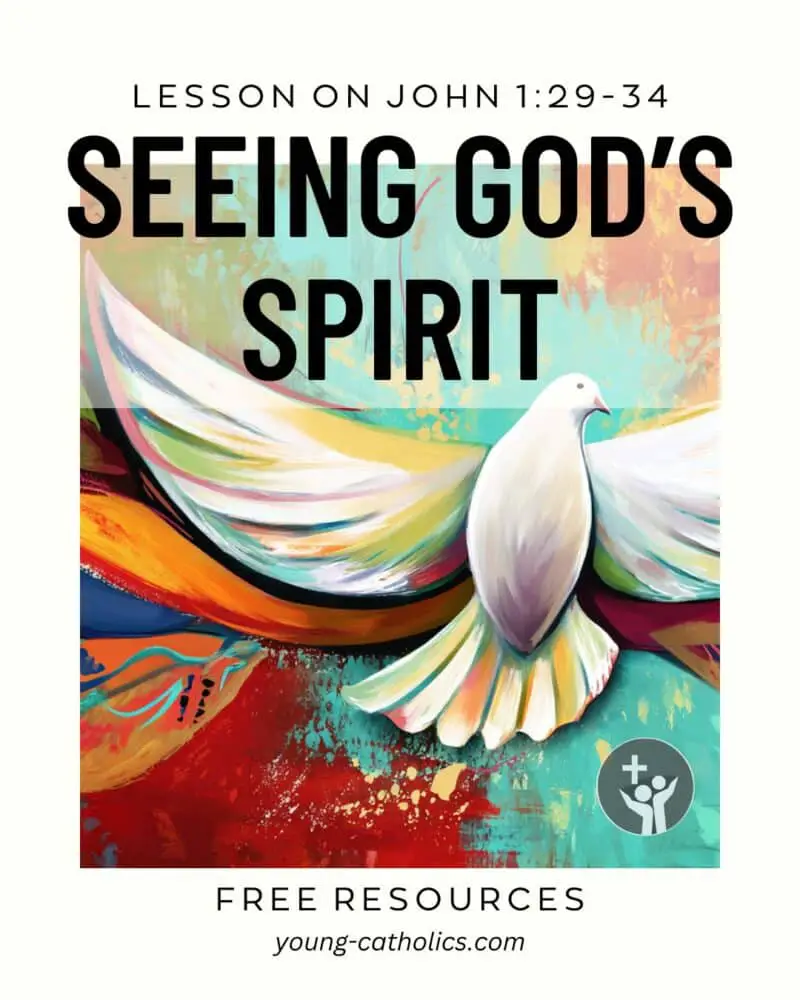
Seeing God’s Spirit
This lesson plan helps youth learn how to notice the Holy Spirit in their everyday lives. It uses the story of John the Baptist from John 1:29-34 to show how God’s Spirit is real and active, even when we can’t see it clearly.
This lesson invites students to slow down, reflect, and look for signs of love, kindness, and truth. It helps them connect their faith with real life and gives them simple tools to talk about where they see God working. Youth are encouraged to be more aware, more trusting, and more ready to share what they see.
The Paschal Mystery
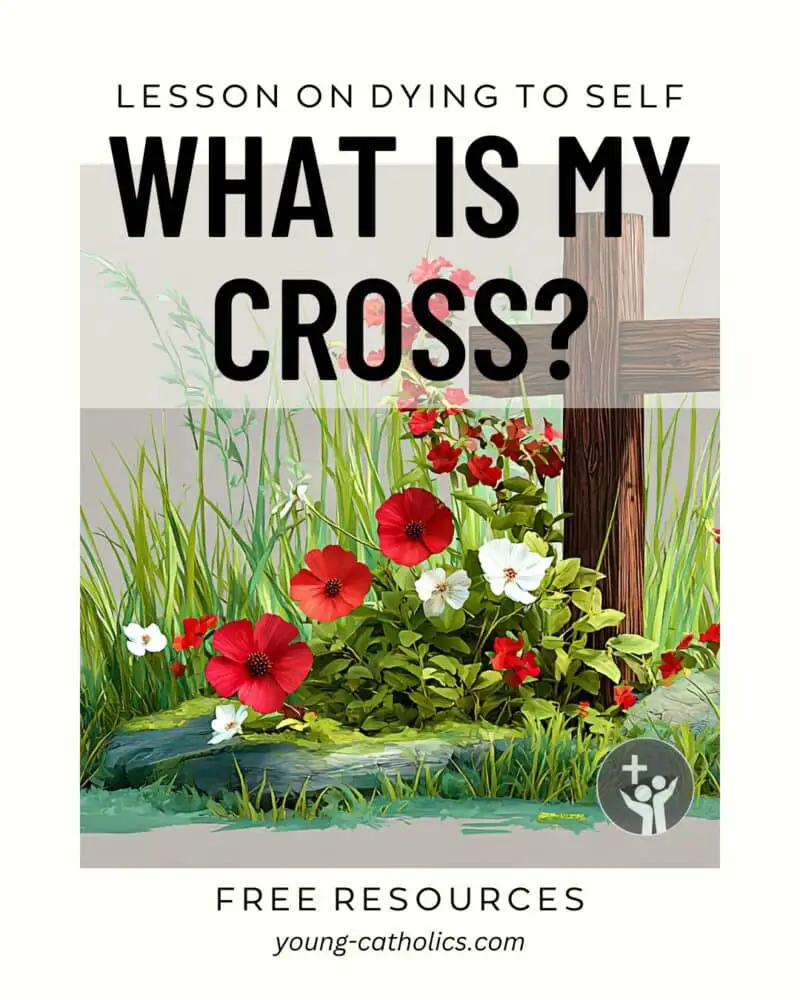
What Is My Cross?
The “What Is My Cross?” lesson plan helps teens understand what it means to “take up your cross” as Jesus teaches in Matthew 16:21-27. It makes this idea practical by focusing on small, everyday sacrifices like helping others, avoiding gossip, or staying patient. Teens learn that following Jesus isn’t just about big dramatic moments—it’s about daily choices to love and serve others.
Through Scripture, discussion, and a simple cross-making activity, youth reflect on how small acts of love and self-control can be part of living their faith. The lesson shows that carrying a cross can mean choosing kindness over comfort. It reminds teens that Jesus understands their struggles and walks with them.
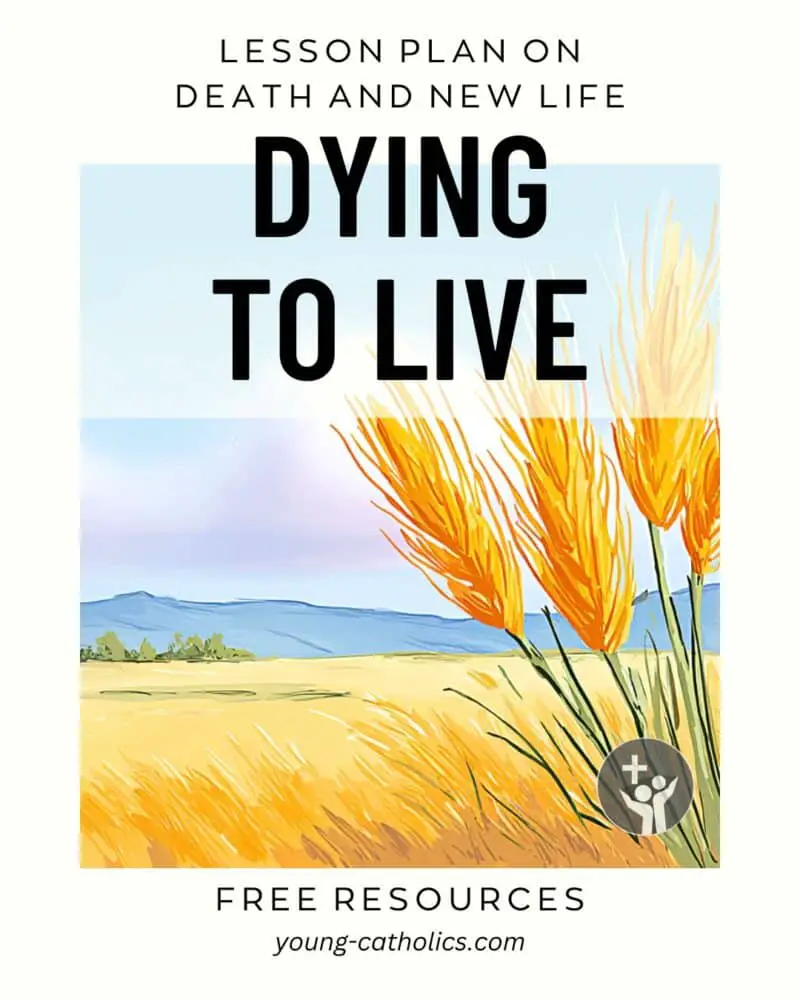
Dying to Live
The “Dying to Live” lesson plan helps youth explore how letting go can lead to new life. It is based on John 12:20-33, where Jesus says a grain of wheat must die to bear fruit. This lesson shows that real growth often comes through struggle, change, or loss. Youth reflect on how they can “die to self” in small ways—like giving up a bad habit or letting go of control—to follow Jesus more fully.
Through scripture, discussion, and a hands-on Life Line activity, students connect this spiritual idea to real-life experiences. They learn that difficult moments can bring renewal and draw them closer to God. The lesson encourages youth to trust that God can bring good out of their sacrifices.
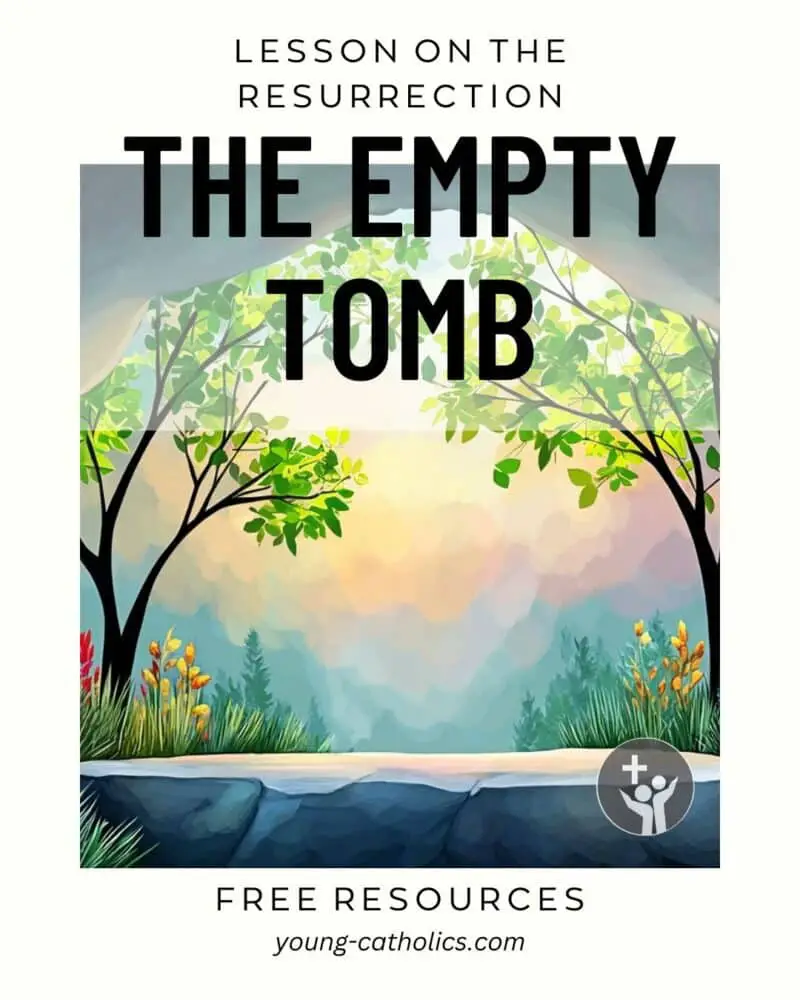
The Empty Tomb
This lesson plan helps youth reflect on the resurrection story from Mark 16:1-8, as read at the Easter Vigil Mass. It invites them to imagine being one of Jesus’ followers, feeling the sorrow of His death and the shock of finding the empty tomb. The guided reflection and small group questions help teens connect personally with the hope and joy of the Resurrection.
The lesson teaches that faith can grow through fear, doubt, and amazement. Youth are challenged to share their faith and live with the joy of knowing Jesus is alive. Through quiet prayer and discussion, they learn that the Resurrection is not just a past event—it shapes how we live and love today.
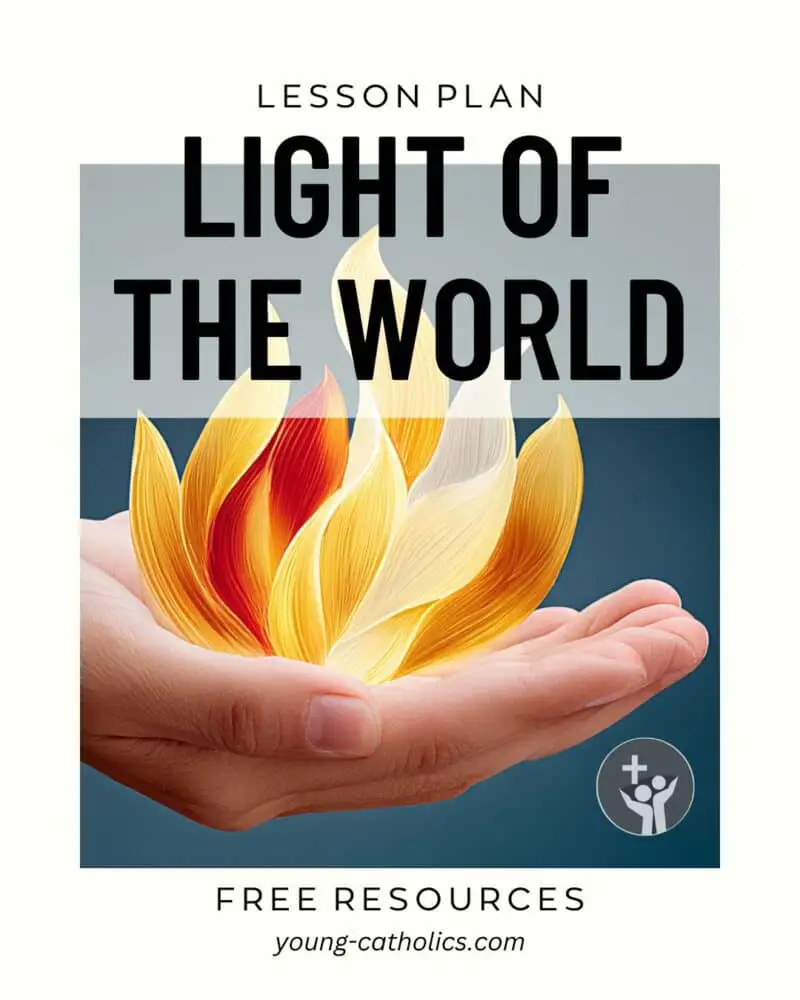
Illuminate My World Jesus
This “Light of the World” lesson plan helps youth understand how Jesus reveals God’s love and truth. Using John 3:14-21, it teaches that Jesus brings light into our lives, showing us who God is and how to trust Him. The opening activity in darkness helps participants experience how Jesus helps us see more clearly.
Through discussion and reflection, youth explore how to live in Jesus’s light, make good choices, and share His love with others. The lesson invites them to trust God in difficult moments and to bring hope to those in darkness.
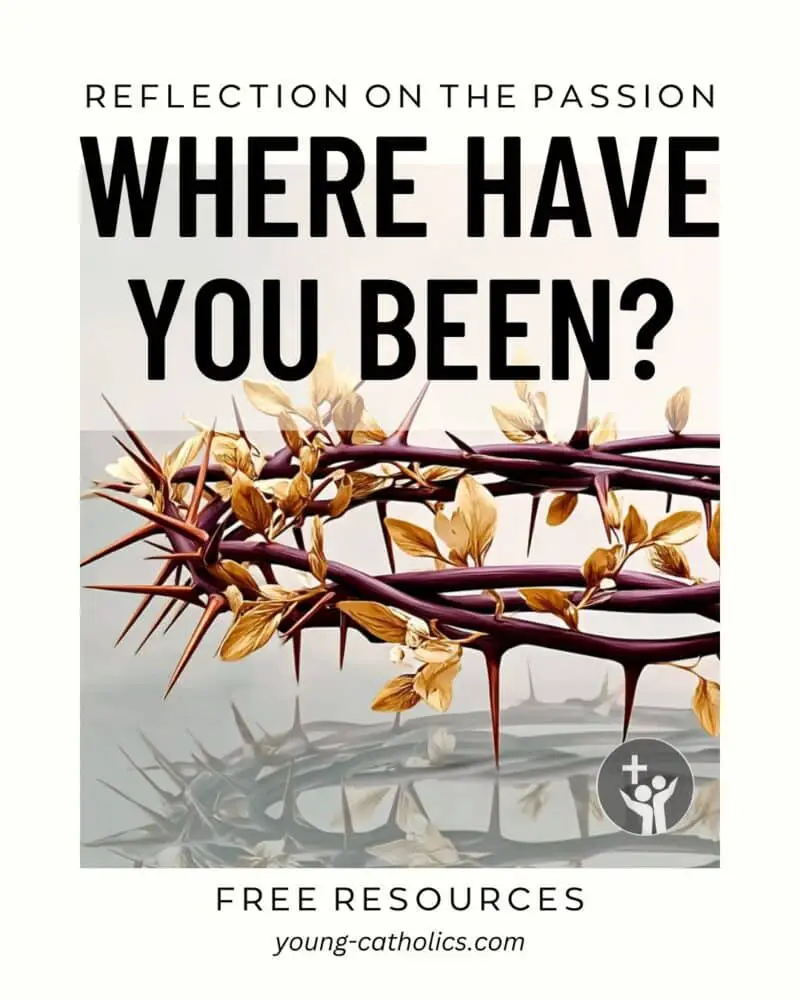
Where Have You Been? (The Passion of Jesus Christ)
This reflection on the Passion of Jesus lesson plan helps youth enter into the story of Jesus’ suffering and death from Mark 14–15. It focuses on the moment when Jesus is sentenced and shows how He was abandoned, falsely accused, and mistreated. Youth are guided to imagine themselves in the story, reflecting on their own fears, silence, and choices.
The purpose is to help young people understand the depth of Jesus’ love and the cost of His sacrifice. Through prayer and discussion, they learn that walking with Jesus means standing up for what is right, even when it’s hard. This reflection helps them grow in courage and compassion as followers of Christ.
Discipleship
- Lip Service (The Spirit of the Law)
- For Love or Money (Wealth)
- Better Together (Working Together)
- Feed My Sheep (Service)
- Who Are You? (Identity)
- Abandon Your Nets
- Laborers in the Field (Evangelization)
- Caesar Vs. God (Citizenship)
- What Are You Looking For?
- I’m Healed. What’s Next? (Our Response to Grace)
- Spreading the Gospel to the Whole World (Evangelization)
- Who Has Authority? (Magisterium)
- Celebrating Our Identity in Christ
- Counting the Cost
- Watch Out for Spiritual Pride
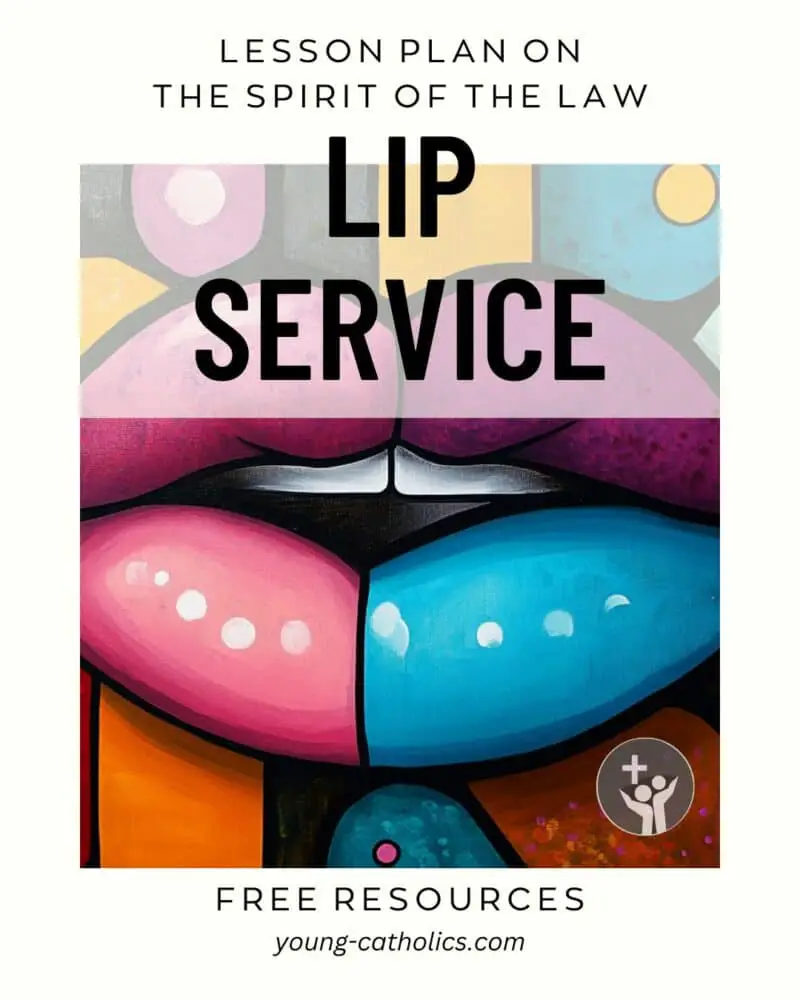
Lip Service (The Spirit of the Law)
The Lip Service lesson plan helps youth understand the difference between following rules and truly living their faith. Based on Mark 7:1-8, 14-15, 21-23, it shows how Jesus challenged the Pharisees for focusing more on outward actions than on love for God. The lesson teaches that God wants hearts that are sincere, not just lips that say the right things.
Youth are encouraged to reflect on their own habits and ask if they are growing closer to God or just going through the motions. The lesson also reminds them not to judge others but to offer love and support. It teaches that living out the spirit of the law means loving God and others deeply, from the heart.

For Love or Money (Wealth)
The For Love or Money lesson plan helps youth understand the role of wealth in their lives. Based on Mark 10:17-30, it uses the story of the rich young man to show how wealth can become a barrier to following Jesus. The lesson teaches that money itself is not bad, but being too attached to it can pull us away from God.
Youth are encouraged to see wealth as a tool to serve God, not as the goal of life. They reflect on their own use of money and how to trust God more. The lesson includes teachings from St. Ignatius of Loyola about being free from things that get in the way of loving God. It helps young people focus on what really matters—putting God first and growing in faith.
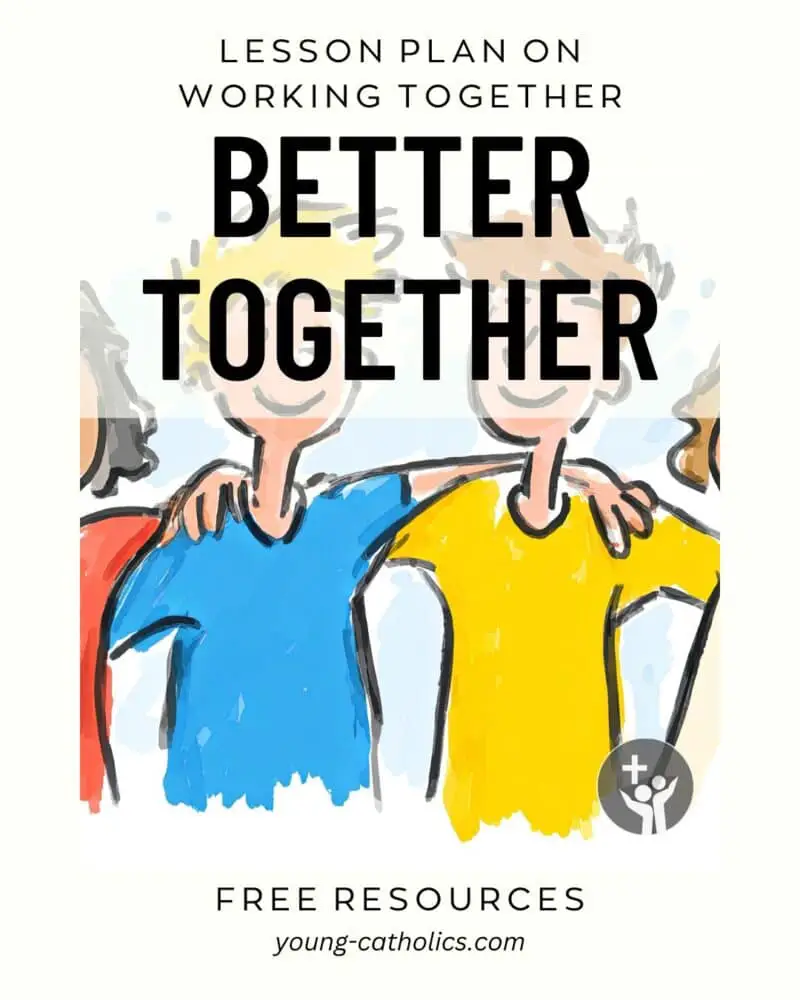
Better Together (Working Together)
The Better Together lesson plan teaches youth the value of working together in faith. Based on Mark 9:38-43, 45, 47-48, it shows how Jesus calls us to support others who serve God, even if they are not part of our group. The lesson helps youth understand that we are all on the same team—Team Jesus.
This plan encourages teens to let go of pride and competition and instead focus on unity. It shows that every effort done in God’s name matters. By learning to support one another, youth grow in love, humility, and faith. It reminds them that we are stronger when we work together.
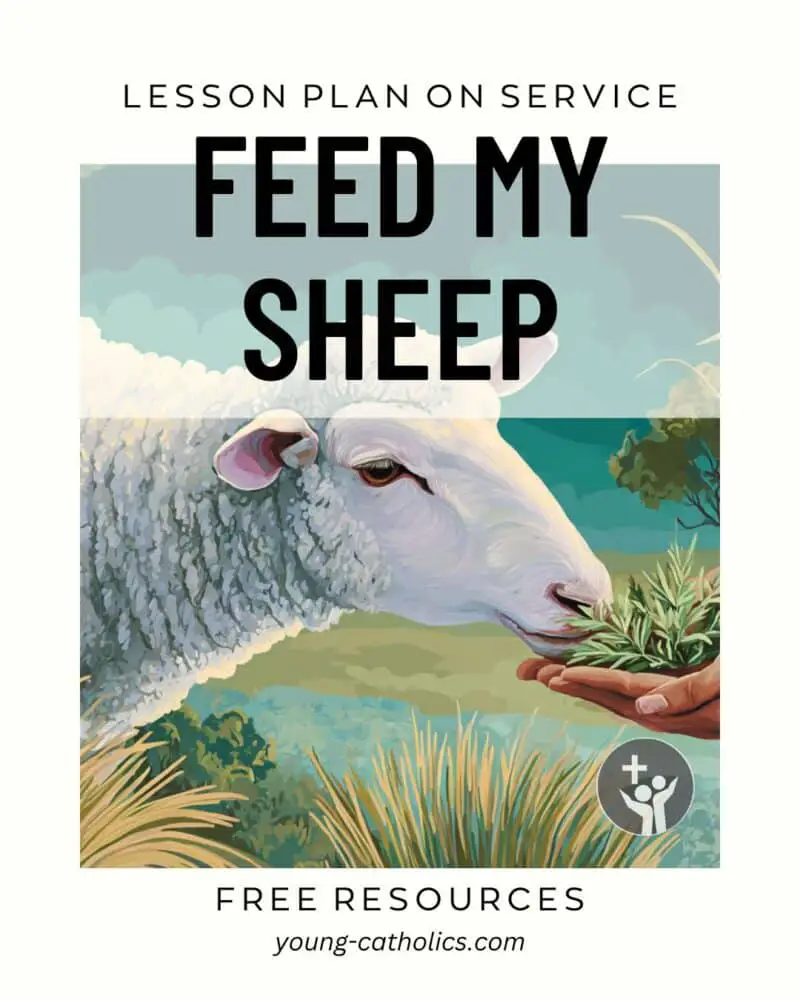
Feed My Sheep (Service)
The Feed My Sheep lesson plan teaches youth the importance of serving others as a way to follow Jesus. It is based on John 21:1-19, where Jesus tells Peter to feed and tend His sheep. This shows that love for Jesus is more than words—it must lead to action.
The lesson helps teens see that service can happen in small, everyday ways. It also teaches that real love sometimes requires sacrifice and stepping out of our comfort zones. Serving others is a way to grow in faith and live as true disciples of Christ.
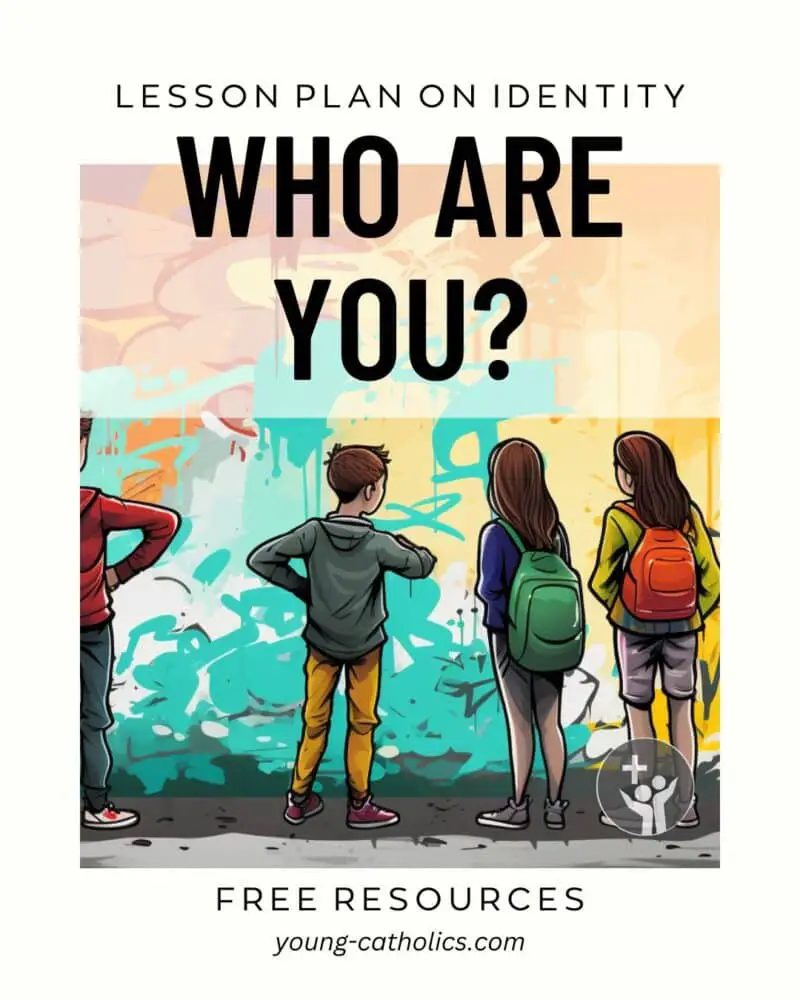
Who Are You? (Identity)
The Who Are You? lesson plan helps youth reflect on their true identity in light of faith. It uses John 1:6-8, 19-28 to show how John the Baptist knew who he was—and who he wasn’t. Youth learn they don’t have to meet others’ expectations or be everything to everyone. Instead, they are called to be who God made them to be.
This lesson teaches that our worth comes from being God’s children, not from talents or roles. It helps youth grow in self-awareness and encourages them to use their gifts to serve others and glorify God. It also builds community as teens support one another in discovering and embracing their identity in Christ.

Abandon Your Nets: What Needs to Be Left Behind?
The Abandon Your Nets lesson plan helps youth reflect on what they may need to leave behind to follow Jesus more fully. It uses Mark 1:14-20, where Jesus calls His first disciples and they leave their nets to follow Him. The lesson shows that just like fishing nets, our lives can get tangled with things that seem useful but may hold us back from God.
This plan teaches that faith sometimes means giving up comfort or habits that keep us from growing closer to Jesus. Youth are encouraged to name and let go of what distracts them from their spiritual path. Through prayer, discussion, and community, they learn to trust God more and take steps toward a stronger relationship with Him.
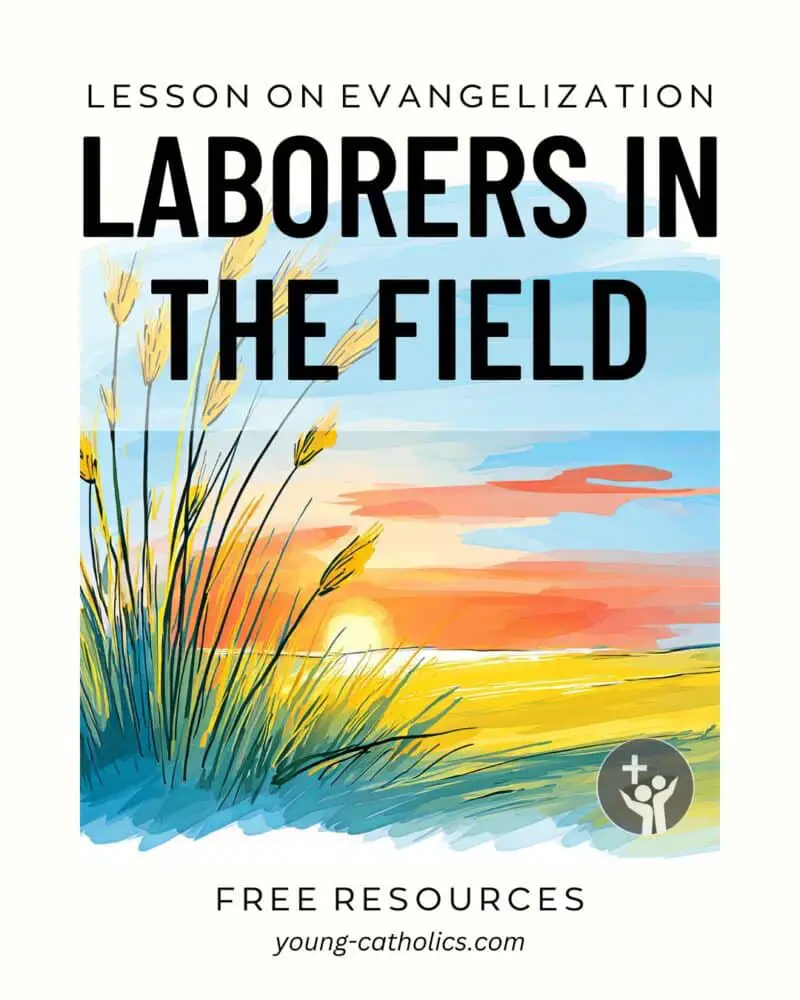
Laborers in the Field (Evangelization)
The Laborers in the Field lesson plan teaches youth about the importance of evangelization. It helps them understand that sharing the Gospel is part of being a disciple of Jesus. Using Matthew 9:36–10:8, youth learn how Jesus sent His followers to bring hope and healing to others. They are encouraged to show compassion and use their words and actions to share God’s love.
This lesson gives youth practical tools and confidence to speak about their faith. It also helps them recognize that evangelization doesn’t have to be big or scary. Even small acts—like inviting someone to church—can make a difference. Youth are reminded that they are not alone in this mission. God is with them, giving them courage.
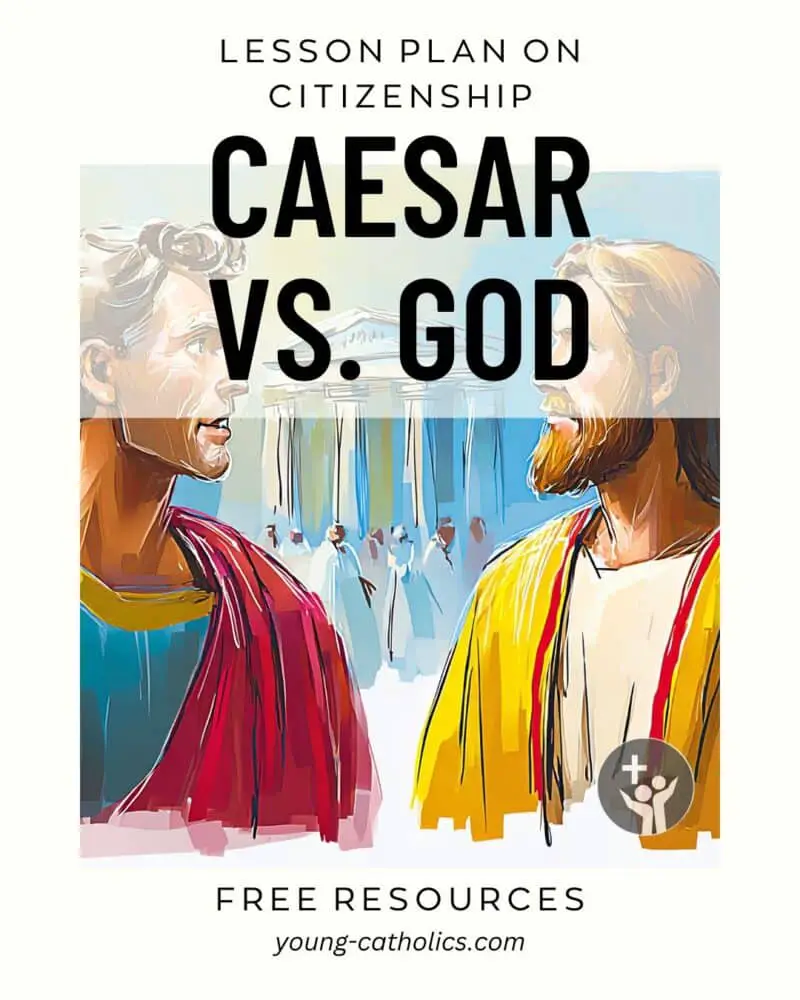
Caesar Vs. God
The Caesar vs. God lesson plan teaches youth how to balance their faith with their civic duties. It uses Matthew 22:15–21, where Jesus says, “Repay to Caesar what belongs to Caesar and to God what belongs to God.” Through games, discussion, and reflection, teens learn that being a good citizen and being faithful to God can work together.
This lesson helps youth understand how to respect laws, stay informed, and live out Catholic values in public life. It also shows them how to respond to disagreements with kindness and reason. They are encouraged to pray, take action, and think deeply about how their faith shapes their role in society.

What Are You Looking For?
The “What Are You Looking For?” lesson plan helps youth reflect on their deepest desires and how these connect with their faith. Based on John 1:35–42, it focuses on Jesus’ question to the disciples, “What are you looking for?” and encourages young people to explore what truly matters to them.
The lesson teaches that our wants and goals should line up with Jesus’ heart, which is close to the poor, the hurting, and those in need. It reminds youth that God doesn’t ask them to become someone else, but to use their own gifts to follow Him and serve others.
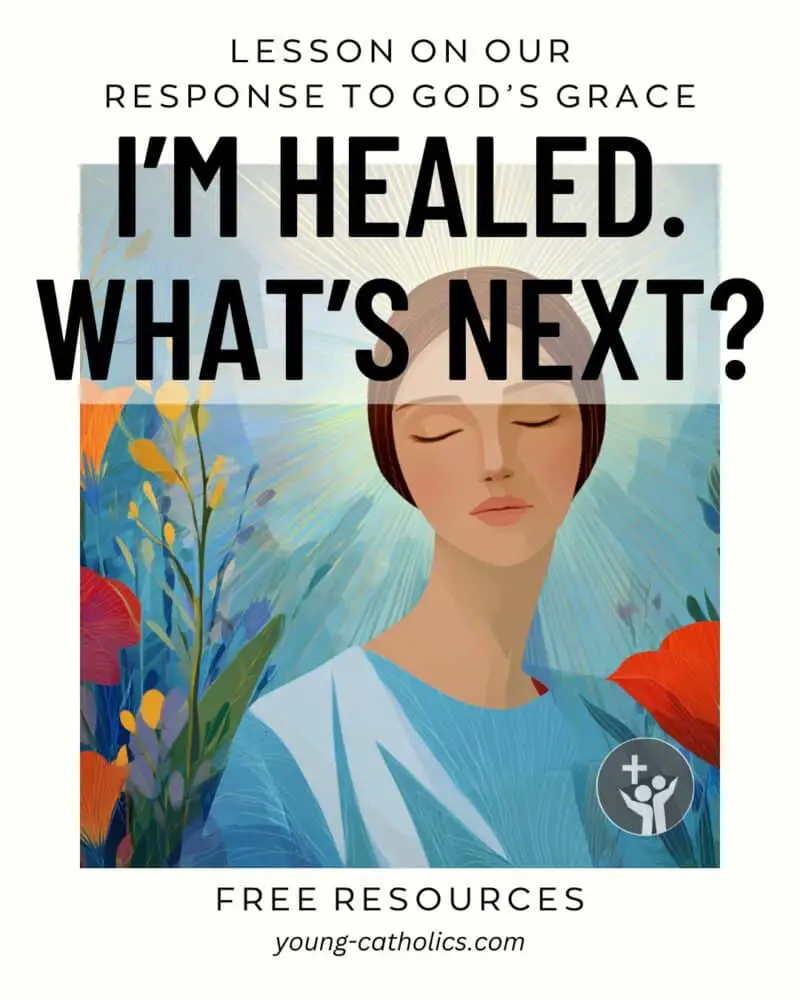
I’m Healed. What’s Next? (Our Response to Grace)
This lesson plan on our response to God’s grace teaches youth how to show gratitude through service. It is based on Mark 1:29–39, where Jesus heals Simon Peter’s mother-in-law and she immediately begins to serve others. Her quick response shows that healing is not just for personal comfort but should lead to action and love.
The lesson encourages youth to reflect on how Jesus has brought healing into their own lives—physically, emotionally, or spiritually—and how they can respond by helping others. It highlights the importance of the Sacraments of Reconciliation and Anointing of the Sick and suggests simple acts of kindness as a way to live out this message.
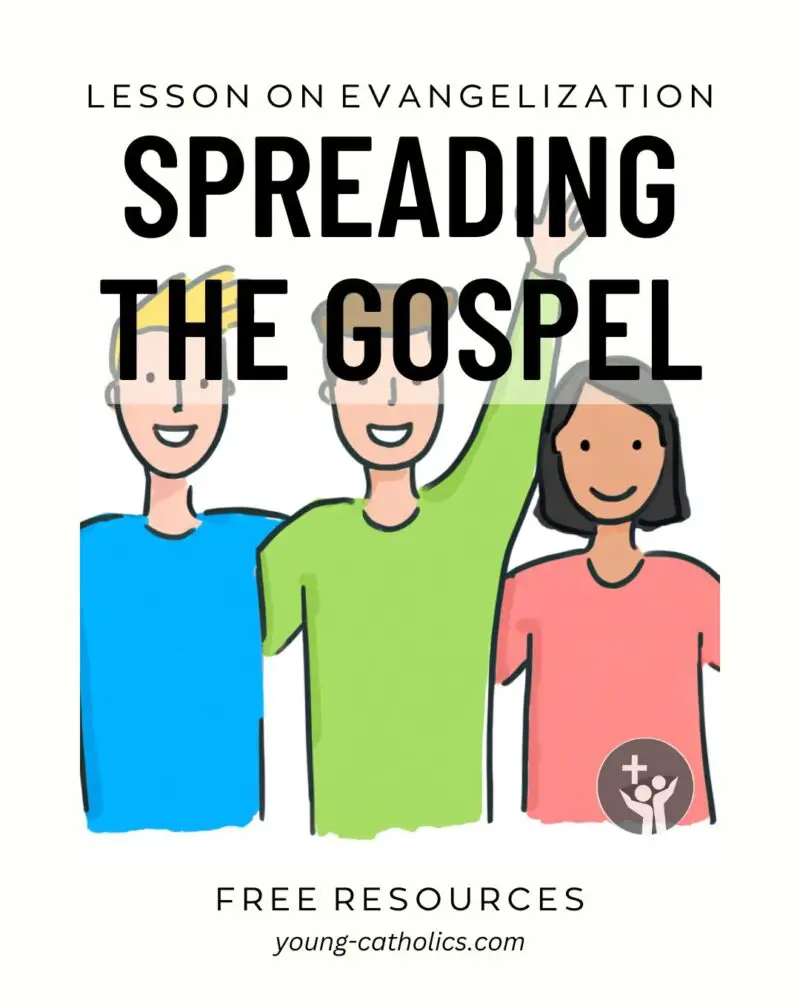
Spreading the Gospel to the Whole World (Evangelization)
The Spreading the Gospel to the Whole World Lesson Plan helps young people understand their role in sharing their faith. Based on Jesus’ command in Mark 16:15-20, it teaches that evangelization is not just for priests or missionaries. Every Catholic is called to share the Gospel in simple ways through words and actions.
This lesson encourages youth to step out of their comfort zones and look for opportunities to spread God’s love. It helps them see that even small actions, like inviting a friend to Mass or showing kindness, can make a difference. By learning to trust the Holy Spirit, they gain the confidence to live and share their faith.
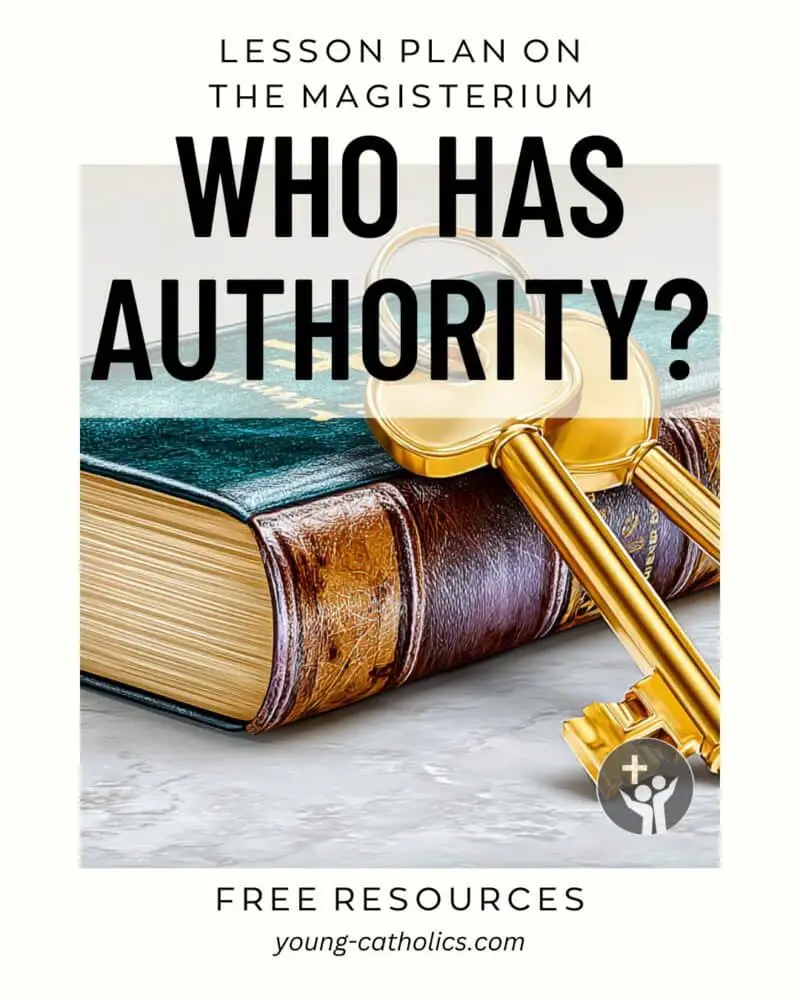
Who Has Authority? (Magisterium)
This lesson plan on authority helps youth understand what true authority is and how it affects their faith. It is based on Mark 1:21–28, where Jesus teaches with authority and casts out an unclean spirit. The lesson explores how Jesus’ authority comes from His relationship with the Father and how He teaches with confidence and truth.
Youth will also learn about the Church’s teaching authority, called the Magisterium. They will reflect on how to accept and understand Church teachings, even when they are difficult. Through discussion, role-play, and reflection, students are encouraged to think about who influences them and how they can grow in faith by trusting the authority of Jesus and His Church.
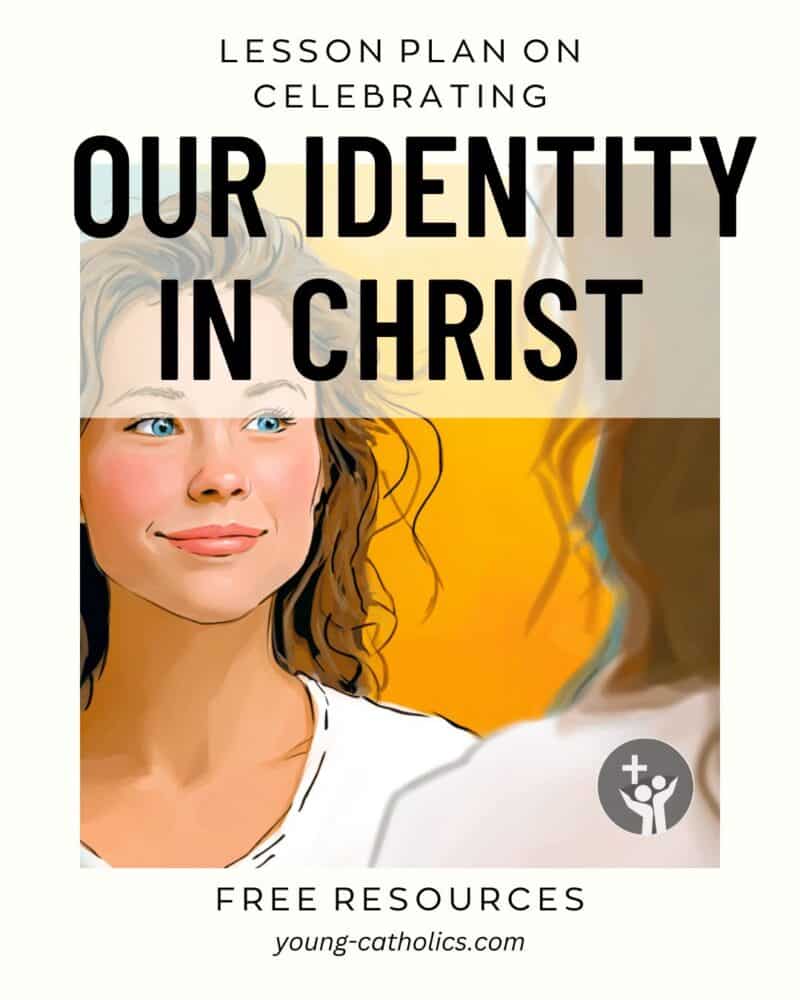
Celebrating Our Identity in Christ
This Identity in Christ lesson plan helps youth understand that their worth comes from being loved by God and belonging to Him. It is based on Jesus’ words in Luke 10, where He reminds His disciples to rejoice because their names are written in heaven.
This lesson encourages young people to let go of the world’s standards and embrace their identity as God’s children. By focusing on God’s unchanging love, youth can build confidence, face challenges, and grow in faith.
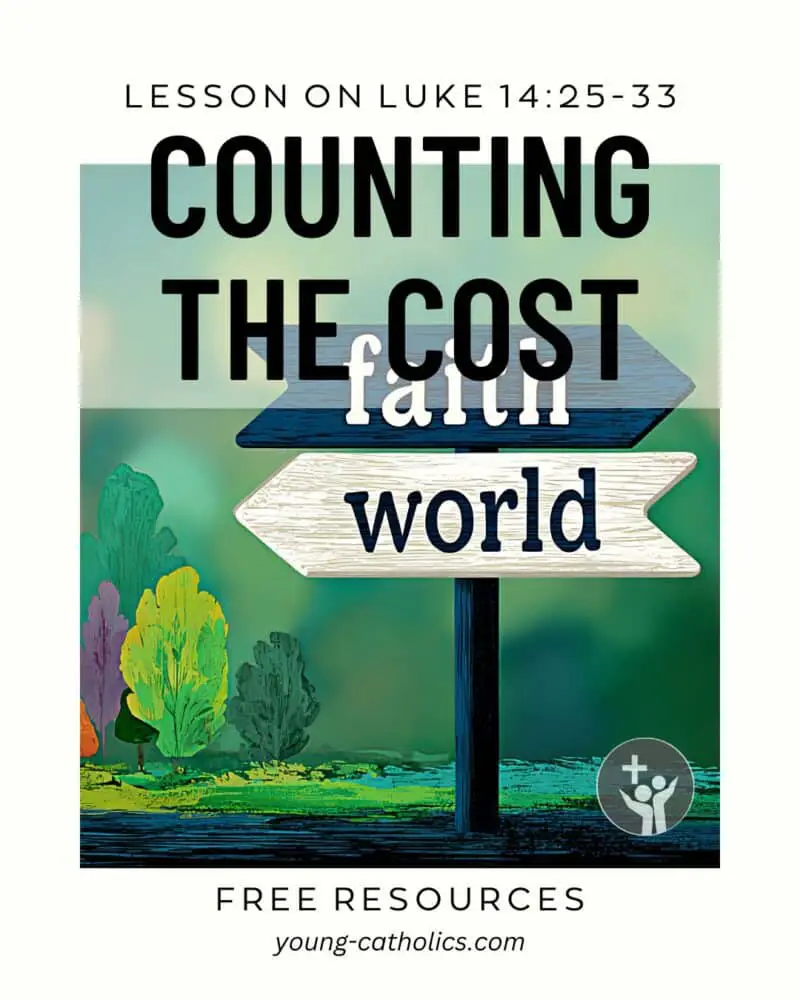
Counting the Cost
This Counting the Cost lesson plan helps youth understand the commitment of following Jesus. Based on Luke 14:25-33, it teaches that faith is a serious decision that requires effort and sacrifice. Jesus tells His followers to think ahead, just like someone building a tower or a king preparing for battle. This lesson encourages youth to see that being Catholic means making choices that put God first, even when it’s difficult.
Through discussion, activities, and reflection, students will learn how to stay strong in their faith. They will explore common challenges, like peer pressure and distractions, and discover ways to prepare for them. This lesson helps youth see that counting the cost is not about fear—it’s about being ready. With prayer, Scripture, and the support of others, they can follow Jesus with confidence.
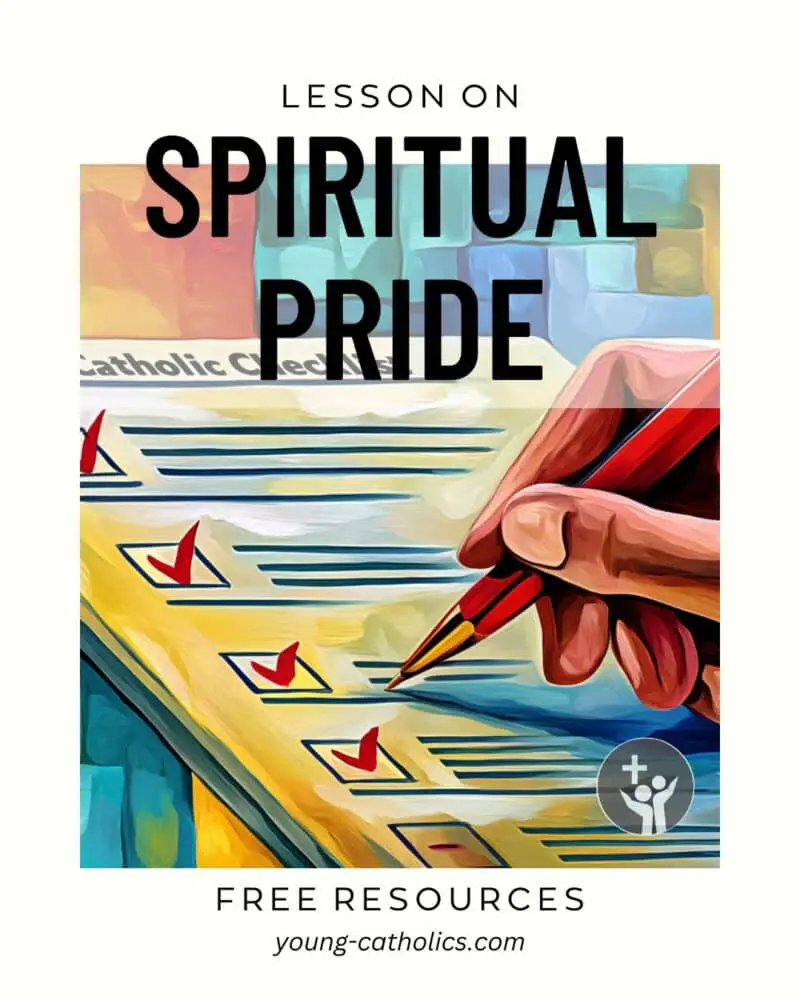
Watch Out for Spiritual Pride
This lesson plan helps youth understand the danger of thinking they are better than others because of their faith. It uses the message of John the Baptist from Matthew 3:1-12 to show that God cares more about our hearts than our appearance.
The lesson guides youth to think about their actions and attitudes. It encourages humility, honesty, and a real relationship with God. Through prayer, discussion, and activities, students learn how to live their faith without pride. This lesson helps them grow closer to Jesus by being more like Him.
Good vs Evil
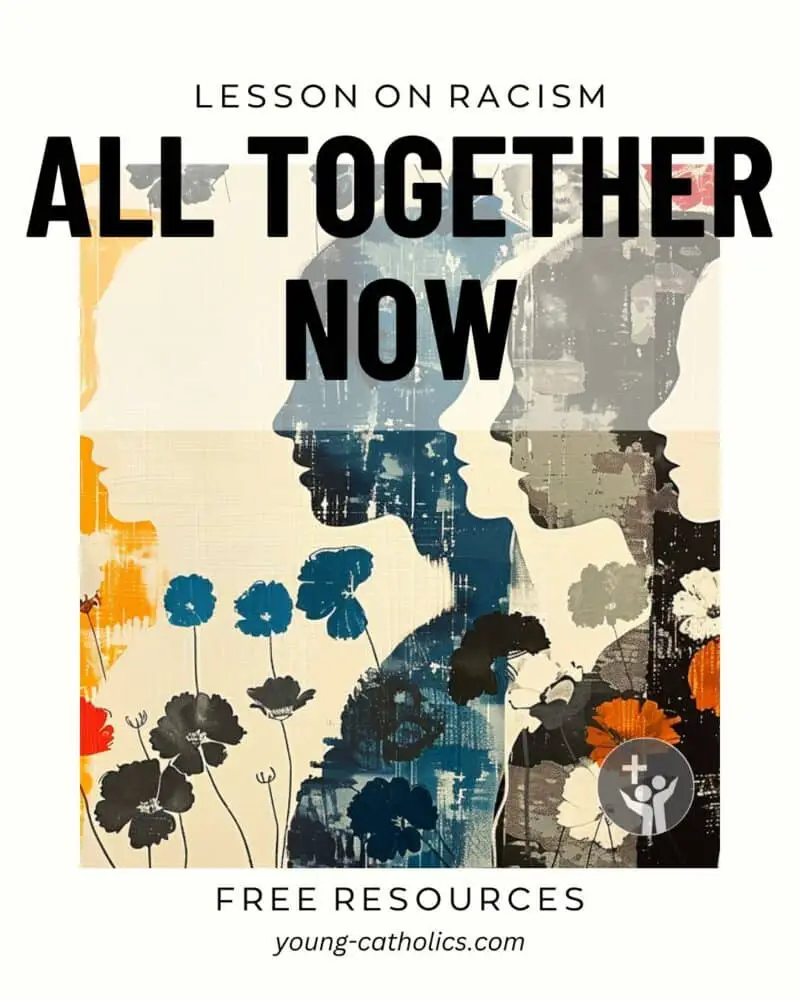
All Together Now (Racism)
This lesson plan on racism helps youth understand the problem of racism in both personal and social ways. It teaches that racism goes against our faith and the dignity of every person. Using 1 Corinthians 12:12–30, it shows that we are all part of one body in Christ, and when one part suffers, we all suffer. The lesson invites youth to reflect on their own bias and how to treat others with fairness and respect.
Youth are encouraged to see how faith calls them to stand in solidarity with those who are hurt by racism. They learn that Jesus showed perfect love by sharing in our struggles and that we are called to do the same. Through group discussion and activities, youth are asked to think deeply, grow in compassion, and consider ways they can help build a more just world.
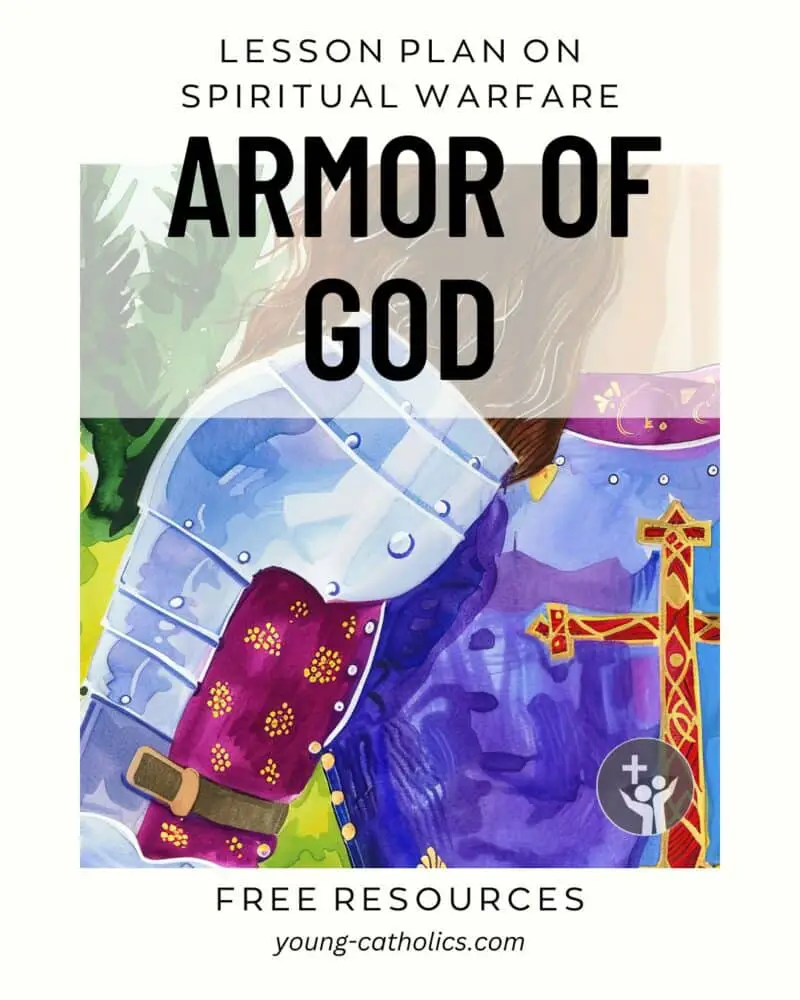
Armor of God (Spiritual Warfare)
This lesson plan on the Armor of God helps youth understand spiritual warfare and how to stand strong in their faith. Based on Ephesians 6:11 and supported by Mark 13:24–32, it teaches that God gives us tools like truth, faith, and prayer to face life’s challenges. Youth learn that through the sacraments, Scripture, and support from others, they can grow stronger in resisting temptation.
The lesson includes prayer, discussion, and activities to show how the Armor of God works in daily life. It reminds youth that they are never alone—Jesus, St. Michael, and their guardian angels are with them. The goal is to help young people trust in God’s power and use spiritual tools to live with courage and faith.
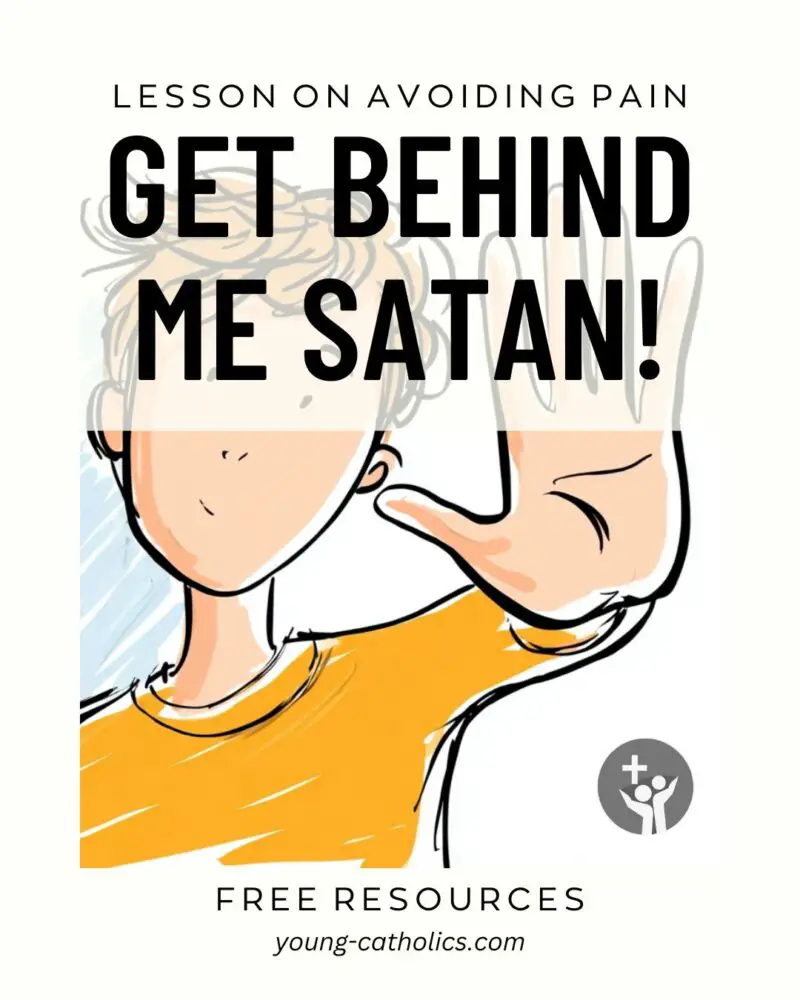
Get Behind Me Satan (Avoiding Pain)
This lesson plan, based on Mark 8:27-35, teaches youth about the importance of facing hard things in their faith journey. It focuses on Jesus’ words to Peter, “Get behind me, Satan,” showing that trying to avoid all suffering can lead us away from God’s will. Youth learn that discipleship often includes carrying their own crosses and making tough choices.
The lesson helps youth see that while pain is hard, it can lead to growth and deeper trust in God. It encourages prayer, honest reflection, and support from others when facing struggles. Most of all, it reminds them that Jesus chose the harder path out of love, and we are called to follow Him with courage.
Sacraments
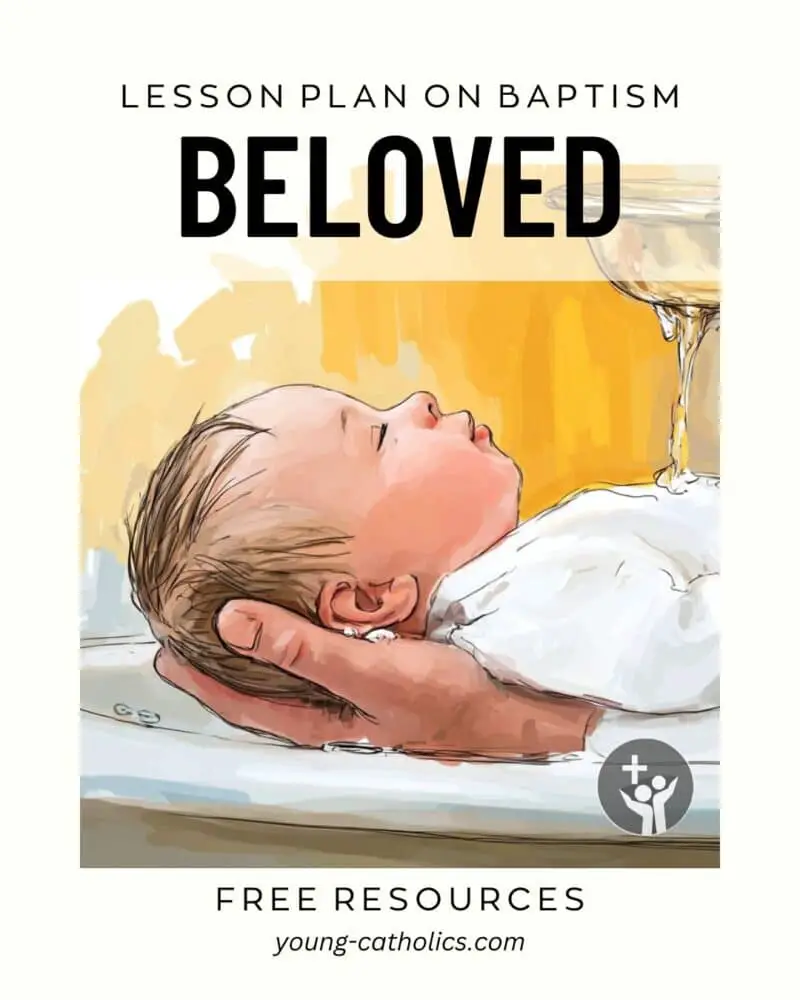
Beloved (Baptism)
This lesson plan on baptism helps youth understand the meaning of being baptized and belonging to God. It shows that baptism is not just a ceremony but a lasting sign of God’s love. Youth learn that through baptism, they are called God’s beloved children and become part of the Church family. The lesson includes Luke 3:15-16, 21-22, where God calls Jesus His beloved Son.
The lesson also helps youth see how baptism connects them to Christians everywhere. It teaches that God’s love is permanent and cannot be taken away. Youth are encouraged to live as God’s children, to grow in faith, and to love others. Through small group sharing, prayer, and reflection, they are reminded that they are deeply loved and called to respond with kindness and courage.
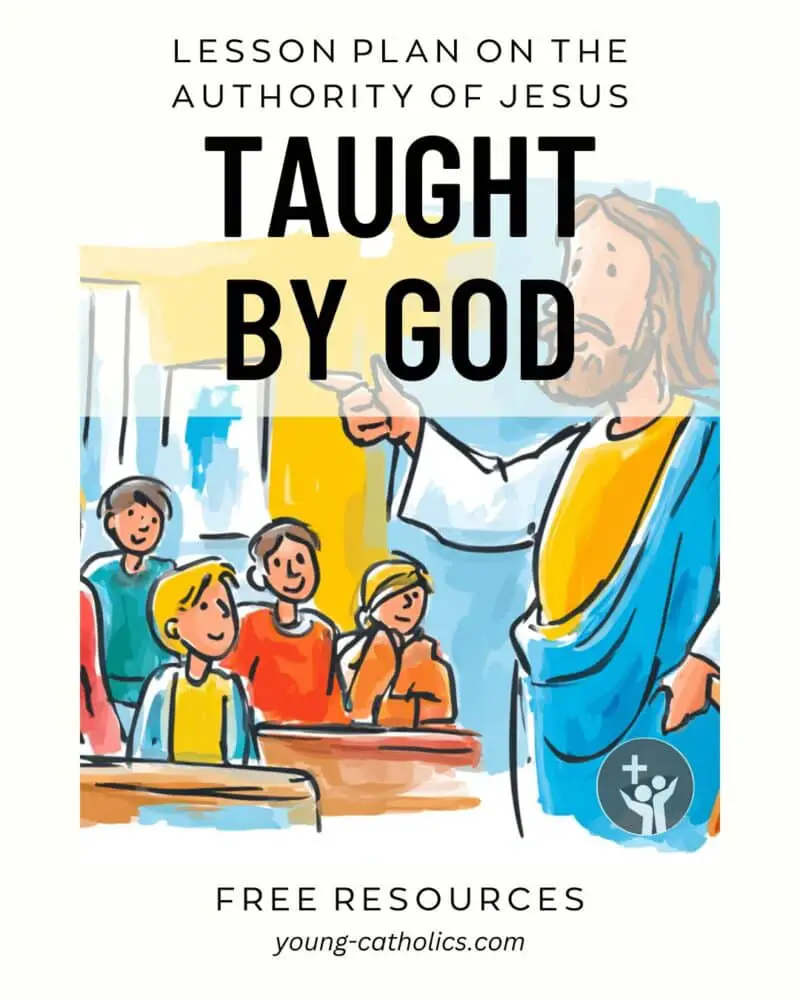
Taught By God (The Authority of Jesus and the Eucharist)
This lesson plan, “Taught By God – The Authority of Jesus,” helps youth understand what it means to trust and follow Jesus. It is based on John 6:41-51, where Jesus teaches that He is the Bread of Life. The lesson explains how Jesus showed divine authority and how people struggled to accept it, just like we sometimes do today.
Youth learn that receiving the Eucharist is not just a tradition—it is a way of saying yes to Jesus and His authority. The lesson encourages young people to trust God’s wisdom over their own and to grow in faith by believing in Jesus’ words.
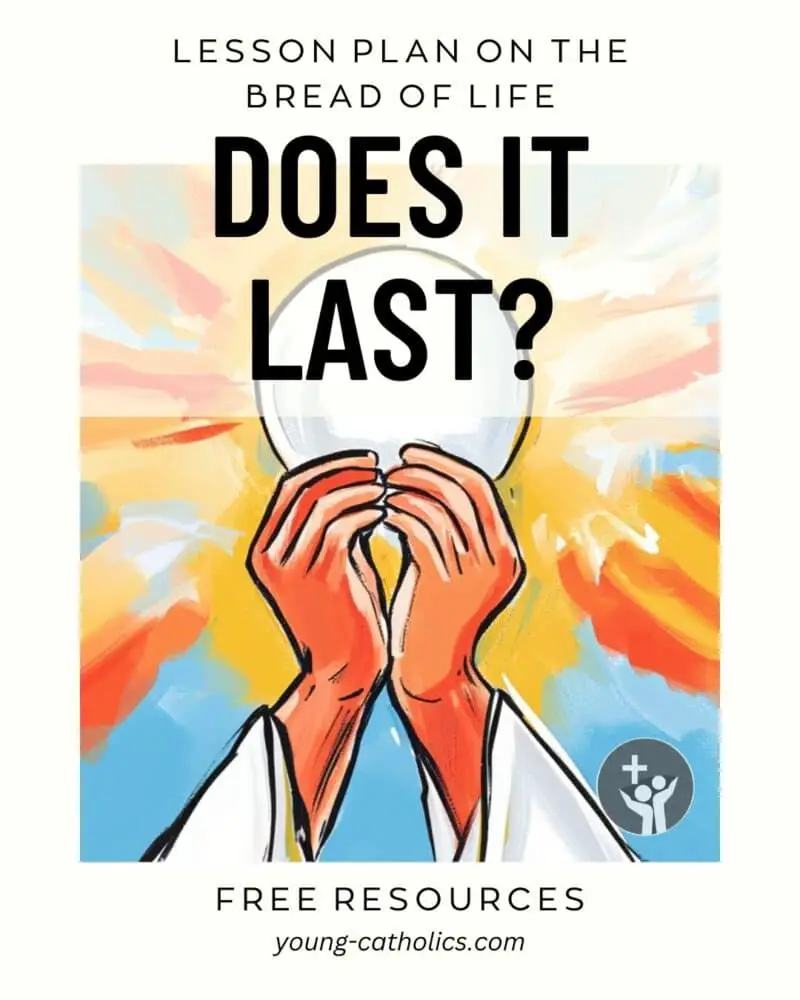
Does It Last? (The Eucharist)
The “Does It Last? Bread of Life” lesson plan teaches youth to focus on what truly lasts—our relationship with Jesus through the Eucharist. It helps them see that material things and worldly distractions are temporary, but the Bread of Life gives eternal nourishment. This lesson is based on John 6:24-35, where Jesus says, “I am the bread of life.”
Youth learn that the Eucharist is not just a symbol but a real connection with Jesus. It strengthens us spiritually and unites us with God and one another. The lesson encourages youth to make time for the Eucharist and grow in love for this gift.
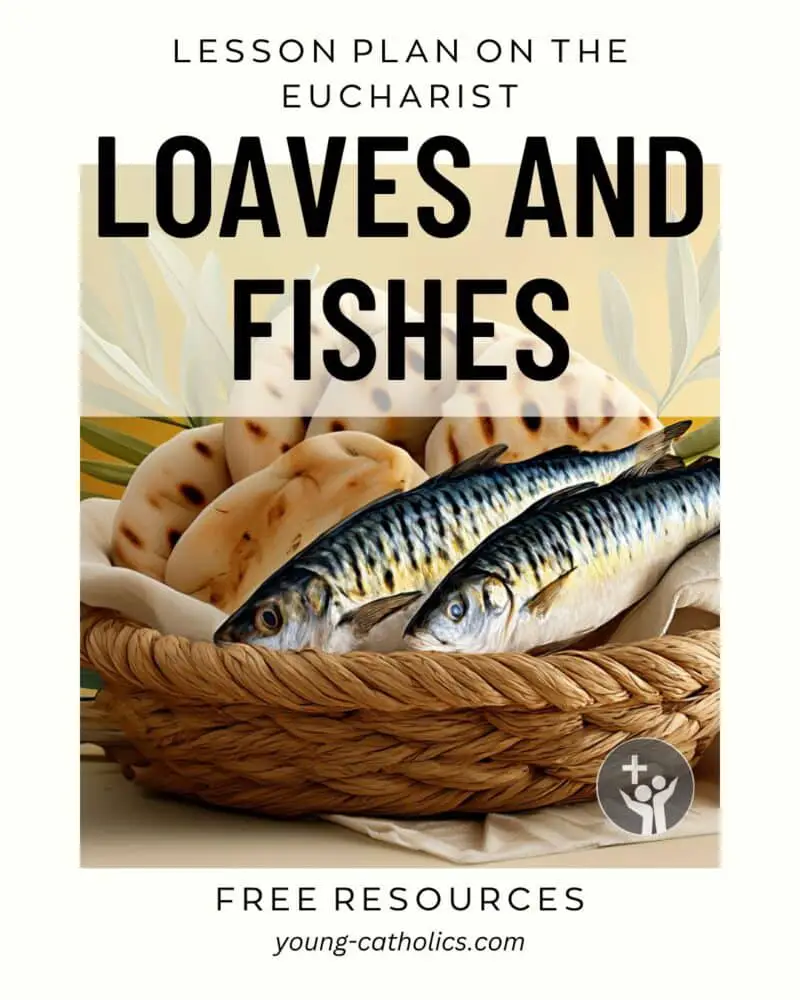
Loaves and Fishes (The Eucharist)
The “Loaves and Fishes Eucharist” lesson plan helps youth see how Jesus takes what we offer, even if it seems small, and turns it into something amazing. Based on John 6:1-15, the lesson connects the miracle of feeding the crowd to the Eucharist. It shows how Jesus still feeds us today with His body and blood at Mass.
This lesson encourages youth to trust Jesus and give what they have, knowing He can use it for good. It helps them understand the real presence of Jesus in the Eucharist and invites them to approach Mass with faith and gratitude.

What Does Amen Mean? (The Eucharist)
The What Does Amen Mean? lesson plan helps youth understand the deeper meaning of the word amen and its connection to faith, especially during Mass. Through scripture, discussion, and reflection, participants learn how amen is a statement of belief in Jesus’ Real Presence in the Eucharist.
This lesson encourages youth to approach the Eucharist with reverence and grow in their faith. It also helps them see how saying amen can guide their daily lives as followers of Christ.
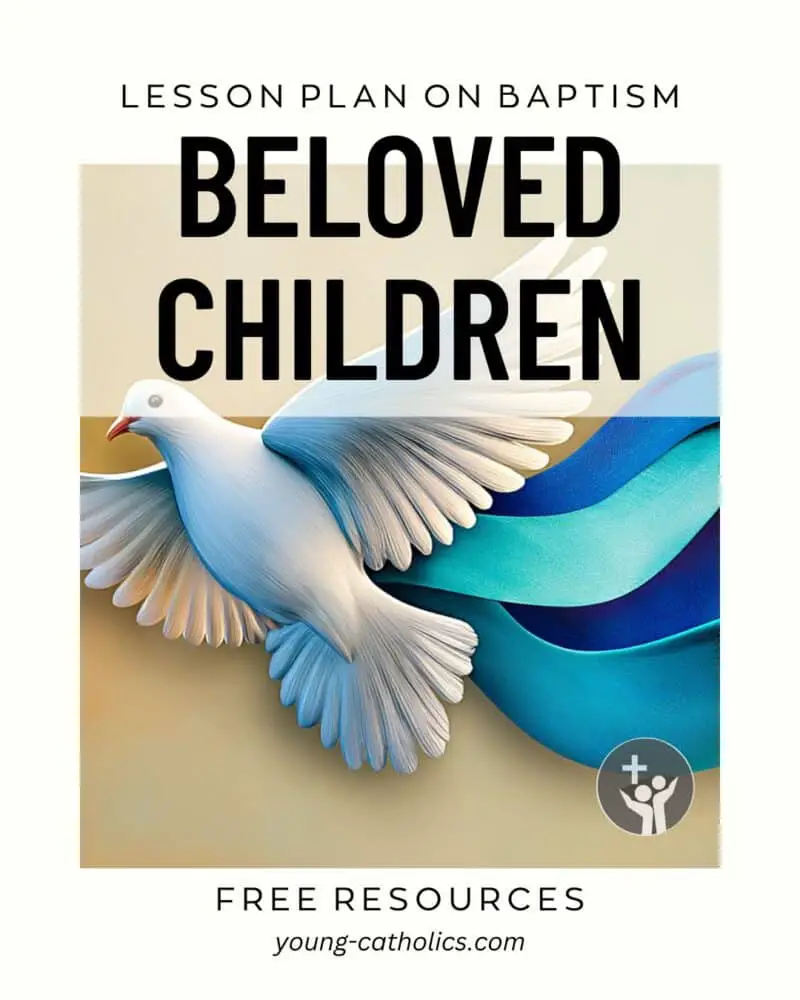
Baptized as Beloved Children (Baptism)
The “Baptized as Beloved Children” lesson plan helps youth understand that baptism is a sign of God’s love and a call to live as His sons and daughters. Based on Mark 1:7-11, where Jesus is baptized and God calls Him “beloved,” this lesson reminds young people that they, too, are loved by God in a deep and lasting way.
Through activities, reflection, and prayer, the youth are invited to think about their own baptism and what it means to be part of God’s family. The lesson encourages them to live each day knowing they are cherished by God and to share that love with others.

What Is in Your Church? (Distractions at Mass)
This lesson plan helps youth understand the importance of being fully present at Mass. Using John 2:13-25, where Jesus clears the temple, it shows that church is meant to be a sacred space for meeting God. It invites young people to reflect on how they treat the church and their time during Mass.
Through discussion, scripture, and practical tips, youth learn how to avoid distractions and make Mass a true moment of prayer. The goal is to help them focus on God, respect the holy space, and grow in their faith through active participation in the Eucharist.

How Can I Get Clean? (Reconciliation)
This lesson plan helps youth understand the power of confession by comparing sin to stains and showing how Jesus makes us clean. It uses Mark 1:40-45, where Jesus heals a leper, to explain His desire to heal and forgive. The lesson teaches that just like the leper asked Jesus for healing, we need to ask Jesus to forgive us through the sacrament of Reconciliation.
Youth learn that confession is not scary and that priests are there to help, not to judge. The plan encourages them to name their sins, seek forgiveness, and celebrate the joy of being made clean. It helps them see that God’s mercy is always available and that confession brings peace and a closer relationship with Jesus.
Scripture
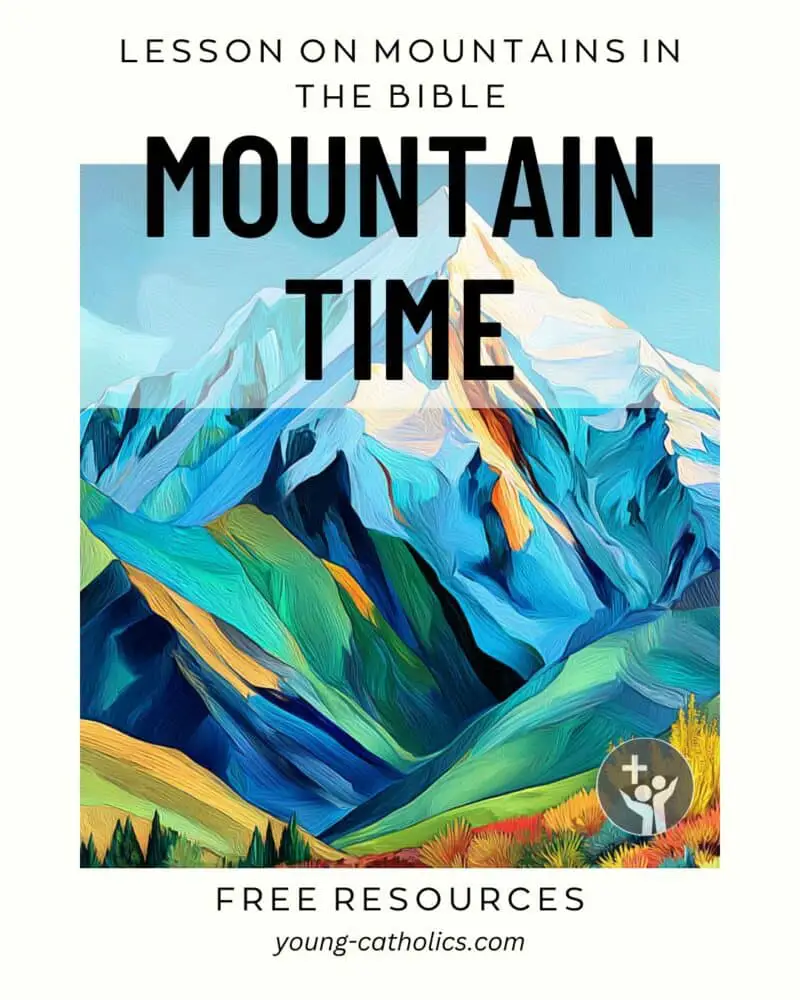
Mountain Time (Mountains in the Bible)
This lesson plan on mountains in the Bible teaches youth how people in Scripture often met God in high, quiet places. It shows how mountains are places of trust, prayer, and powerful encounters with God.
Using stories like the Transfiguration in Luke 9:28b-36, and other mountain events such as Mount Ararat, Moriah, Sinai, Carmel, and Tabor, youth learn that climbing a “spiritual mountain” takes effort but brings them closer to God.
The lesson encourages youth to reflect on their own “mountaintop” experiences—times they felt close to God. It helps them understand that while we can’t always stay in those moments, we are called to bring that faith into everyday life. It teaches that seeking God may not always be easy, but the effort is worth it.
The goal is to inspire youth to listen for God’s voice and let those experiences shape how they live and share their faith.
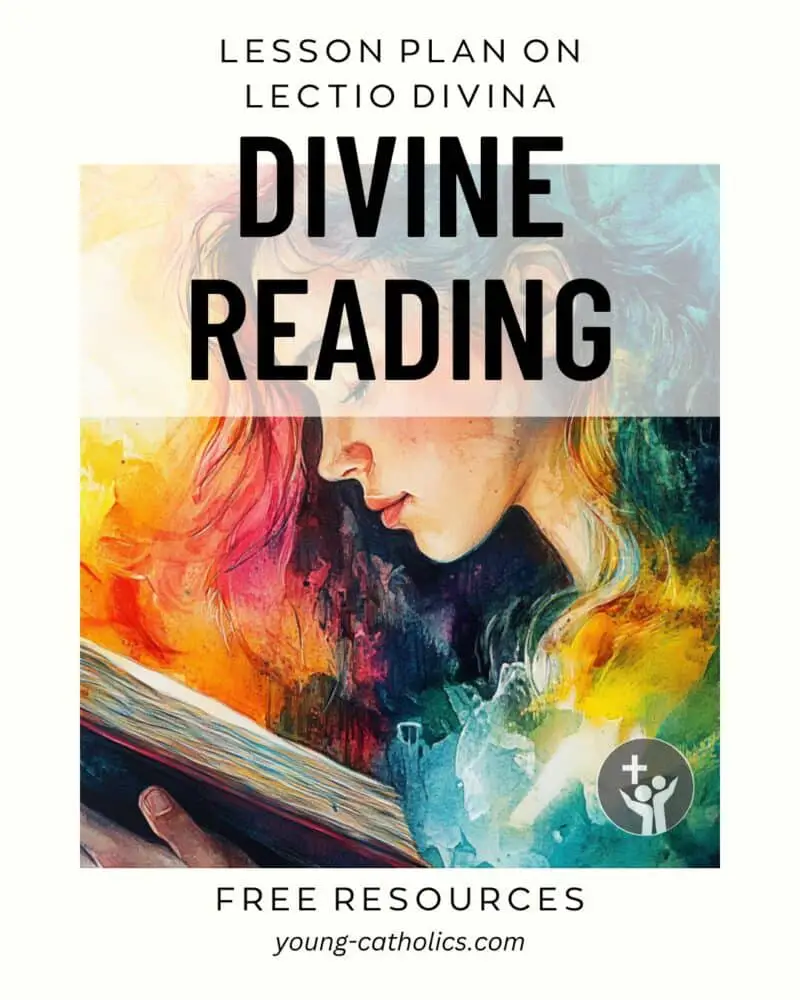
Divine Reading (Lectio Divina)
This lesson plan on Lectio Divina teaches youth how to pray with Scripture by listening for God’s voice. It shows them that the Bible is not just a book of old stories, but a way to connect personally with God today. Using the example of Jesus reading from Isaiah in Luke 1:1–4 and 4:14–21, youth learn how to reflect on Scripture and find meaning for their lives.
The plan guides them through the steps of Lectio Divina: reading, reflecting, praying, and listening. It helps them grow in faith, find direction, and feel God’s presence in their lives. By practicing this form of prayer, they learn to focus during prayer and see how God speaks through His word.
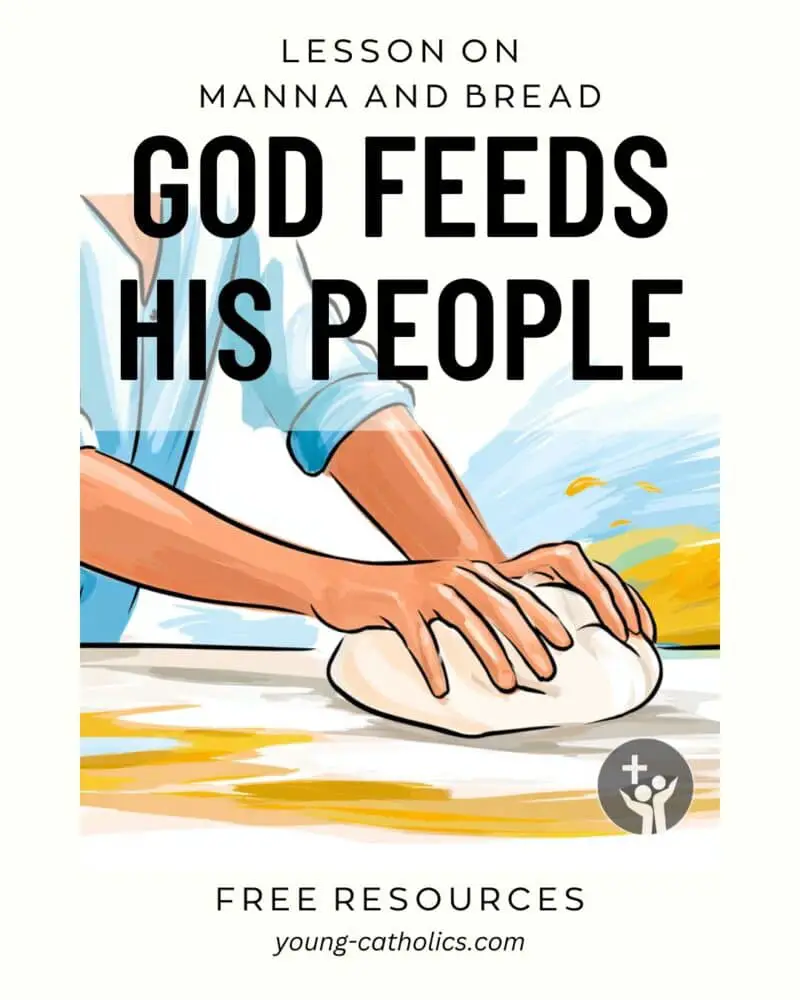
God Feeds His People (Bread and Manna)
This lesson plan on manna and bread teaches youth how God has always provided for His people, both physically and spiritually. It looks at stories like manna in the desert (Exodus 16), Elijah and the widow (1 Kings 17), Elisha feeding a crowd (2 Kings 4), and Jesus feeding the multitudes (Matthew 15). Each story shows God’s care and leads to a deeper understanding of the Eucharist.
The lesson helps youth see the Eucharist as God’s way of feeding us today with His love and presence. It shows that true nourishment comes not from material things but from a relationship with God. Youth are encouraged to trust God, notice His daily care, and respond with gratitude and faith.
Special Days and Seasons
- In the Desert (Prayer, Fasting, and Almsgiving)
- Blessed Bearer (Visitation)
- Follow That Star (Epiphany)
- Staying Awake (Advent)
- What Are You Waiting For? (Advent)
- Be Watchful! Be Alert! (Advent)
- Ups and Downs (Transfiguration)
- What Is Love? (Good Shepherd Sunday)
- Repent and Believe! (Lent)
- Remembering the Faithful Departed (All Souls Day)
- Choosing Voices (Good Friday or Christ the King)
- Fighting Distractions (Lent and Temptations)
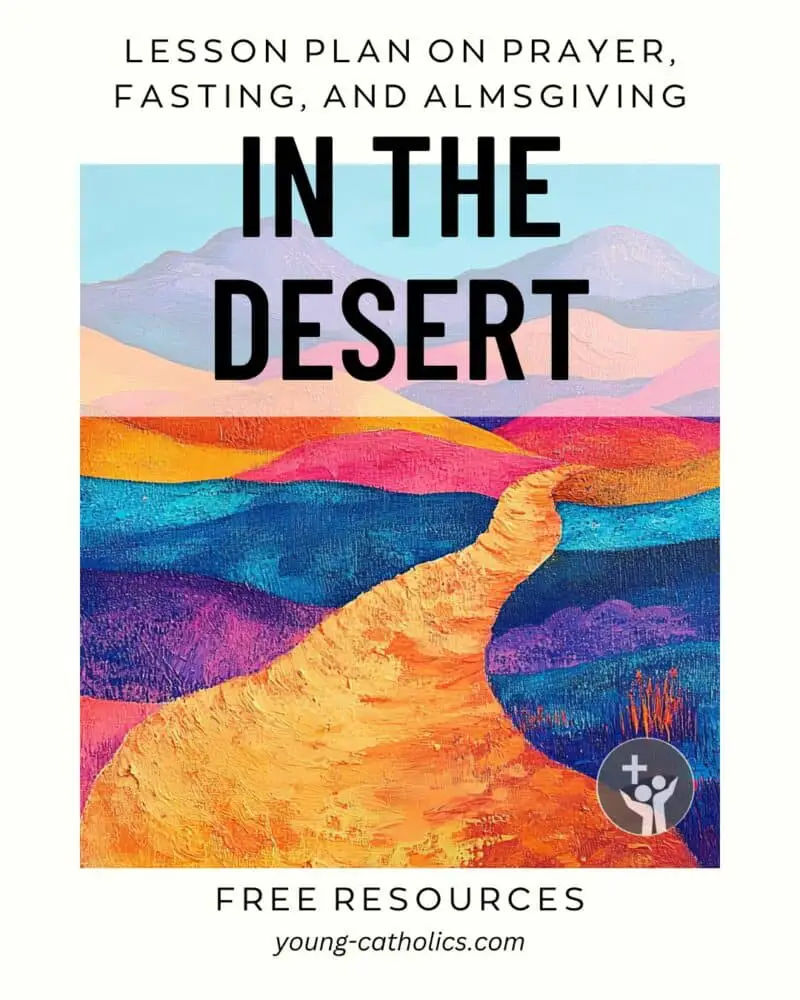
In the Desert (Prayer, Fasting, and Almsgiving)
The In the Desert Lesson Plan on Lent helps youth understand the meaning of Lent by focusing on Jesus’ time in the desert (Luke 4:1-13). It teaches that Lent is a season to grow closer to God through prayer, fasting, and giving. These practices help us face and resist the same temptations Jesus did—comfort, power, and pride.
Youth learn that Lent is not just about giving things up, but about becoming stronger in faith. This lesson encourages them to make meaningful sacrifices, trust in God, and care for others. It gives them tools to prepare their hearts for Easter and follow Jesus’ example each day.
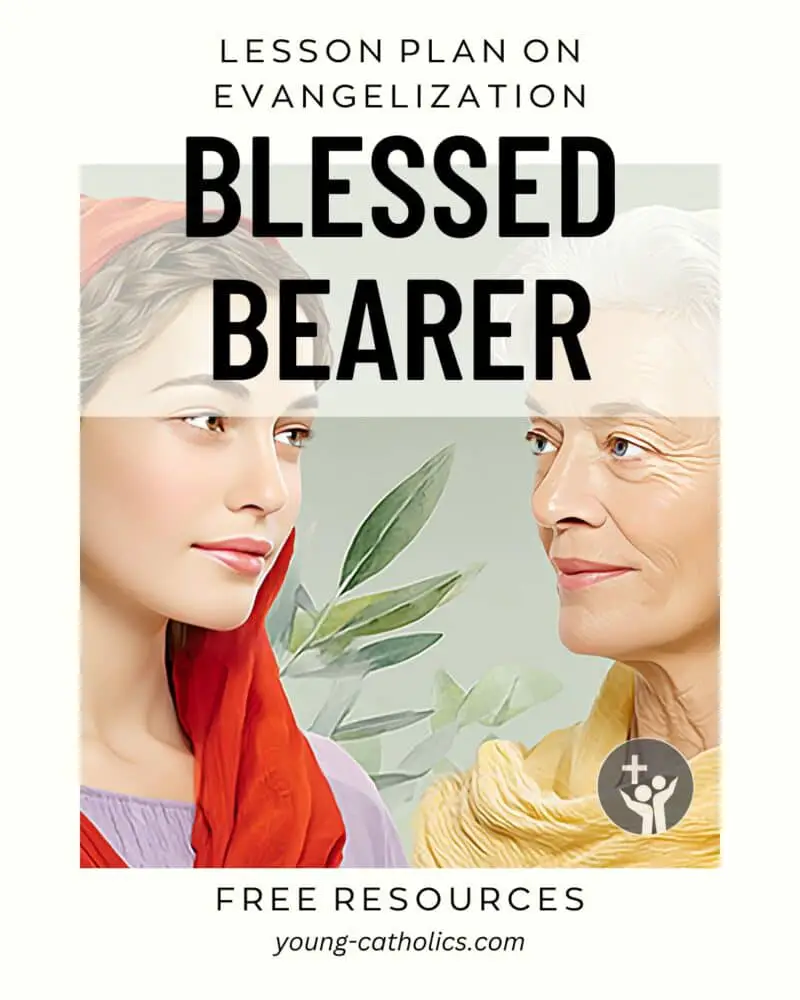
Blessed Bearer (Visitation)
The Blessed Bearer Evangelization Lesson Plan helps youth learn how to share their faith through love and friendship. Using the story of Mary visiting Elizabeth (Luke 3:10-18), it shows how Mary brought Jesus to someone she cared about. The lesson teaches that evangelization is not about preaching to strangers but about sharing Christ with people we already know.
Youth learn simple and practical ways to bring Jesus into everyday conversations. The lesson reminds them that strong relationships and kindness are key. It encourages them to rely on the Holy Spirit for courage and guidance. Like Mary, they can become “blessed bearers,” bringing the joy of Christ to others with love and humility.
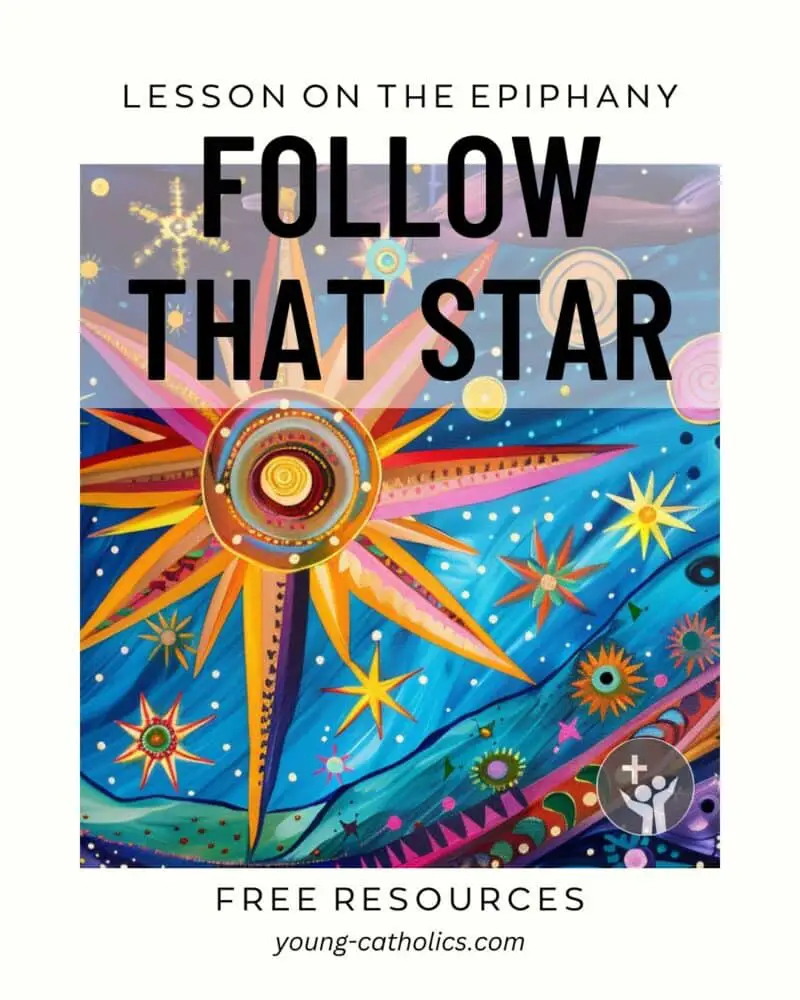
Follow That Star (Epiphany)
This lesson plan is based on the story of the Magi in Matthew 2:1-12. It helps youth explore what it means to follow Jesus with faith, even when the journey is hard or uncertain. Teens are invited to think about their own values, goals, and the things that guide them through life.
This lesson encourages honest discussion about trust, sacrifice, and staying focused on what matters. Youth will reflect on real-life challenges and how to keep moving forward in faith. It’s a chance to grow in their relationship with God and better understand the journey they are on.

Staying Awake (Advent)
This lesson plan helps youth understand what it means to be spiritually awake and ready for Jesus. It uses Matthew 24:37-44 to explore how we can live each day with our eyes open to God’s presence, even in a busy world.
The lesson invites young people to reflect, pray, and make simple choices that help them grow in faith. It connects Advent with daily life and shows that being spiritually awake means noticing others, making time for God, and living with purpose. This helps youth stay grounded in their faith and closer to Jesus.
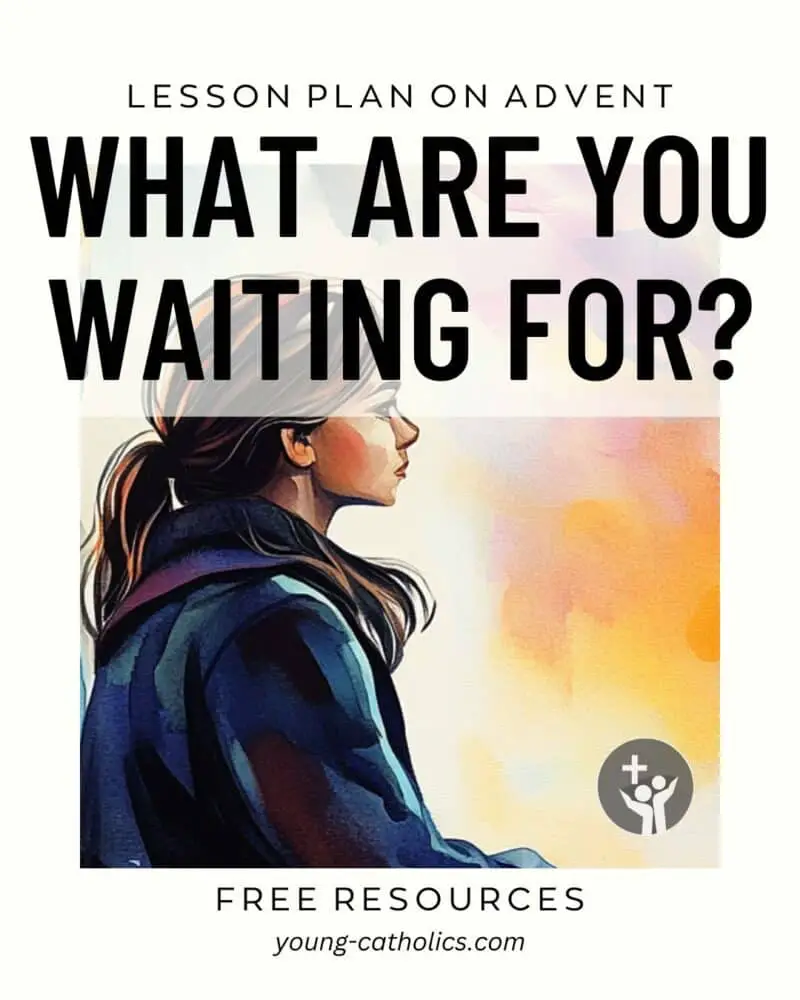
What Are You Waiting For? (Advent)
The What Are You Waiting For? Advent Lesson Plan teaches youth how to wait with purpose. Based on Mark 1:1-8, it focuses on John the Baptist and his call to prepare for Jesus. The lesson helps youth see that waiting, especially during Advent, is not just about being patient—it’s a time to grow, reflect, and get ready for Christ.
Youth learn how to use prayer, repentance, and acts of love to prepare their hearts. They explore how to clear away distractions and focus on Jesus. This lesson shows that waiting can be meaningful when it helps us grow closer to God.
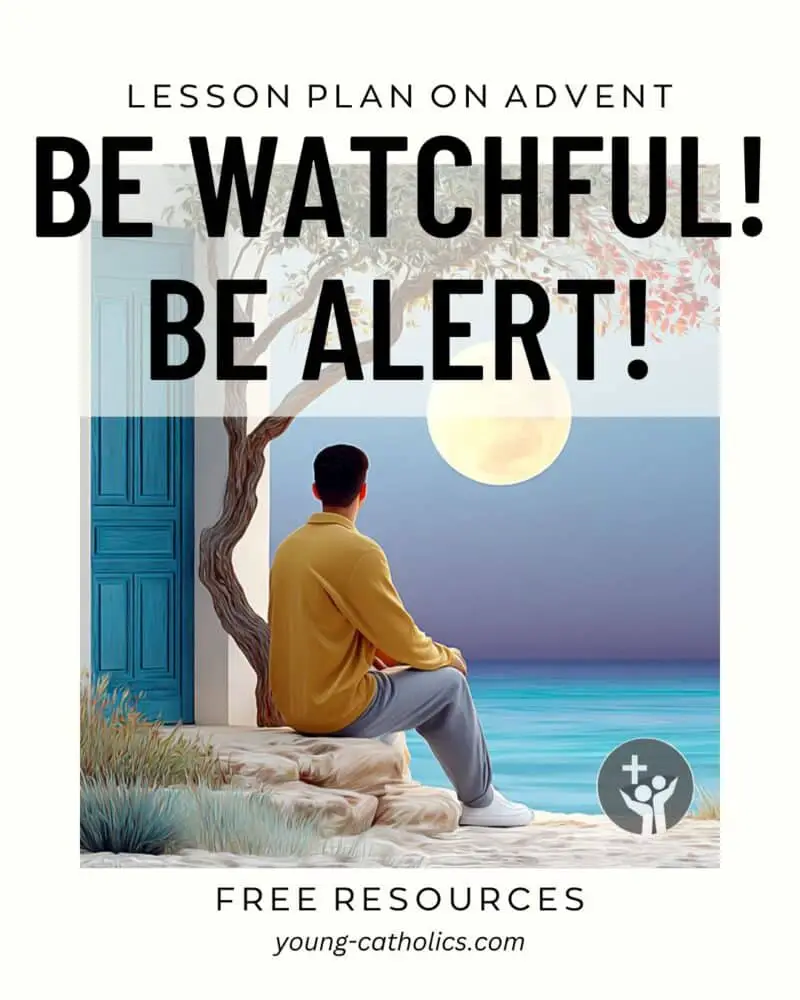
Be Watchful! Be Alert! (Advent)
The Be Watchful! Be Alert! Advent Lesson Plan helps youth understand the importance of being spiritually ready for Jesus. Based on Mark 13:33-37, it teaches that Advent is not passive waiting but a time to grow closer to God. Youth learn that preparing for Jesus means being alert through prayer, service, and acts of love.
This lesson encourages youth to make small but meaningful changes, like praying in new ways or helping others. It shows that being ready for Christ involves both the heart and daily actions. By staying focused and aware, youth can welcome Jesus with joy and purpose.
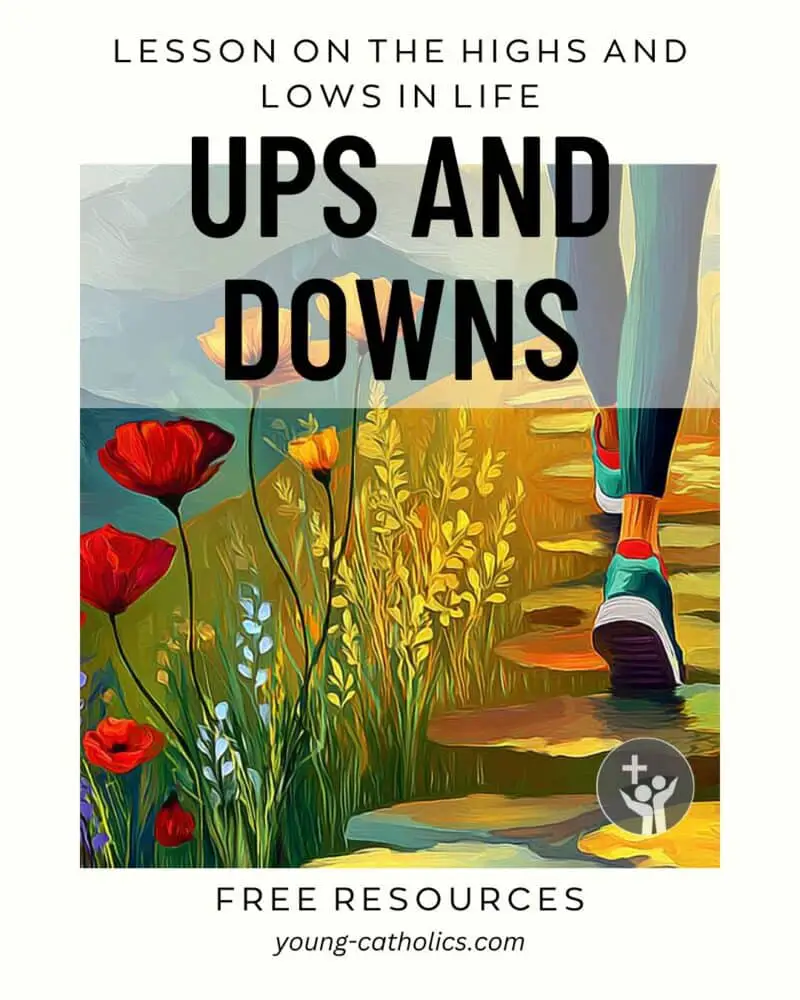
Ups and Downs (Transfiguration)
The Ups and Downs lesson plan helps youth reflect on the Transfiguration of Jesus (Mark 9:2-10) and connect it to their own lives. It shows how faith can grow through both joyful and hard moments. Like Peter, James, and John on the mountain, youth are invited to recognize God’s presence during high points and carry that strength into daily life.
This lesson teaches that spiritual “mountaintop” experiences can help us through life’s challenges. Through discussion, prayer, and personal reflection, youth learn how to hold on to God’s light even after coming down the mountain. It encourages them to grow in faith no matter where they are on their journey.

What Is Love? (Good Shepherd Sunday)
The What Is Love? lesson plan helps youth understand love from a Catholic view. Using John 10:11-18, where Jesus calls Himself the Good Shepherd, it teaches that real love means sacrifice and putting others first. Jesus’ love is not just words or feelings—He lays down His life for us. This shows the kind of love we are called to give.
The lesson guides youth to think about what they love and what they would sacrifice for. It shows that love is shown in daily choices, like helping others or giving up something for someone else. It helps them see how Jesus’ love can inspire their actions.
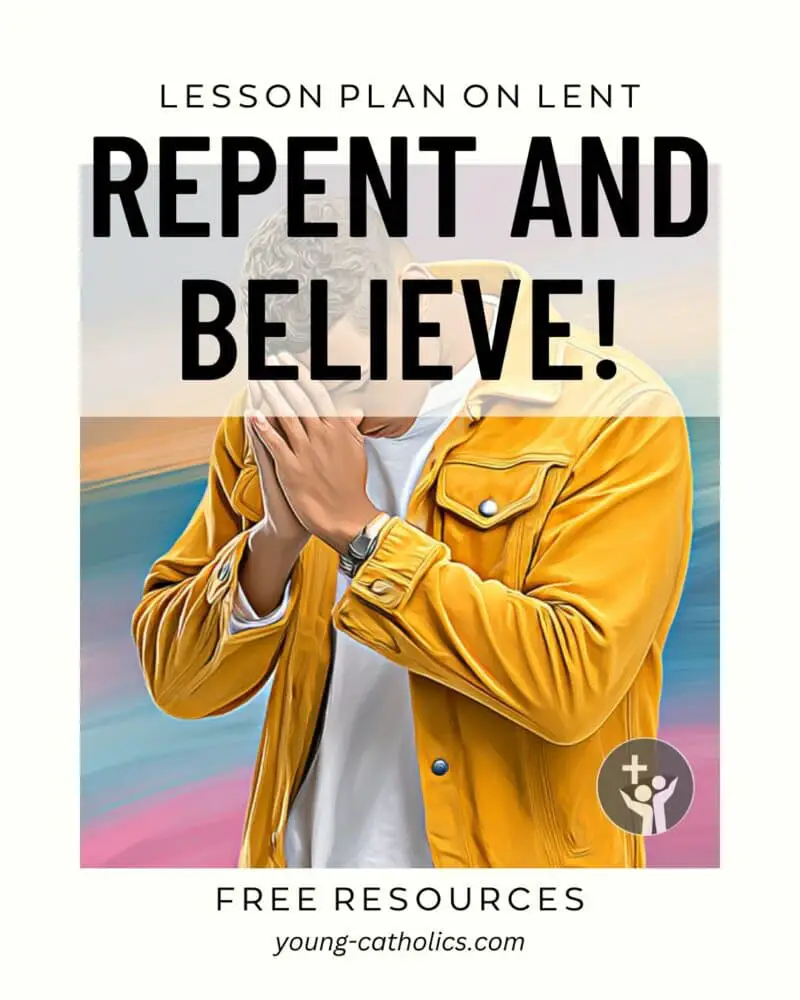
Repent and Believe! (Lent)
This “Repent and Believe” lesson plan helps youth reflect on their need for spiritual change during Lent. Using Mark 1:12-15, it focuses on Jesus’ call to turn away from sin and believe in the Gospel. Teens learn that repentance is more than guilt—it means choosing a new way of life rooted in God’s love.
Through games, discussion, and small group reflection, youth explore how knowing they are God’s beloved children can free them from fear and help them grow in faith. The lesson encourages deeper Lenten commitments and shows how belief in the Gospel can guide their actions and relationships.

Remembering the Faithful Departed (All Souls Day)
The Remembering the Faithful Departed lesson plan teaches youth about praying for those who have died. It helps them understand that death does not end love or our connection with others. The lesson focuses on All Souls Day and how we can support the souls in purgatory with our prayers. Youth learn that praying for the dead is a spiritual work of mercy.
This lesson also connects with John 6:37-40, where Jesus promises eternal life to those who believe in Him. Youth are reminded that God is full of mercy and that heaven is our true home. The lesson includes Scripture, discussion, prayer, and a personal challenge to pray for someone who has died.

Choosing Voices (Good Friday or Christ the King)
This lesson helps youth explore the story of the Good Thief and the choices we all face. One thief mocks Jesus. The other turns to Him with trust. Youth reflect on which voice they listen to—one that pulls them away from God or one that leads them closer.
This lesson helps teens think about faith, repentance, and God’s mercy. It shows them that Jesus is always ready to welcome those who turn to Him. Through Scripture, prayer, and discussion, youth are encouraged to trust God even in hard times.
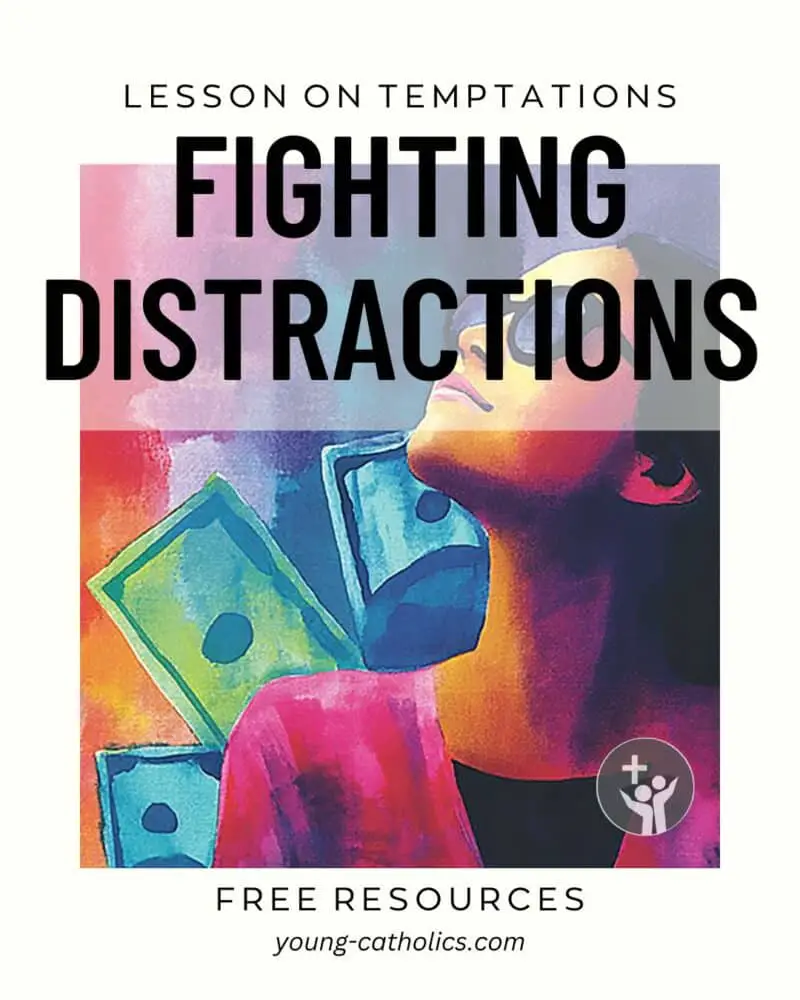
Fighting Distractions (Lent and Temptations)
This lesson plan helps youth understand how temptation works in daily life. It is based on Matthew 4:1-11, where Jesus is tempted in the desert. The goal is to help young people recognize the things that pull them away from God.
Through games, discussion, and reflection, youth learn how to stay focused on what is good and true. The lesson shows that Jesus faced real struggles too and gives students simple tools to fight temptation in their own lives.
Holy People
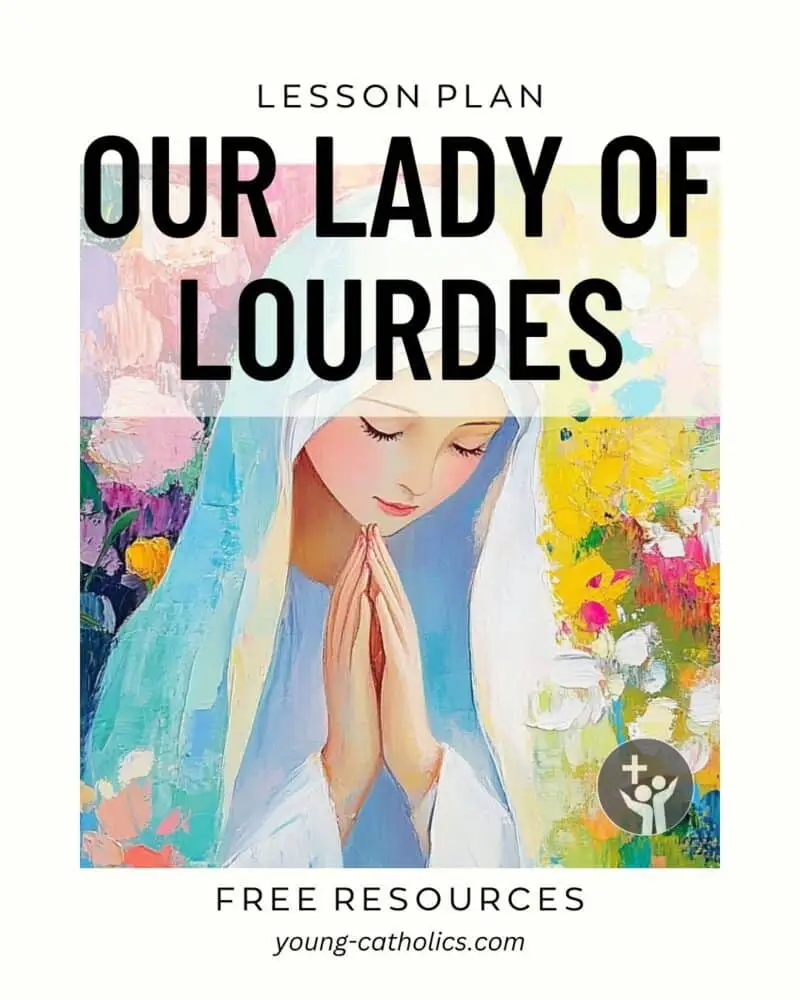
Our Lady of Lourdes
The Our Lady of Lourdes lesson plan helps youth learn from Mary’s messages to St. Bernadette. These messages focus on prayer, humility, and trusting God. The lesson teaches that God speaks in simple ways and wants a personal relationship with each of us. It shows how Mary treated Bernadette with love and kindness and calls us to do the same.
Students reflect on the importance of praying for others and doing small sacrifices. They learn that their prayers can help the world and that God sees each person with love. The lesson also explores Mary’s title as the Immaculate Conception and what it means to live a holy life. Through games, reflection, and prayer, students are invited to grow in faith and become closer to Jesus.
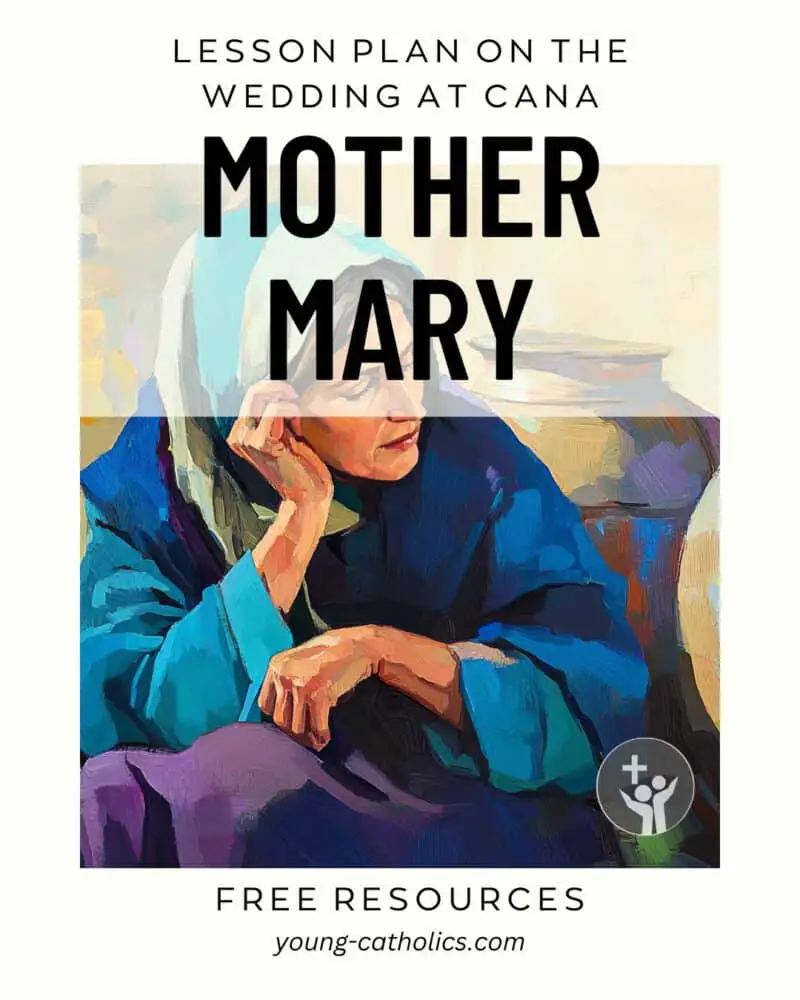
Mother Mary (The Wedding at Cana)
The Mother Mary lesson plan helps youth understand Mary’s role as Jesus’ mother and our spiritual mother. It focuses on the story of the Wedding at Cana (John 2:1-11), where Mary intercedes with Jesus and tells the servants, “Do whatever he tells you.” Youth learn how Mary notices the needs of others and leads us to trust Jesus.
This lesson teaches that Mary still cares for us and brings our prayers to Jesus. It helps youth see her as a loving and faithful example. By reflecting on her trust, humility, and guidance, youth are encouraged to grow in their own faith. They are invited to ask for her intercession and follow her example of doing what Jesus asks.
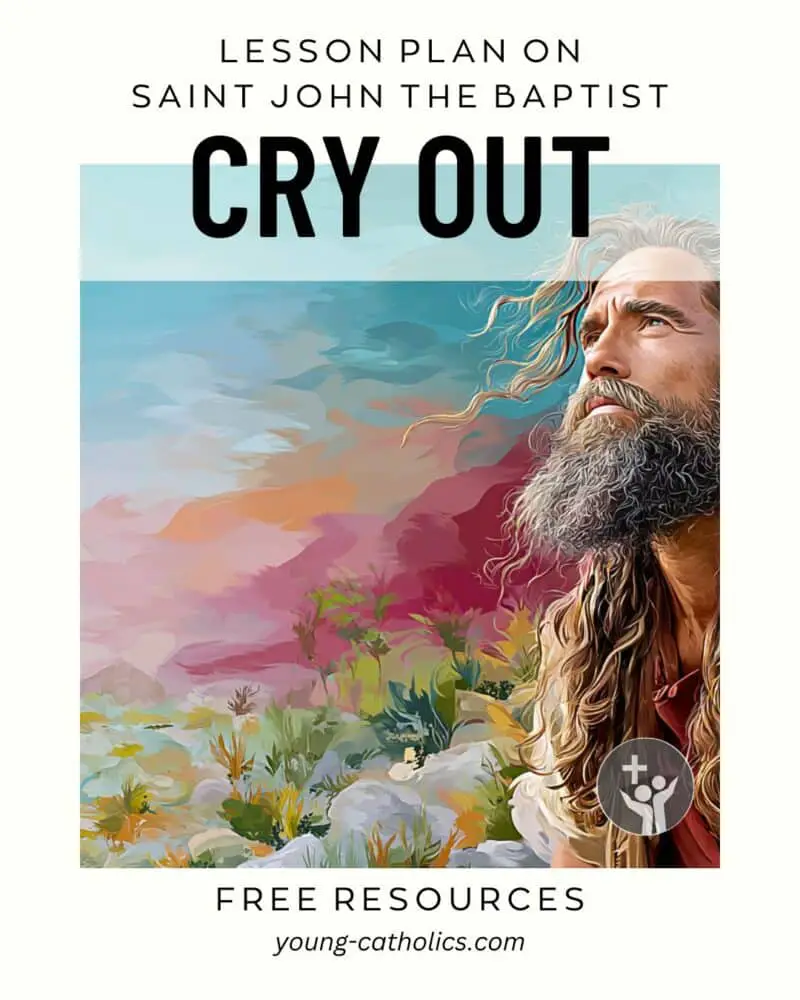
Cry Out (St. John the Baptist)
The Cry Out lesson plan helps youth learn about St. John the Baptist and his mission to prepare the way for Jesus. Using Luke 3:1-6, it shows how John boldly shared God’s message, calling people to repentance. He was chosen by God to help others get ready for the Savior. His courage and faithfulness can inspire youth to speak about their own faith.
The lesson encourages teens to be bold like John, even when it’s hard. It teaches that God has a mission for everyone, and we can all point others to Jesus through our words and actions. By looking at John’s example, youth are reminded that their faith matters and that God can use them in big and small ways.
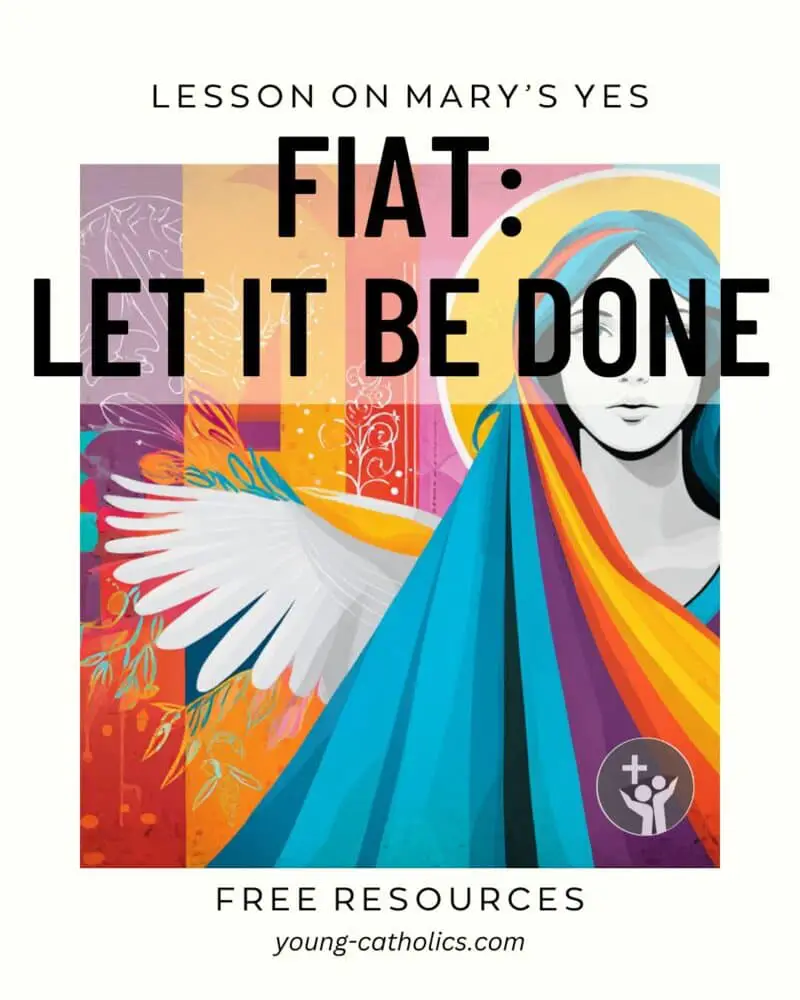
Fiat – A Lesson Plan on Mary’s Let It Be Done
The Fiat Lesson Plan helps youth learn how to say “yes” to God, like Mary did in Luke 1:26-38. It focuses on the Annunciation, when the angel Gabriel told Mary she would be the mother of Jesus. Even though she was afraid and had questions, Mary trusted God and said, “Let it be done.” This lesson teaches that we can also respond with faith, even when God’s plan is hard to understand.
The lesson helps youth think about their own choices and how to listen for God’s voice. It shows that it’s okay to ask questions, just like Mary did. With prayer and trust, we can say yes to God in big and small ways. Mary’s courage reminds us that faith means trusting even when we feel uncertain.

Why Do Catholics Pray with Mary and the Saints?
This lesson plan on reverence vs worship helps young people understand an important Catholic practice. Many are confused about why Catholics pray with Mary and the saints, and this lesson explains that we do not worship them. Instead, we ask for their prayers, just as we ask friends and family to pray for us.
This lesson uses scripture, discussion, and activities to make the topic clear and engaging. It helps youth grow in their faith and confidently explain Catholic teaching. Key Bible passages, such as James 5:16 and Revelation 8:3-4, show the power of prayer and the role of the saints. By the end of the lesson, students will see that praying to Mary and the saints brings us closer to Jesus.
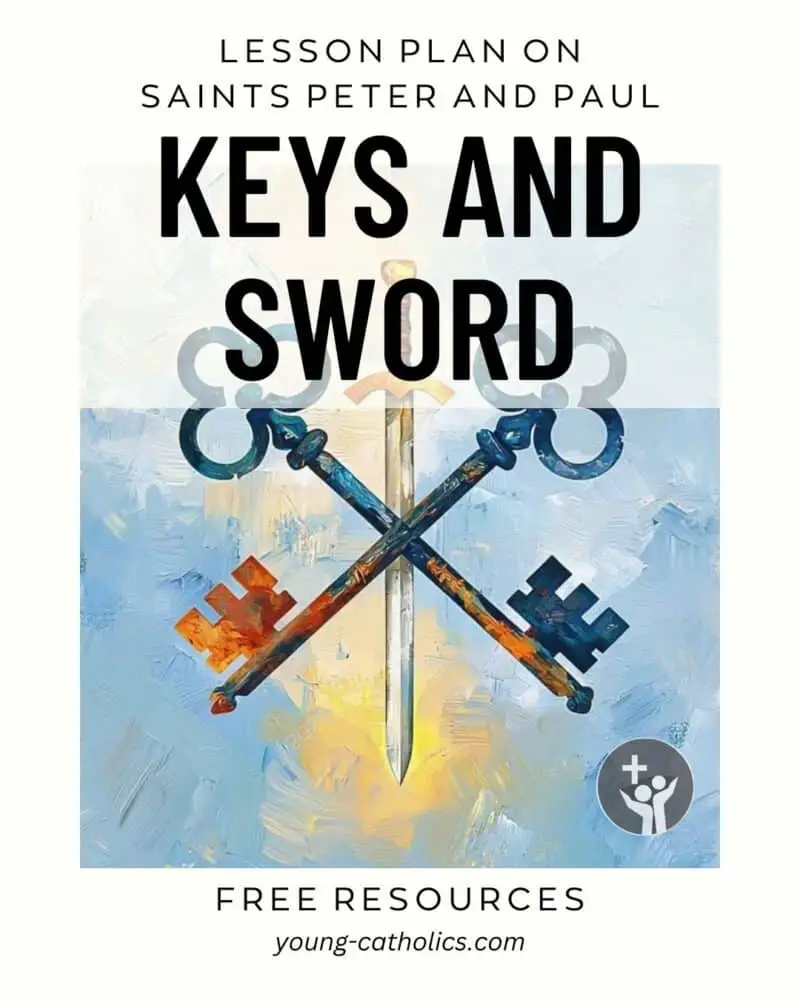
Keys and Sword (Saints Peter and Paul)
The Keys and Sword lesson plan teaches youth about St. Peter and St. Paul and how God used them to build the early Church. St. Peter, given the keys to the kingdom in Matthew 16:18-19, shows how God can use even imperfect people to lead. St. Paul, once a persecutor of Christians, became a bold preacher of the Gospel after meeting Jesus (Acts 9:4). His sword represents courage and mission.
This lesson helps youth see that their gifts and struggles can be part of God’s plan. Peter and Paul were very different, but both were faithful. Youth are encouraged to be brave in their faith, to trust God, and to take small steps to share His love with others. Through reflection, prayer, and discussion, they learn that God calls everyone to be part of His mission, no matter where they start.
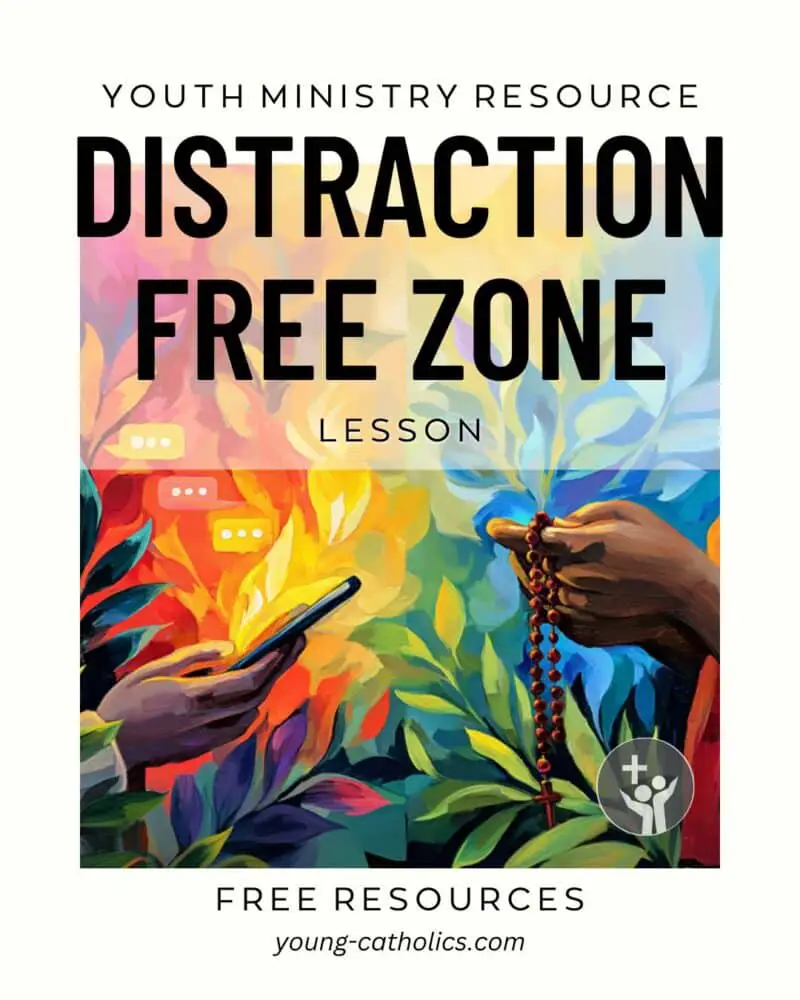
Distraction Free Zone (Saints Martha and Mary)
The Martha and Mary lesson plan focuses on helping youth understand how distractions can pull them away from their faith. Based on the story in Luke 10:38-42, it teaches the importance of choosing time with Jesus over busyness. Participants will reflect on their own distractions and explore ways to balance work, prayer, and daily responsibilities.
This lesson is perfect for youth groups, helping teens strengthen their relationship with God and find peace in their busy lives. It encourages them to focus on what truly matters and develop habits that prioritize their faith in a meaningful and practical way.
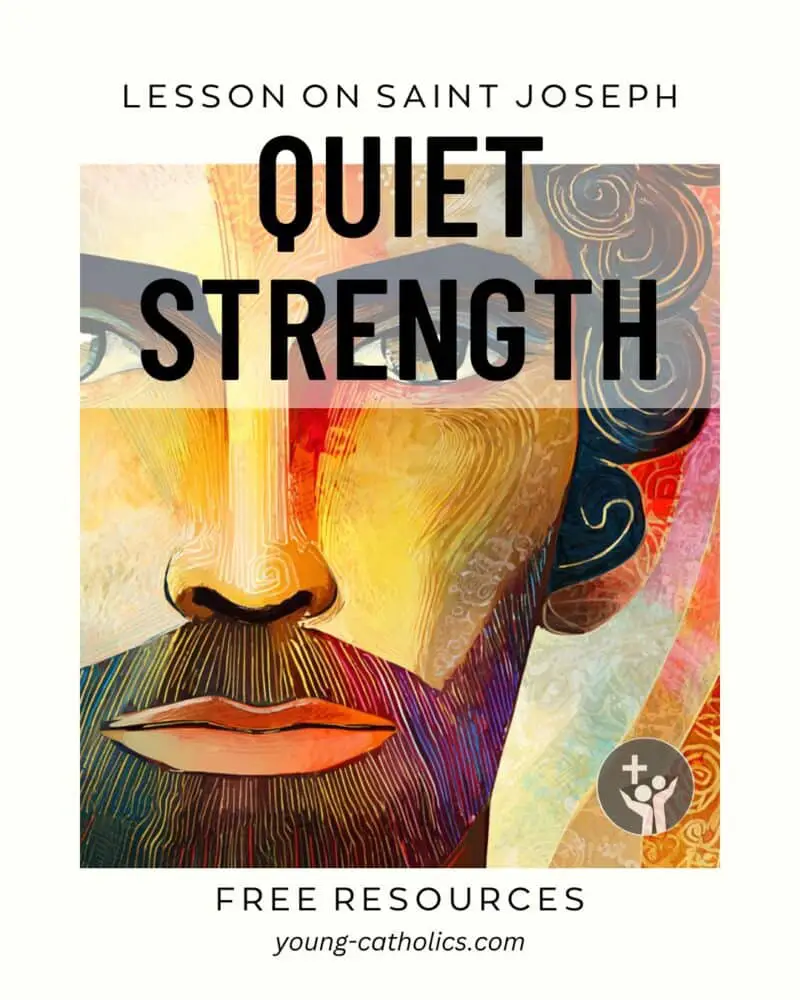
Quiet Strength (Saint Joseph)
This lesson plan helps youth understand what it means to live with faith, courage, and quiet strength. It focuses on Matthew 1:18-24, where Joseph chooses to trust God and protect Mary and Jesus. He shows how real strength can be silent, steady, and faithful.
This lesson encourages teens to think about how they can follow God, even when life is confusing. It helps them see that holiness is possible in everyday life. Saint Joseph’s example gives them a calm and steady role model to look up to. It teaches that obedience, kindness, and trust are true signs of strength.
Resources
Teaching the Faith with Joy

Encourage faith formation with this bright and inspiring catechesis-themed artwork. Available as a poster, card, canvas print, home décor, or digital download, it’s a wonderful reminder of the importance of Scripture and sharing the Good News.
Click on the image for more information on how to get the full sized artwork.
Paid subscribers may download a large copy this digital artwork without watermarks, suitable for use in bulletins, social media, newsletters, etc., free of charge by clicking here. You must be logged in as a paid subscriber to access the file.
Only current paid subscribers have the rights to use the artwork.
Frequently Asked Questions about the Free Youth Ministry Lesson Plans
What are these lesson plans for?
These lesson plans help youth grow in their Catholic faith. They are for youth groups, classrooms, or family faith time. Each plan is easy to follow and based on Scripture and Catholic teaching.
Who can use these lesson plans?
Anyone can use them. They are made for youth ministers, teachers, catechists, parents, and volunteers. You do not need special training to use them.
Do I need to use all the activities?
No. You can choose what works best for your group. Some lessons have games, prayers, or group discussions. Pick what fits your time and the needs of your youth.
Are these lesson plans free?
Yes. All the lesson plans are free to use. You may share them with others, but please give credit to Young-Catholics.com.
What age group are these for?
Most plans are for middle school and high school youth. Some can be adapted for younger children with simpler language.
How long does each lesson take?
Most lessons can be done in about 60 minutes. You can make them shorter or longer by adding or skipping activities.
Can I change the lessons?
Yes. You can adjust them to fit your group. You can shorten activities, change the questions, or add more discussion.
Do the lessons follow Catholic teaching?
Yes. All the lessons are based on Scripture and Catholic tradition. They are made to help youth understand and live their faith.
Growing Together in Faith
Youth ministry lesson plans are more than just activities. They help young people grow closer to Jesus in real and simple ways. These lessons guide youth to pray, think, and act in ways that build faith. Each plan connects to daily life, making it easier for young people to see how faith matters.
These plans also help leaders and parents. They give structure and ideas that are easy to use. You can adapt them to fit your group, whether large or small. Games, prayer, and questions make the sessions fun and meaningful.
Most of all, these lessons remind us that God is close. Whether we talk about kindness, prayer, or service, every lesson points to God’s love. Helping youth see this truth is one of the best gifts we can give them.
Your Turn
Have you used any of these lesson plans? What worked well for your group? What changes did you make to fit your youth?
Share your thoughts in the comments below. Your ideas may help other leaders or parents who are planning their own sessions. Every group is different, so your experience is valuable. Let’s learn from one another and encourage each other in helping young people grow in faith.

Leave a Reply